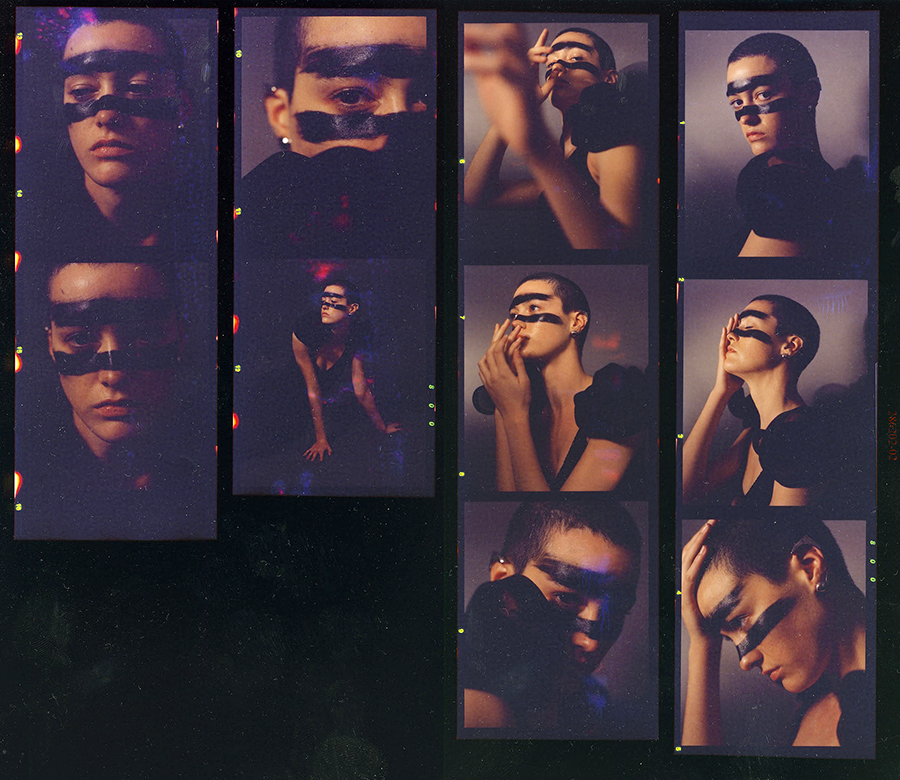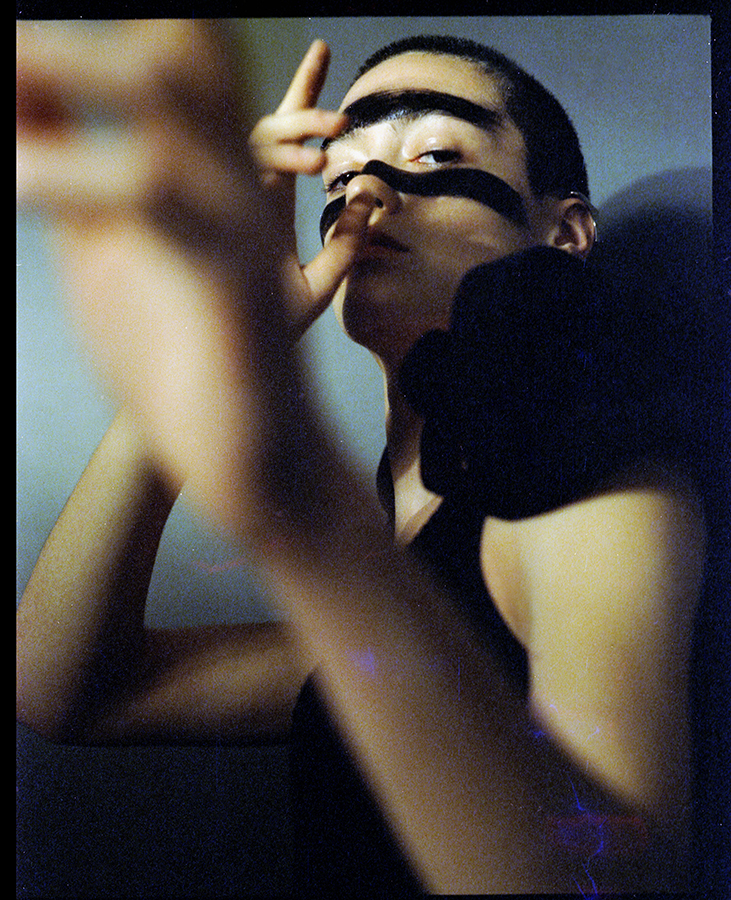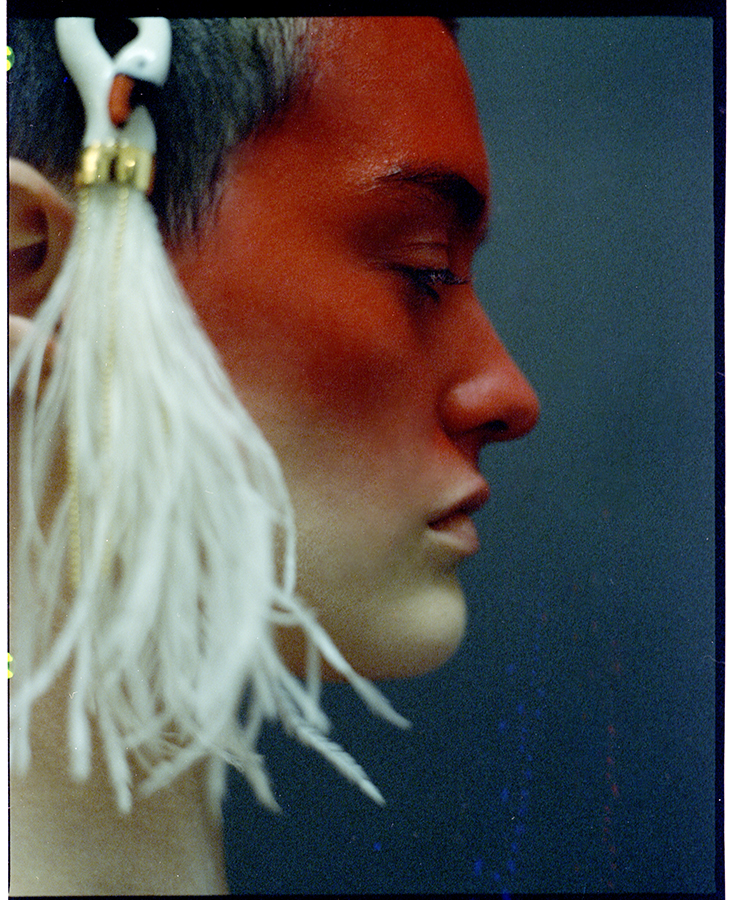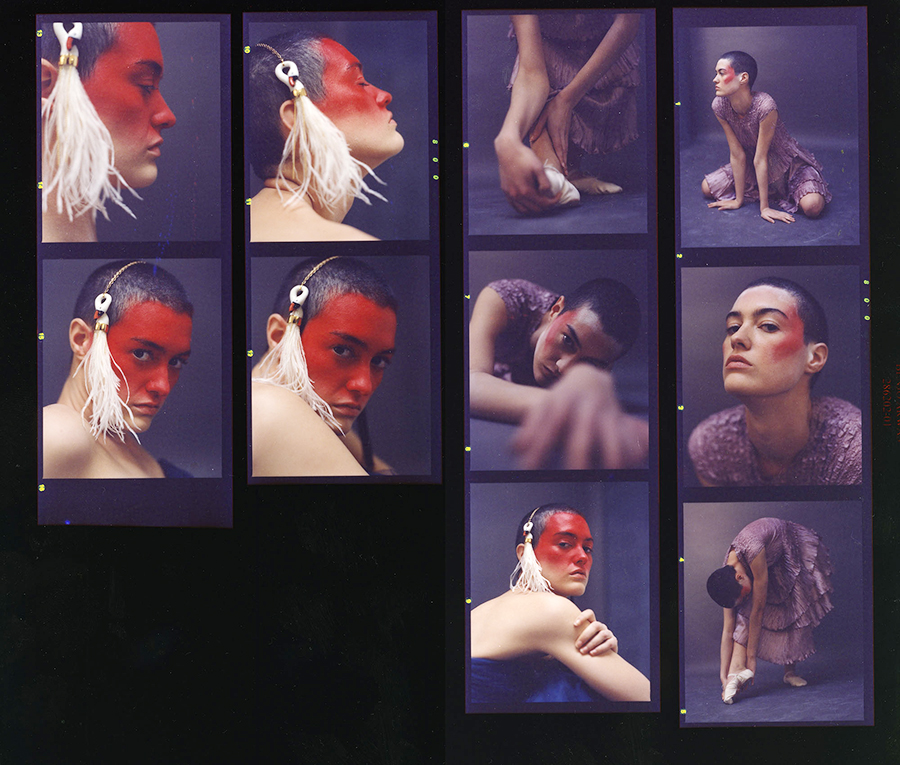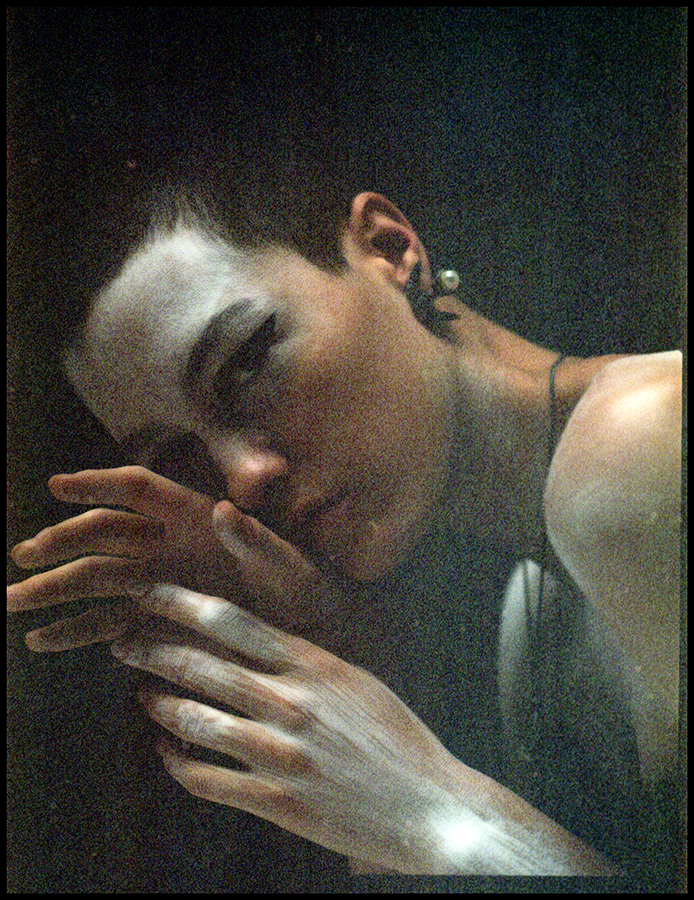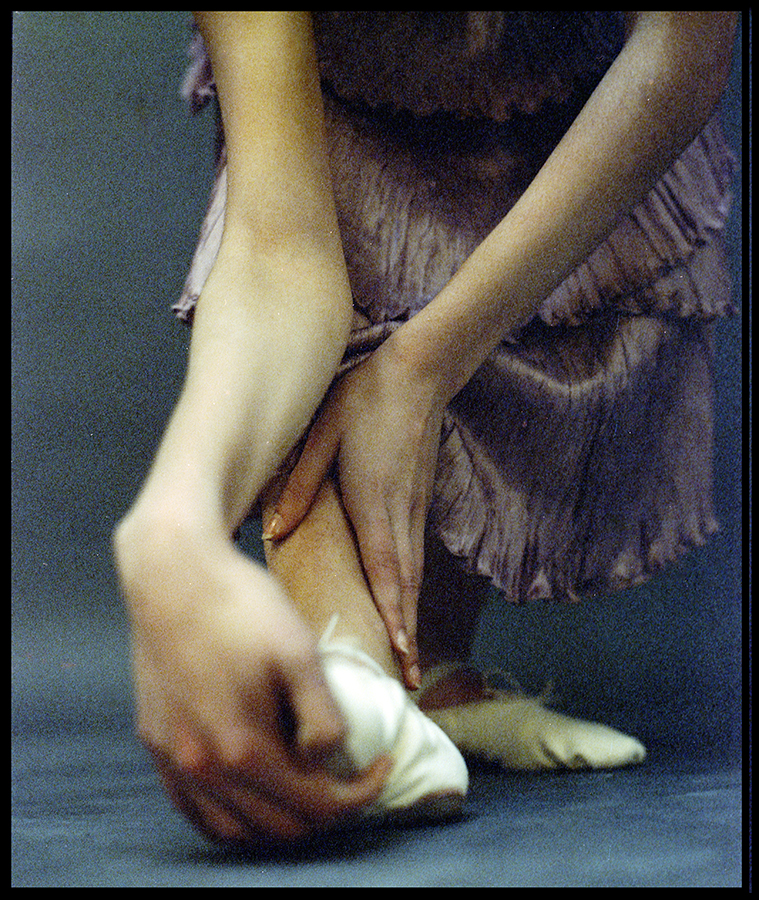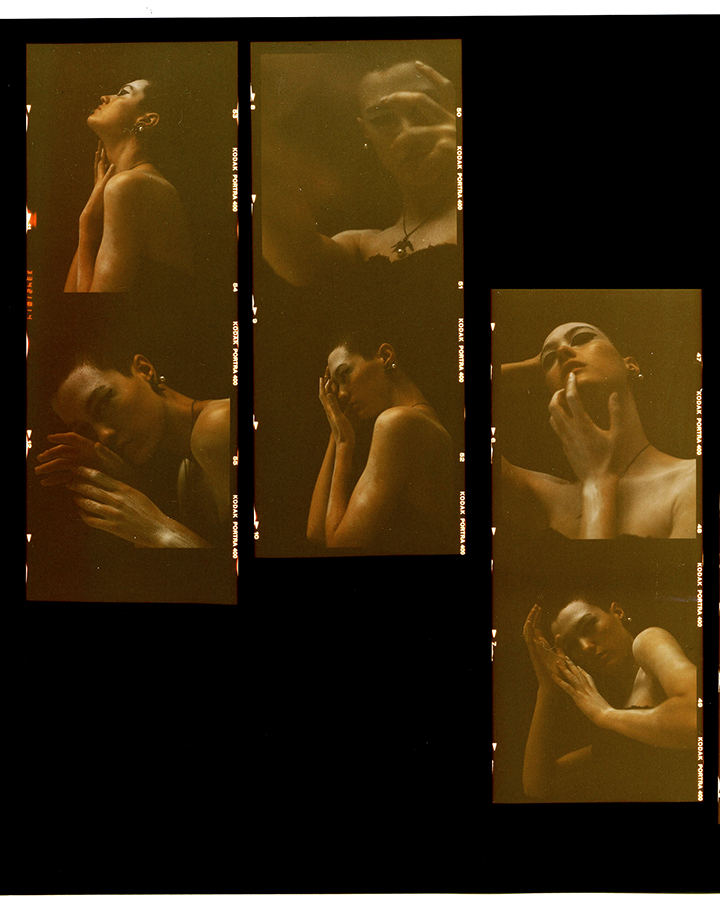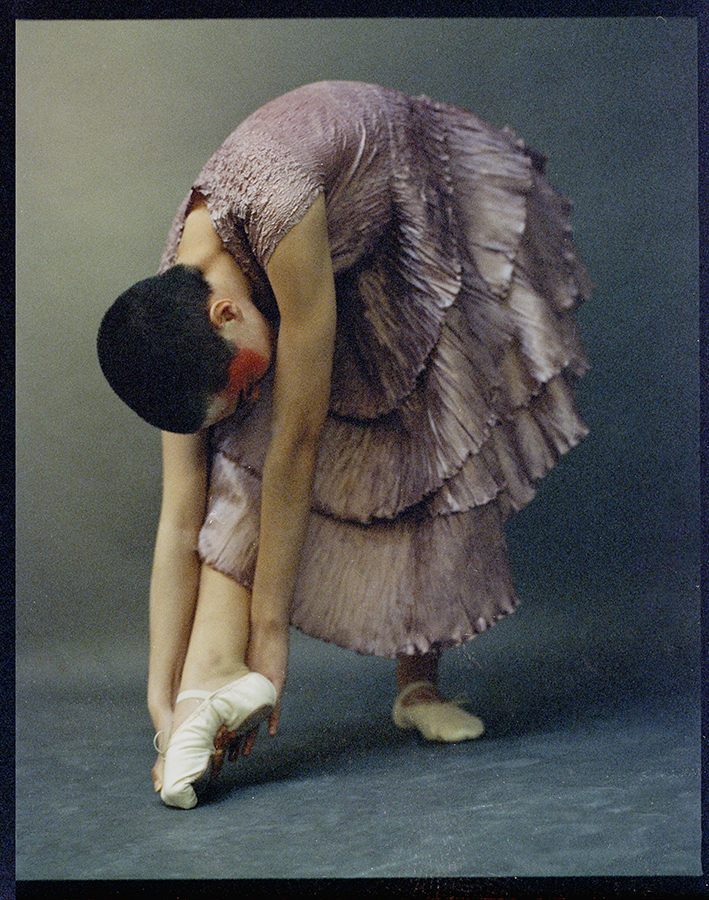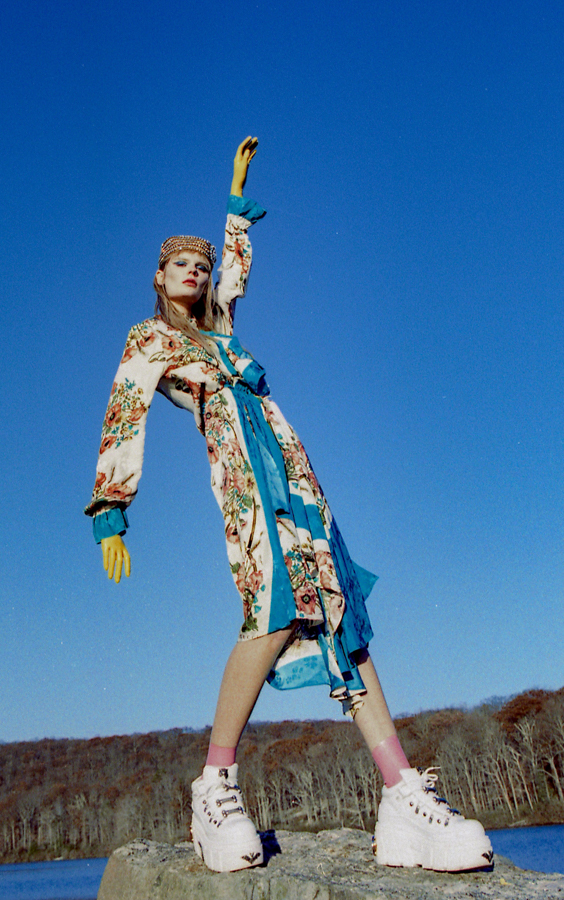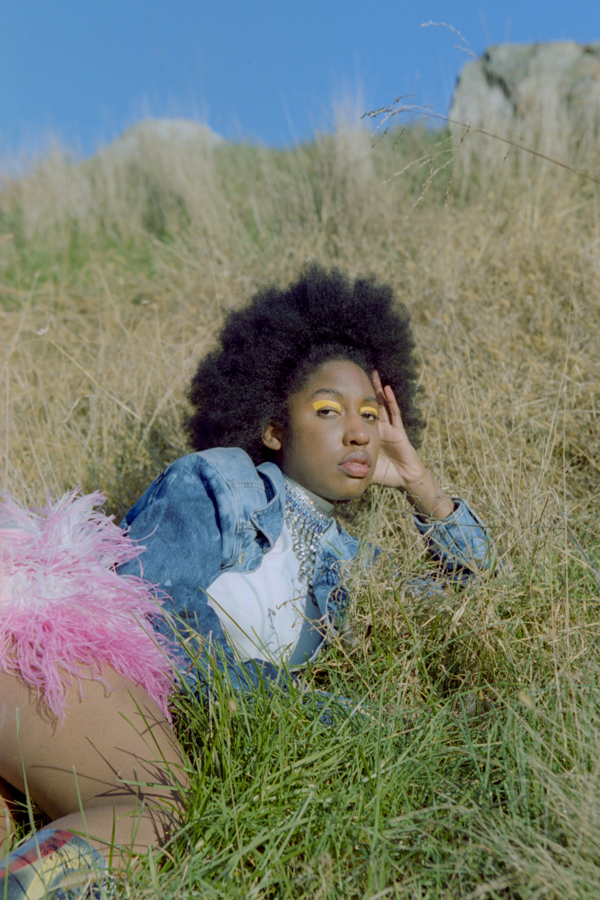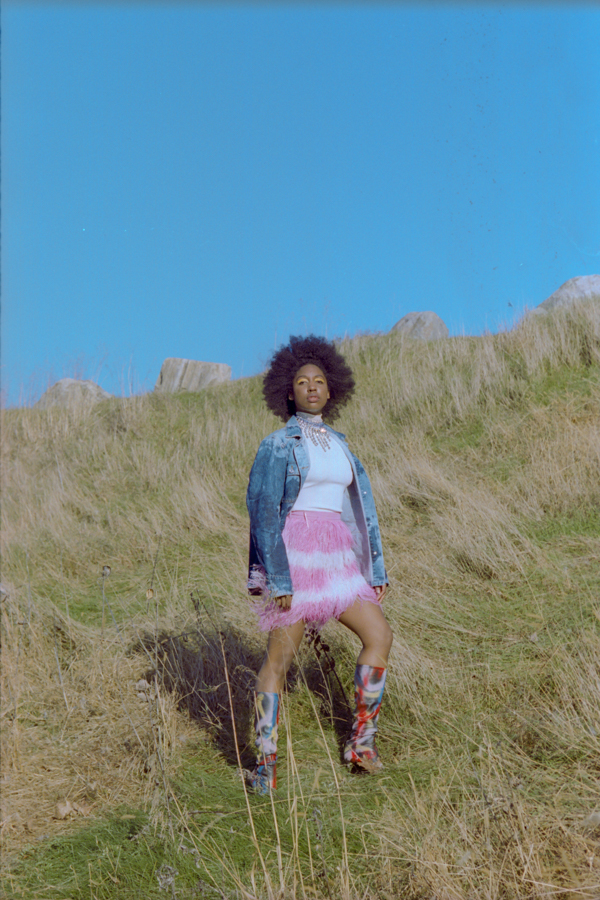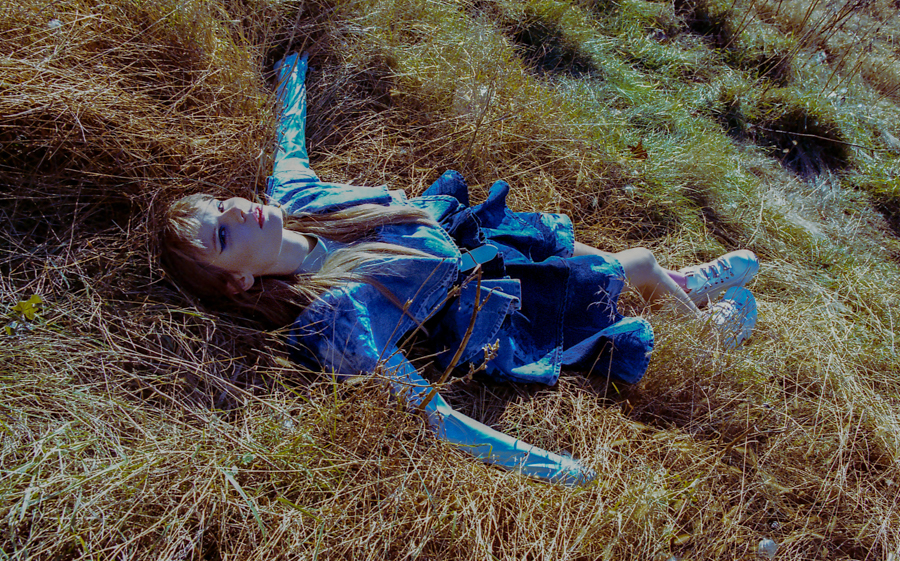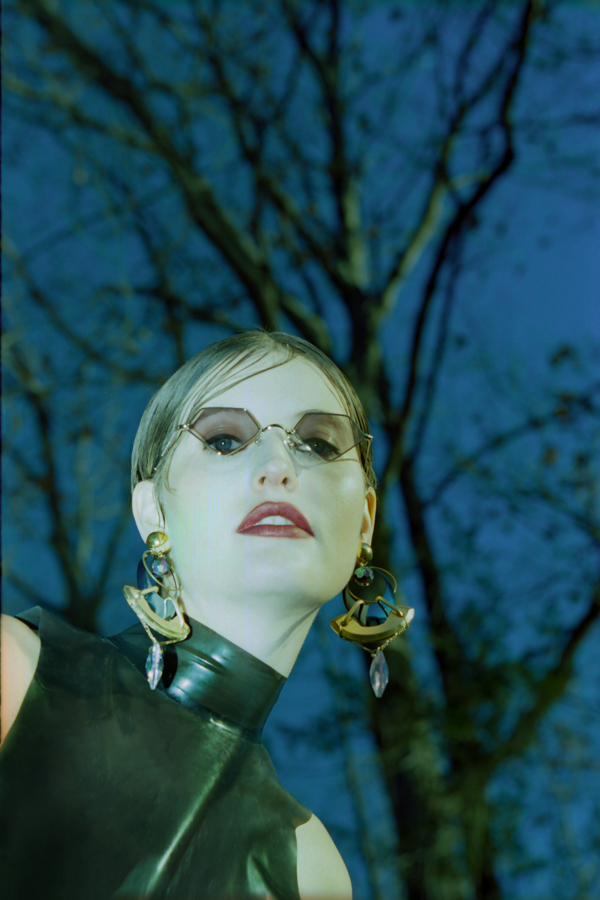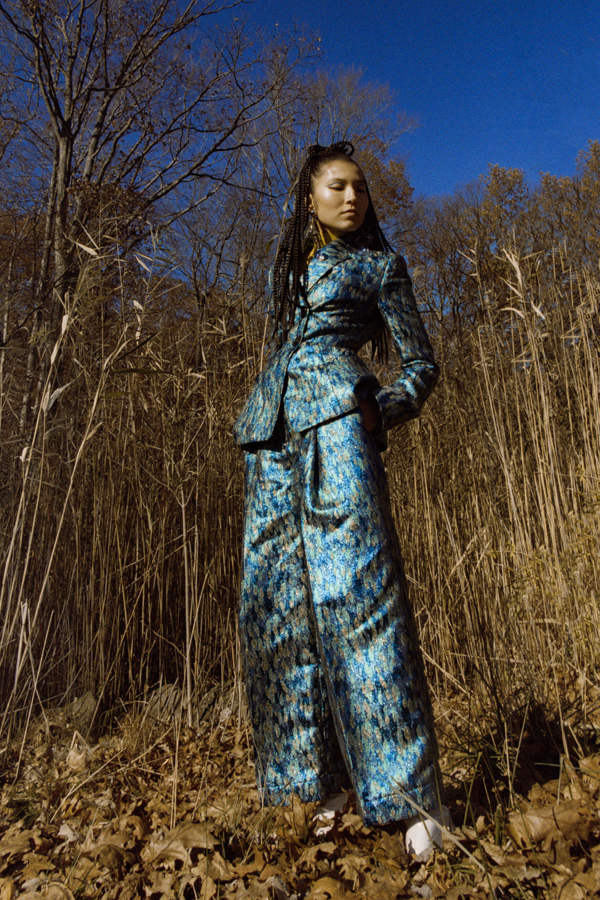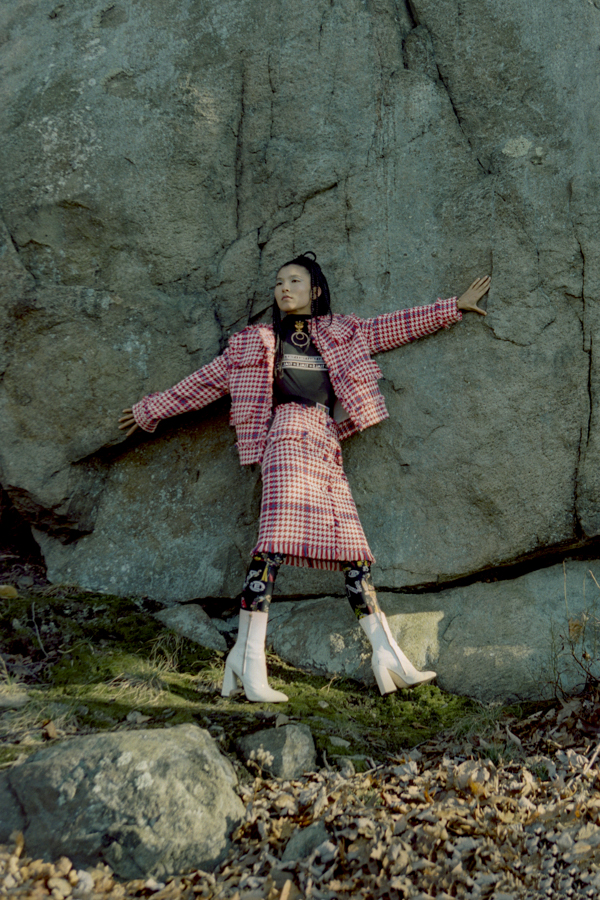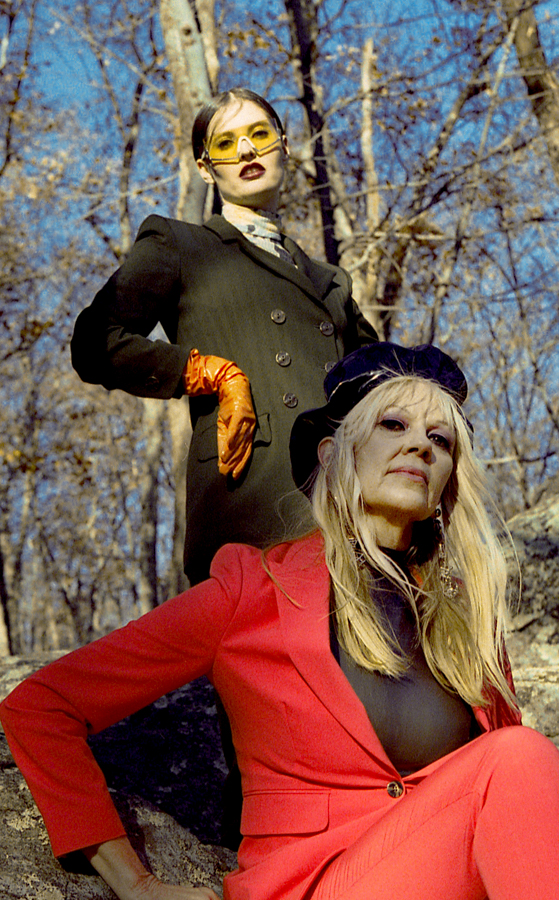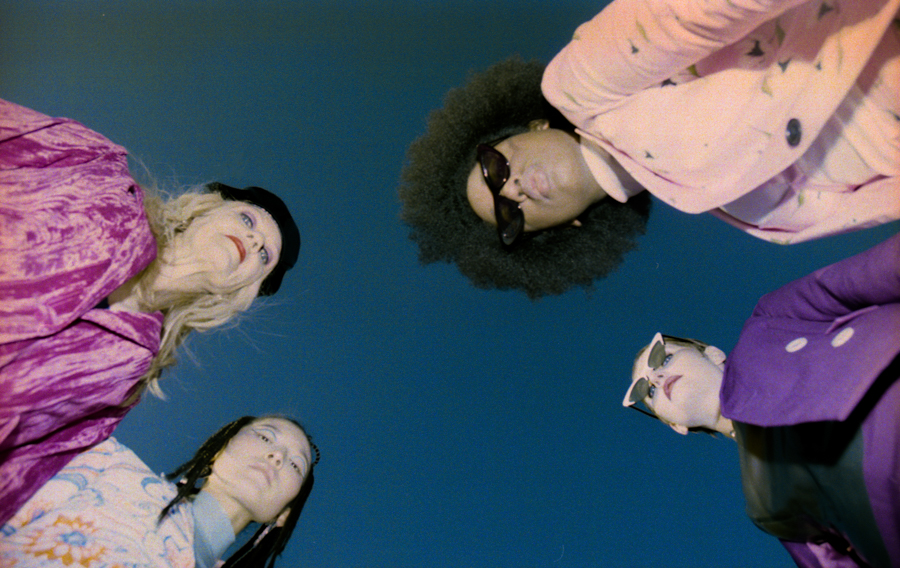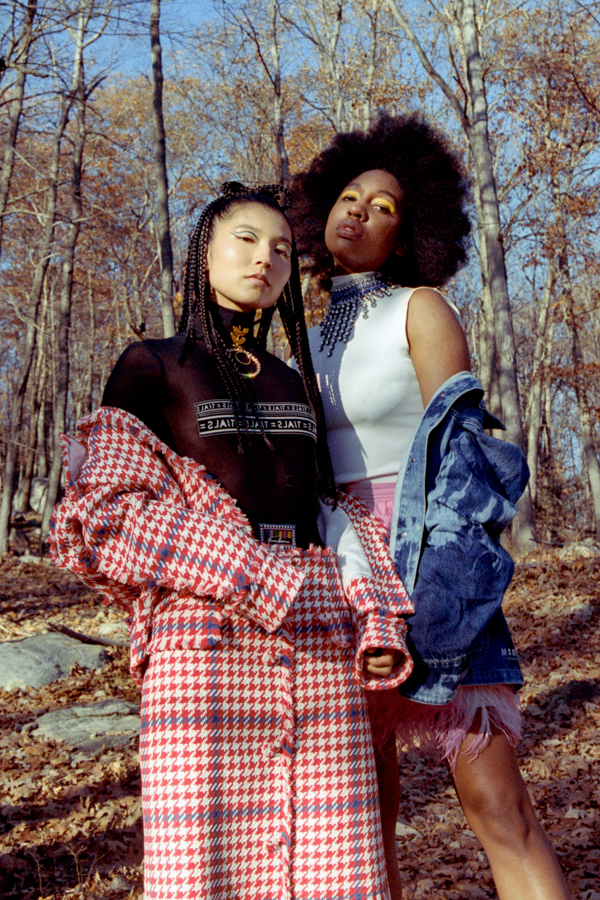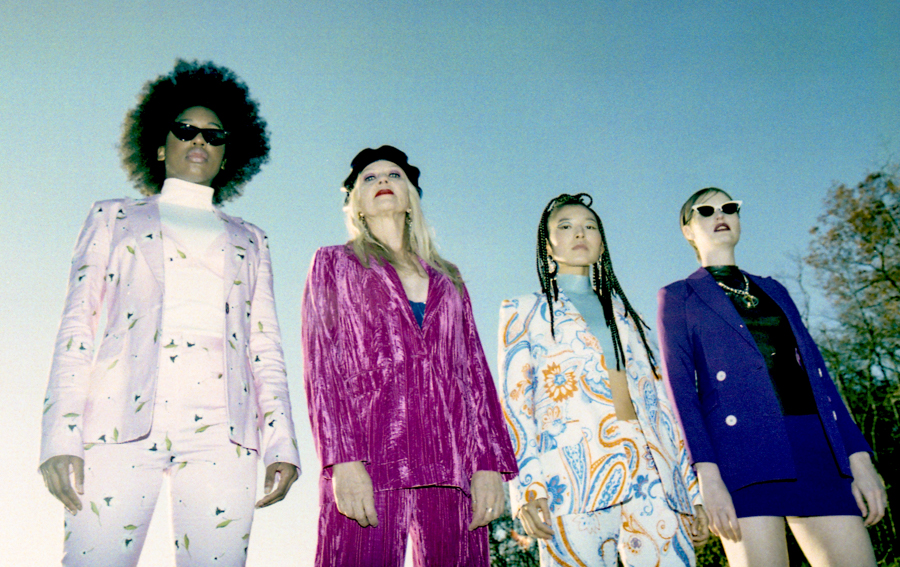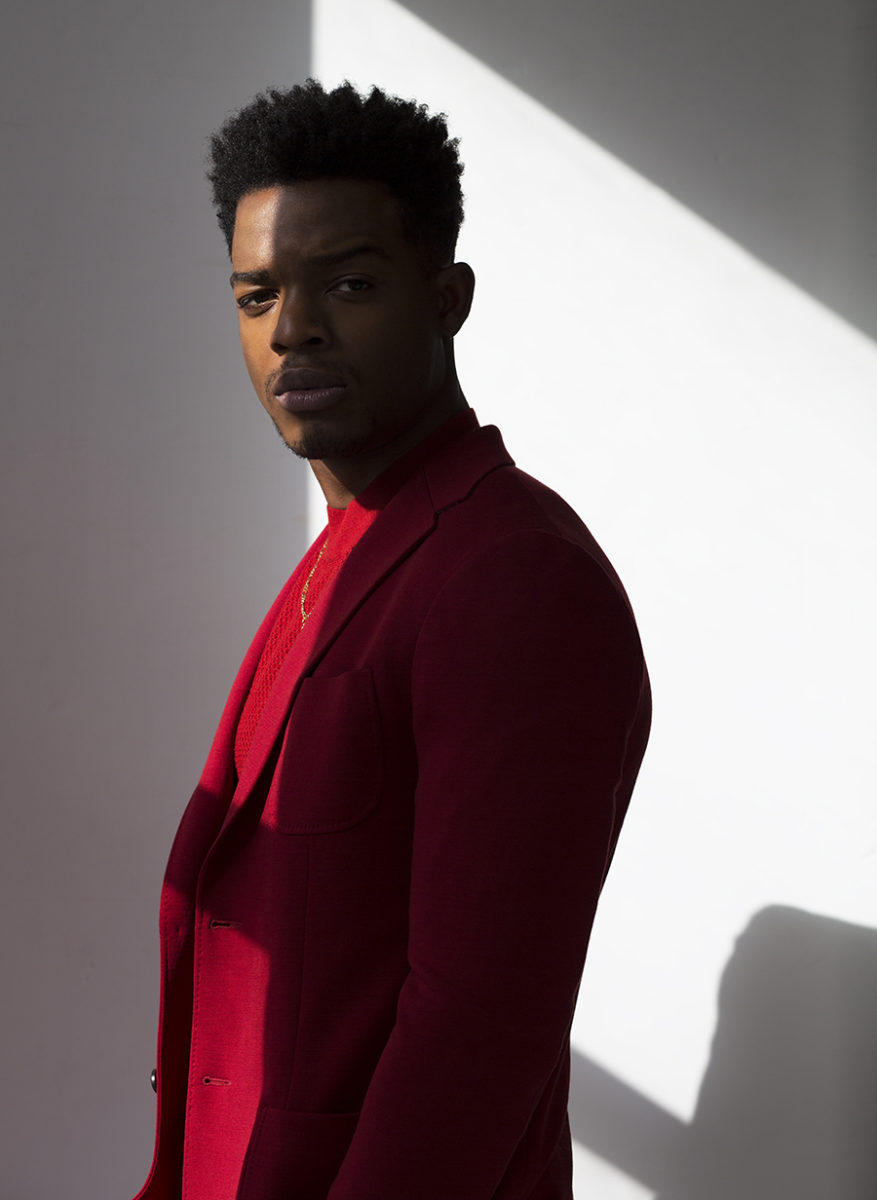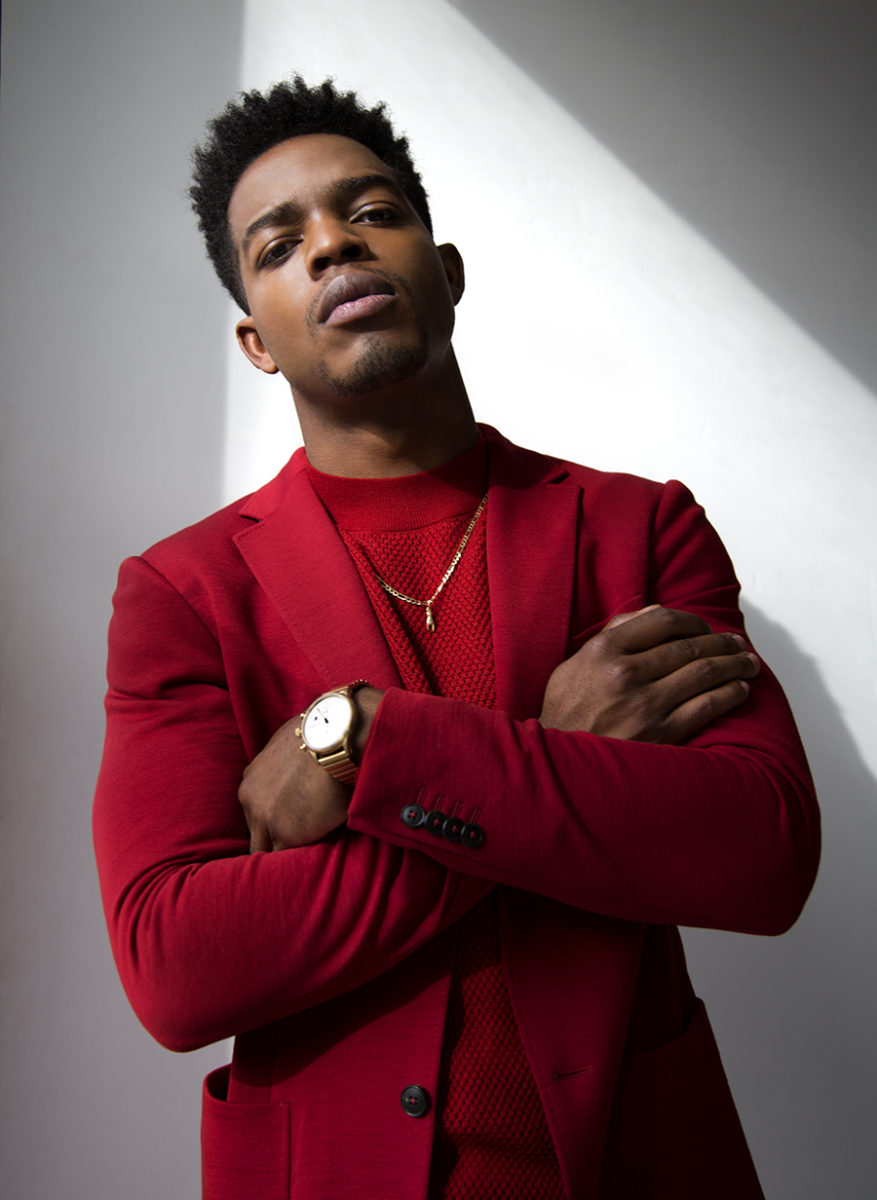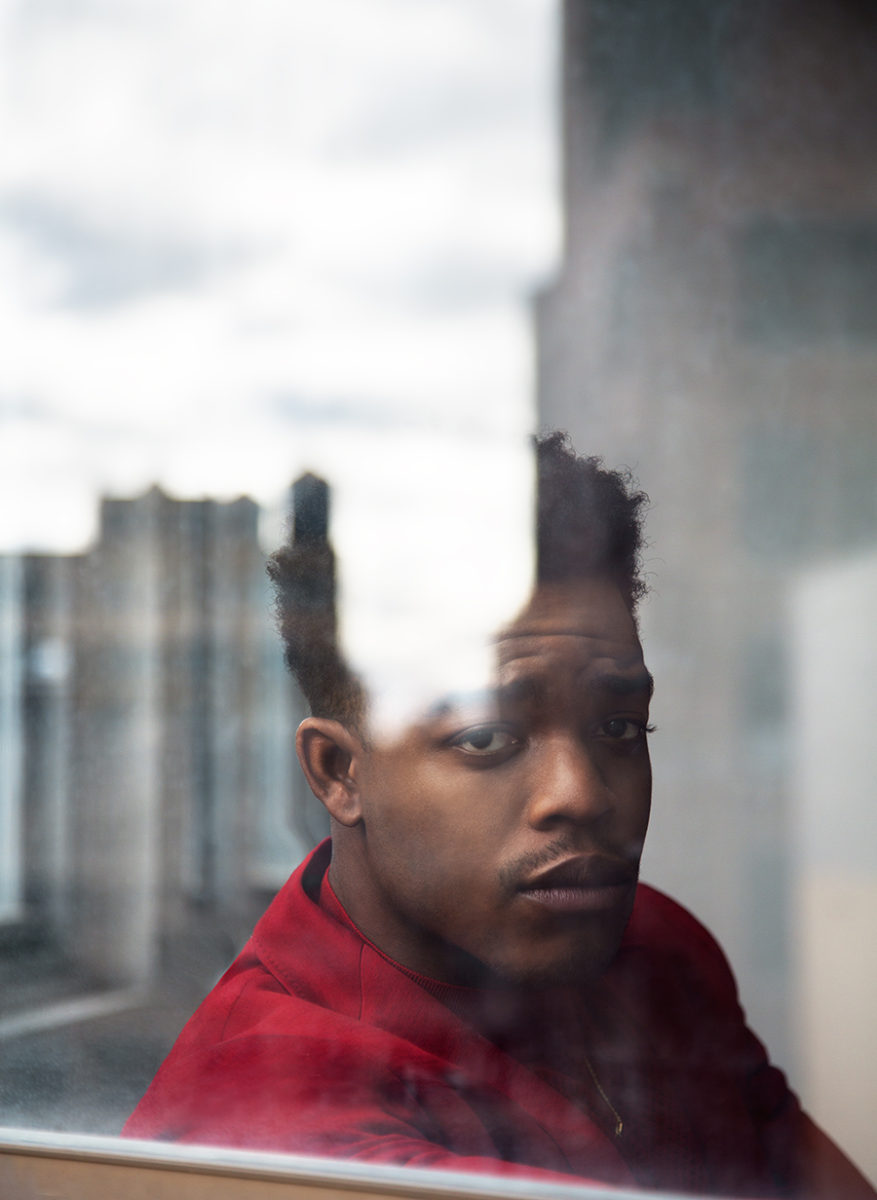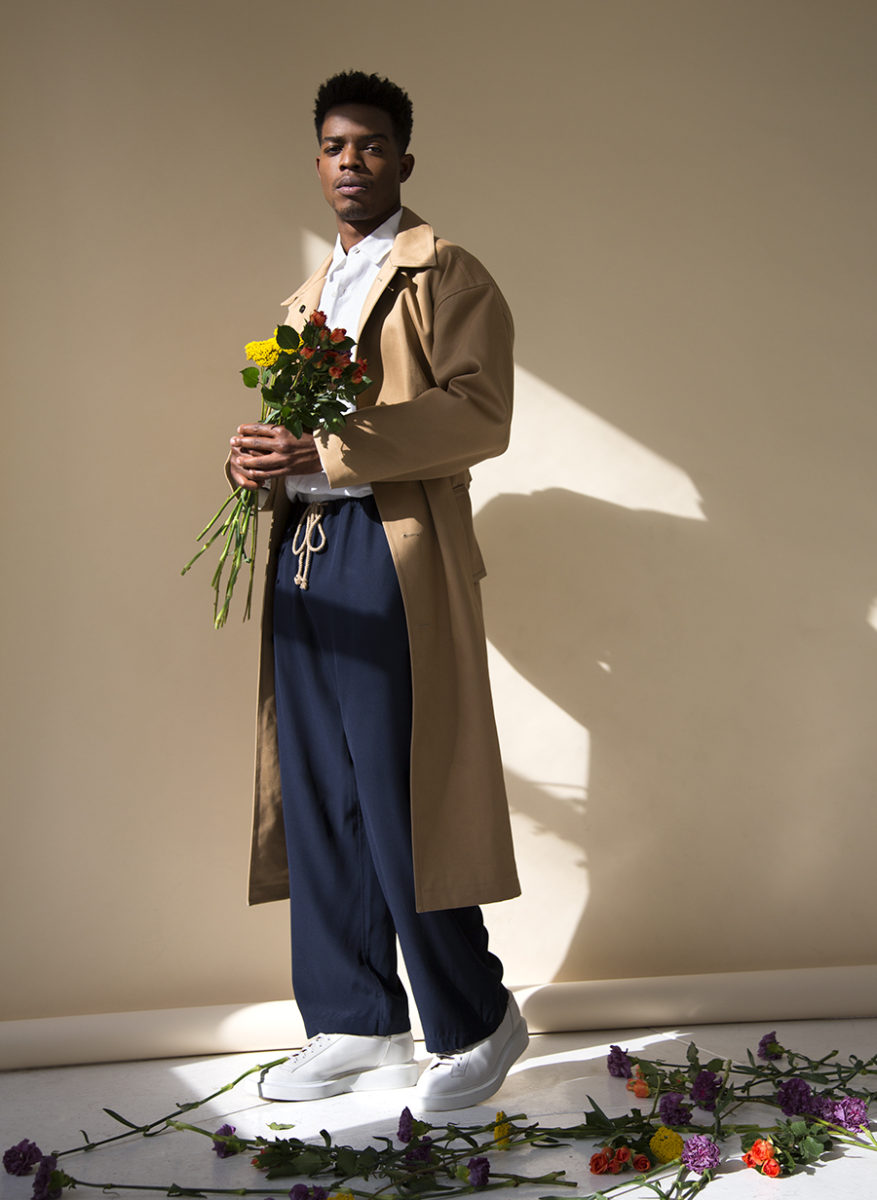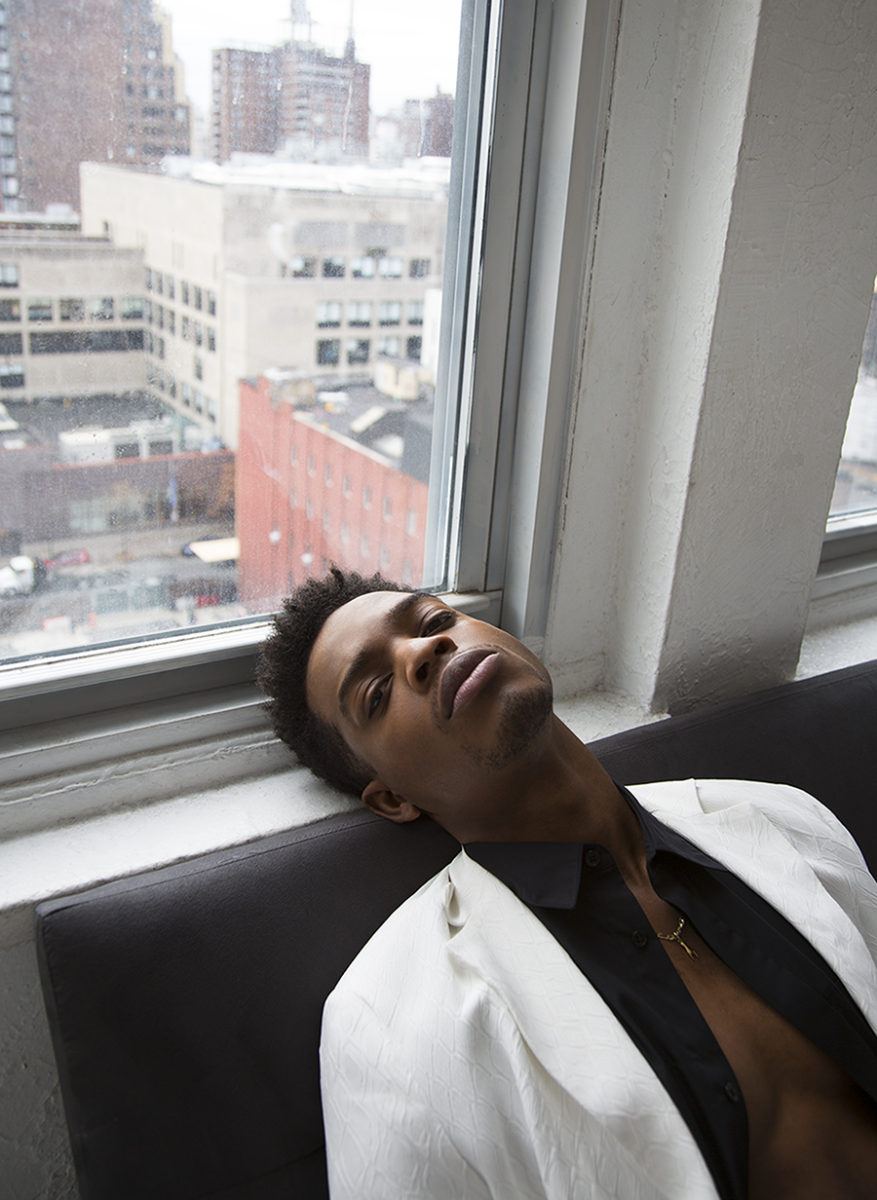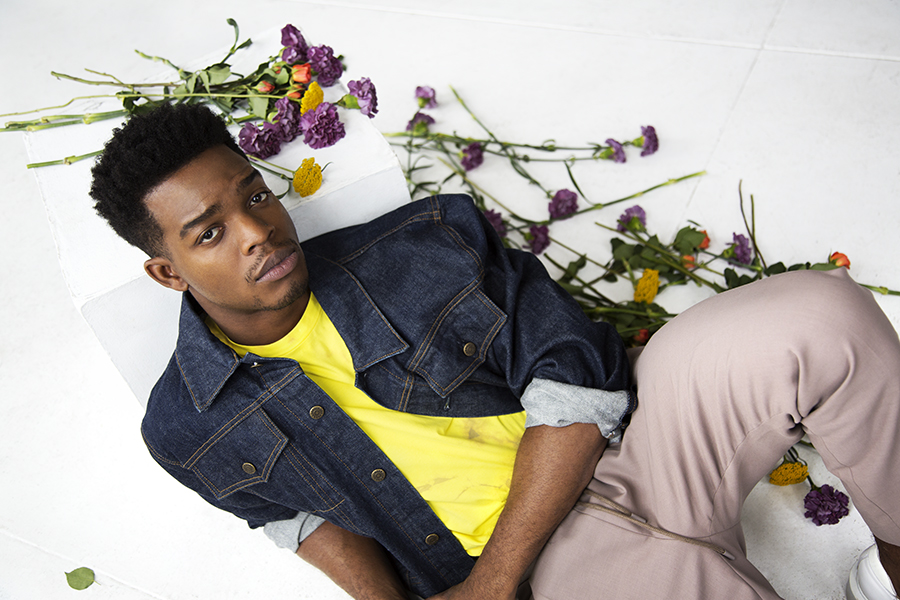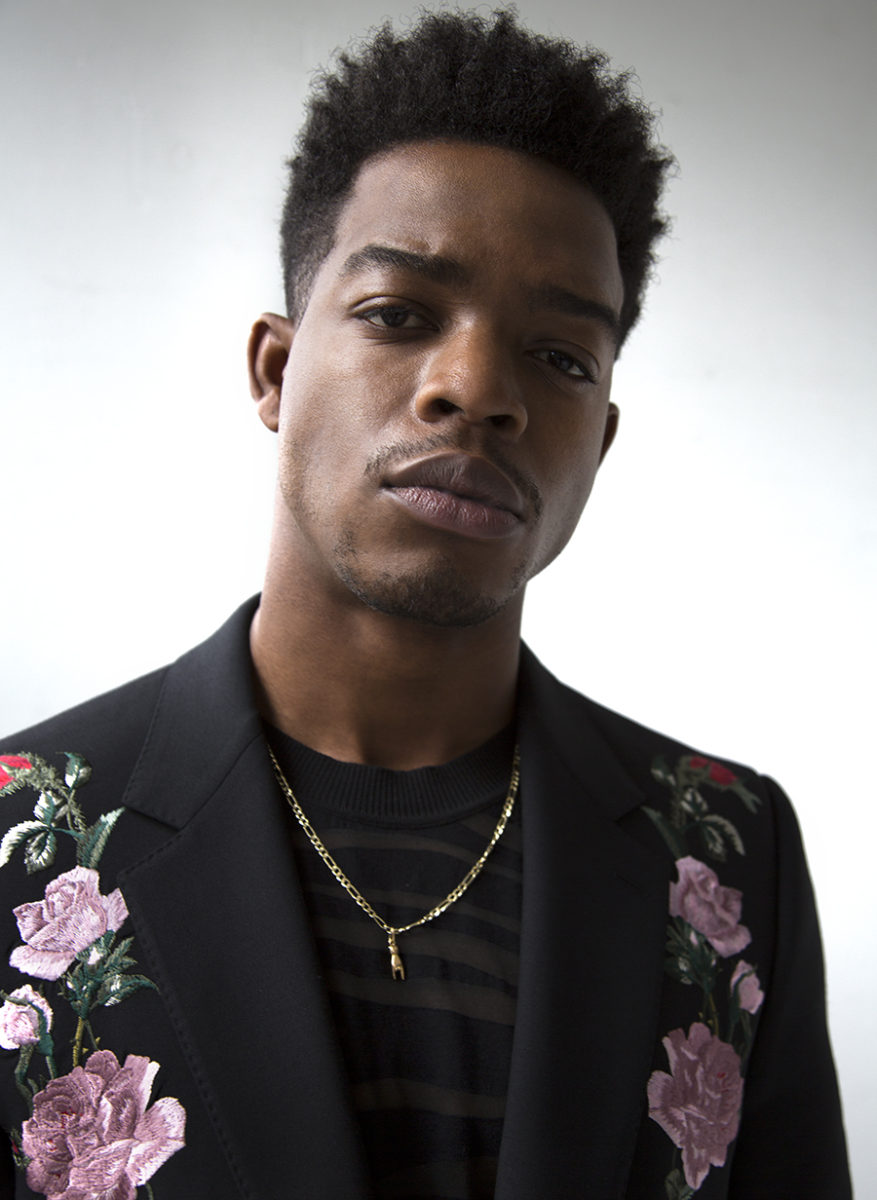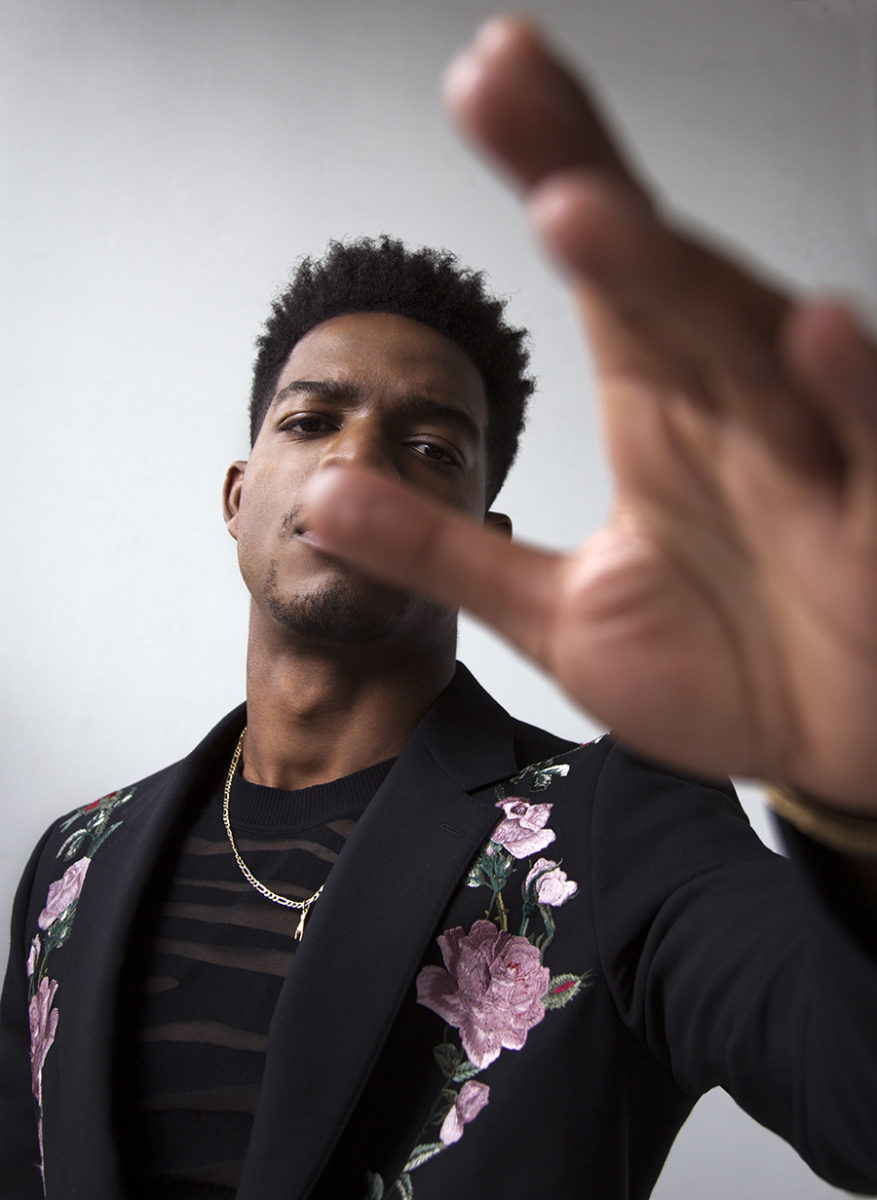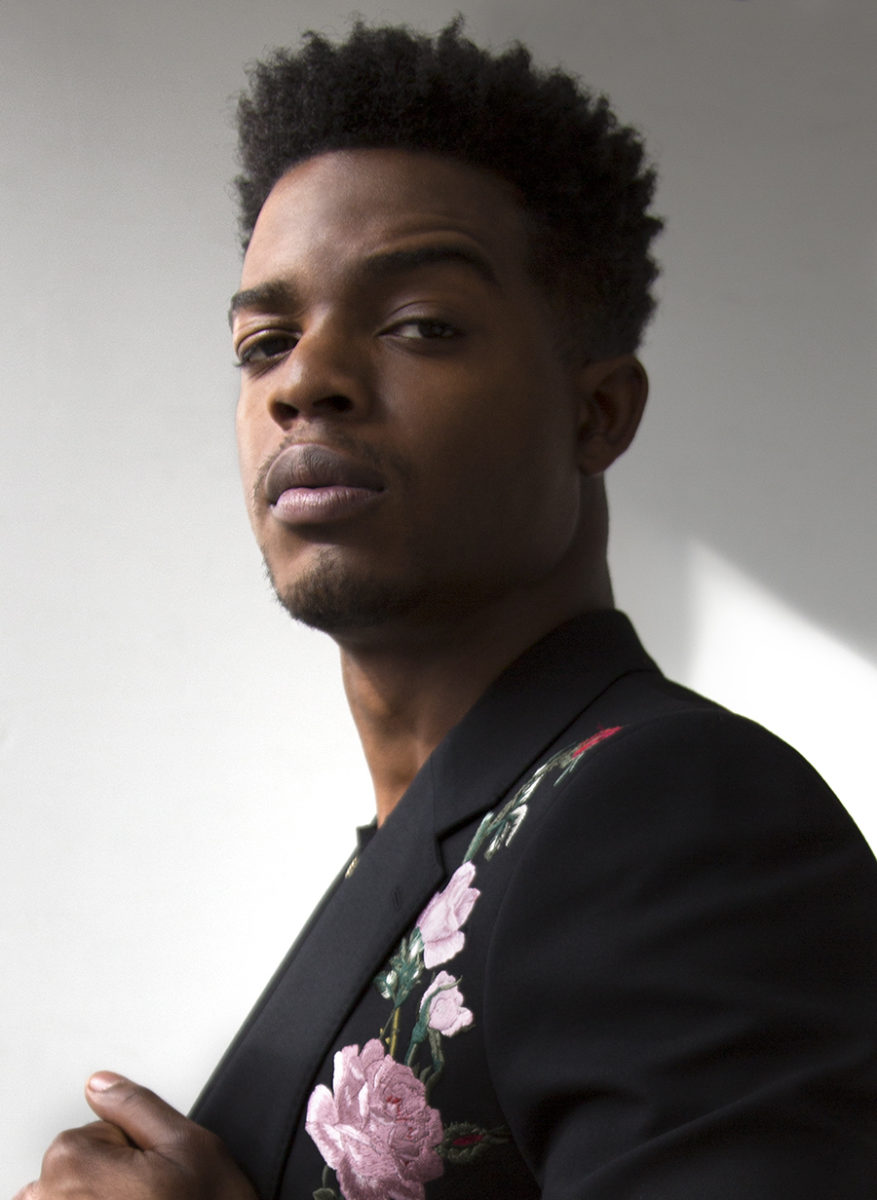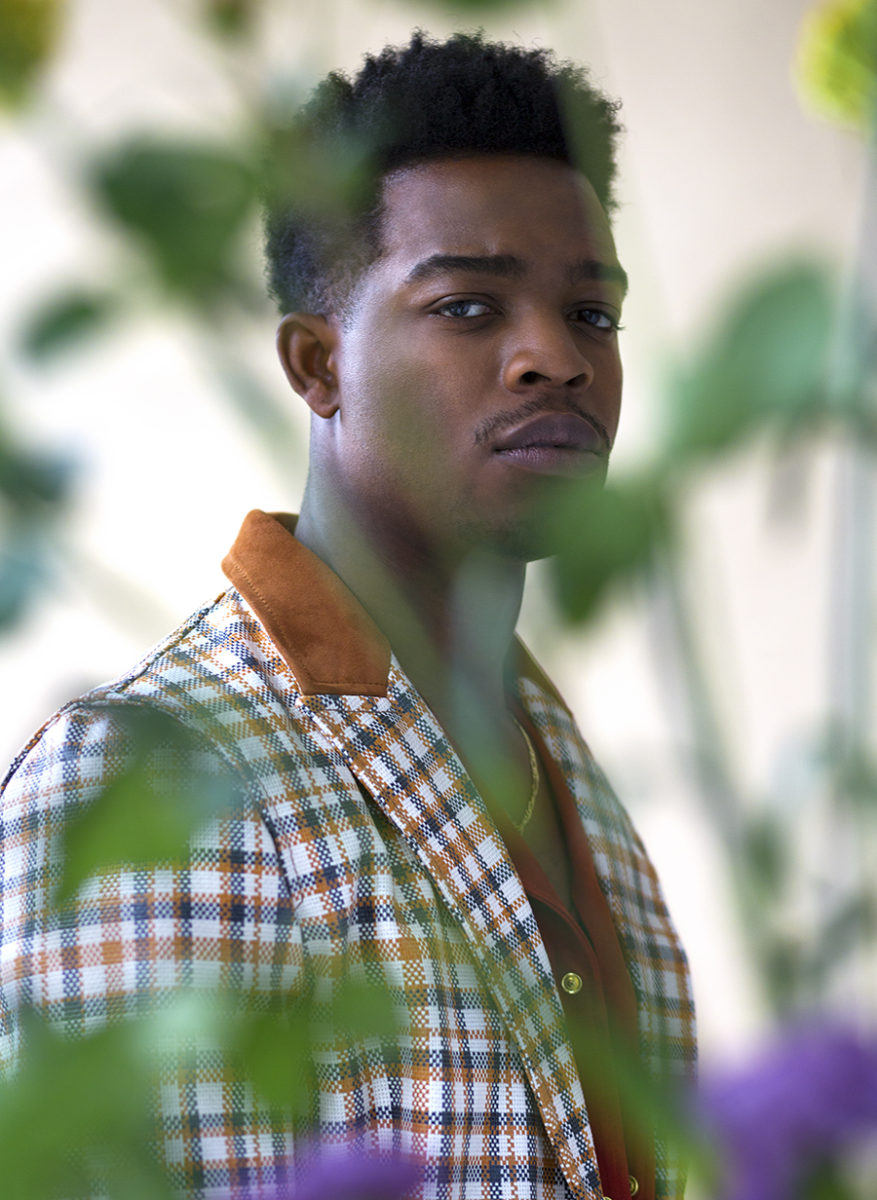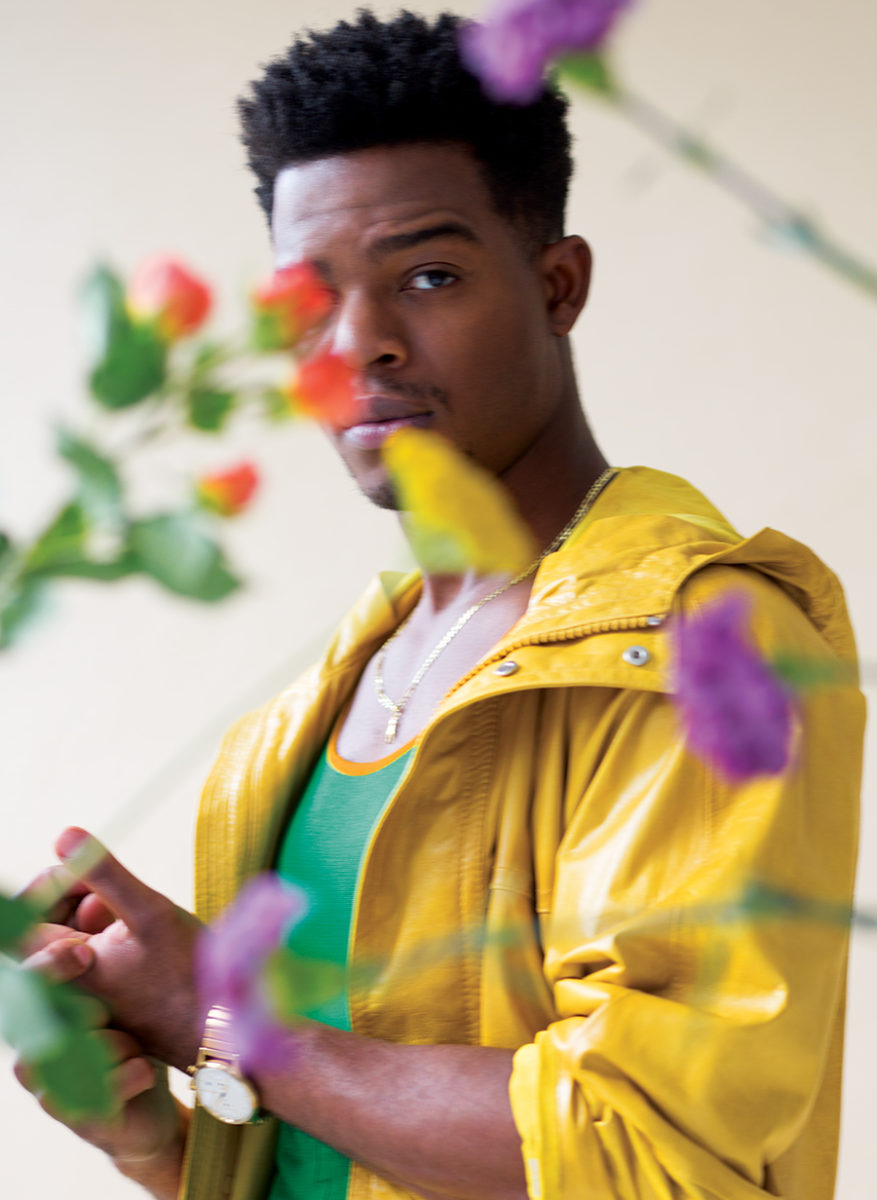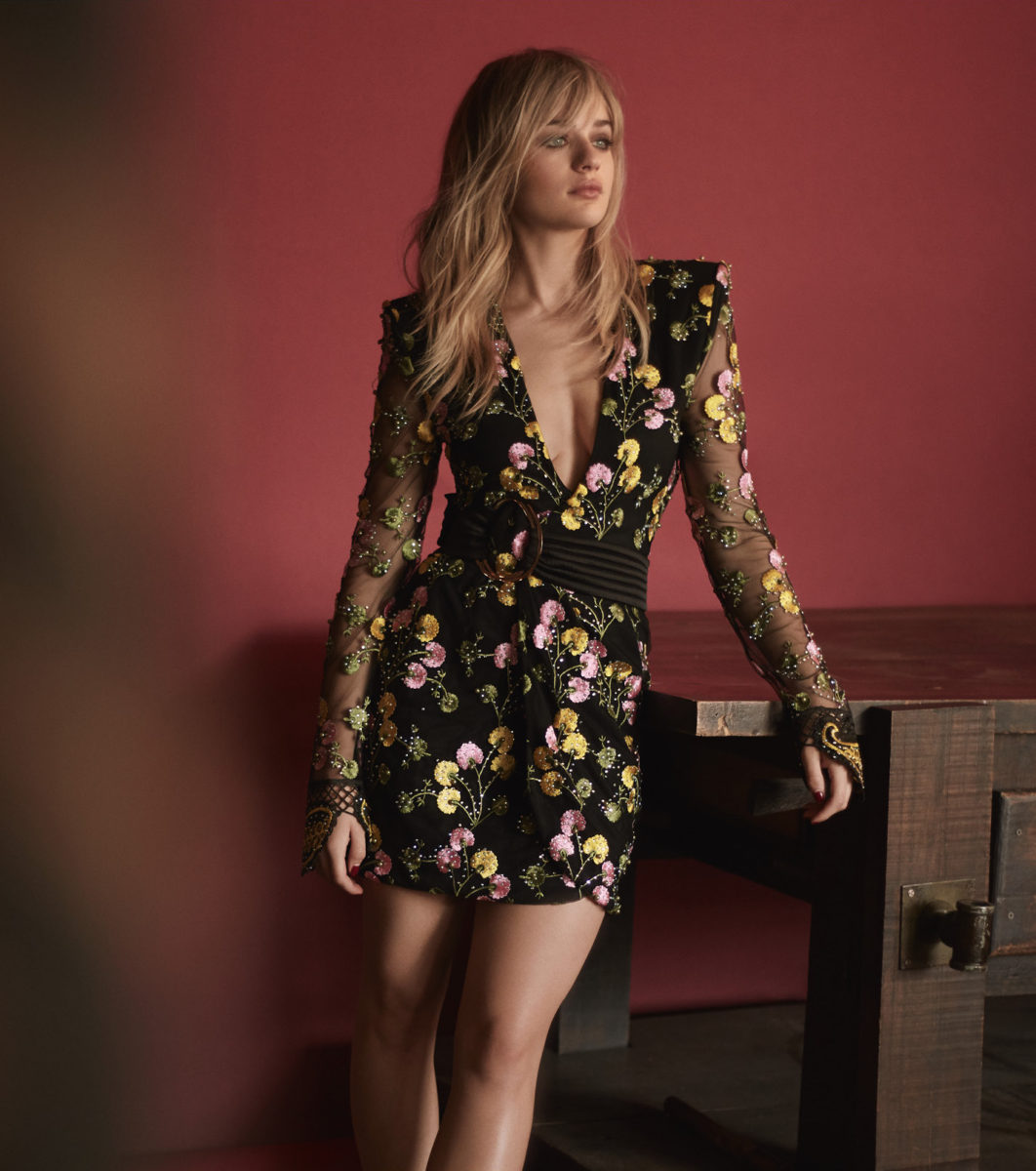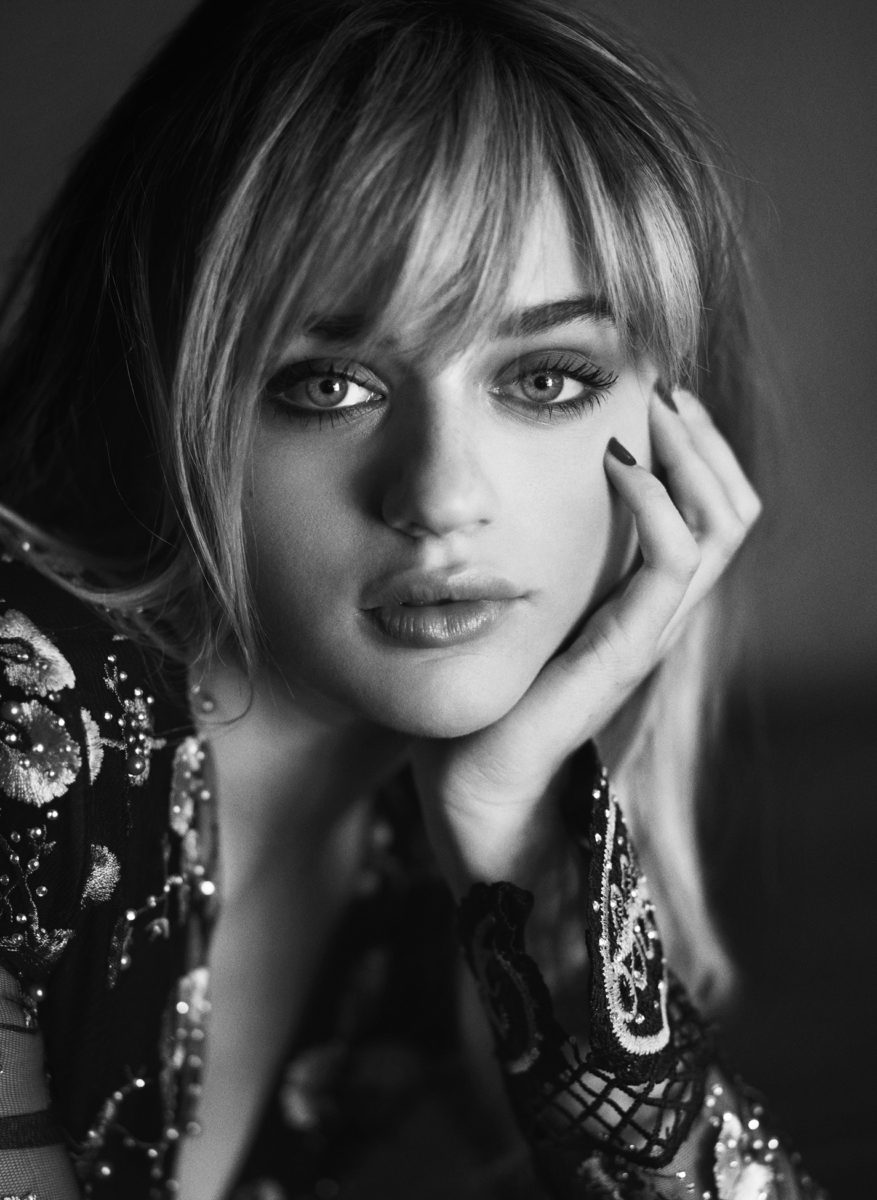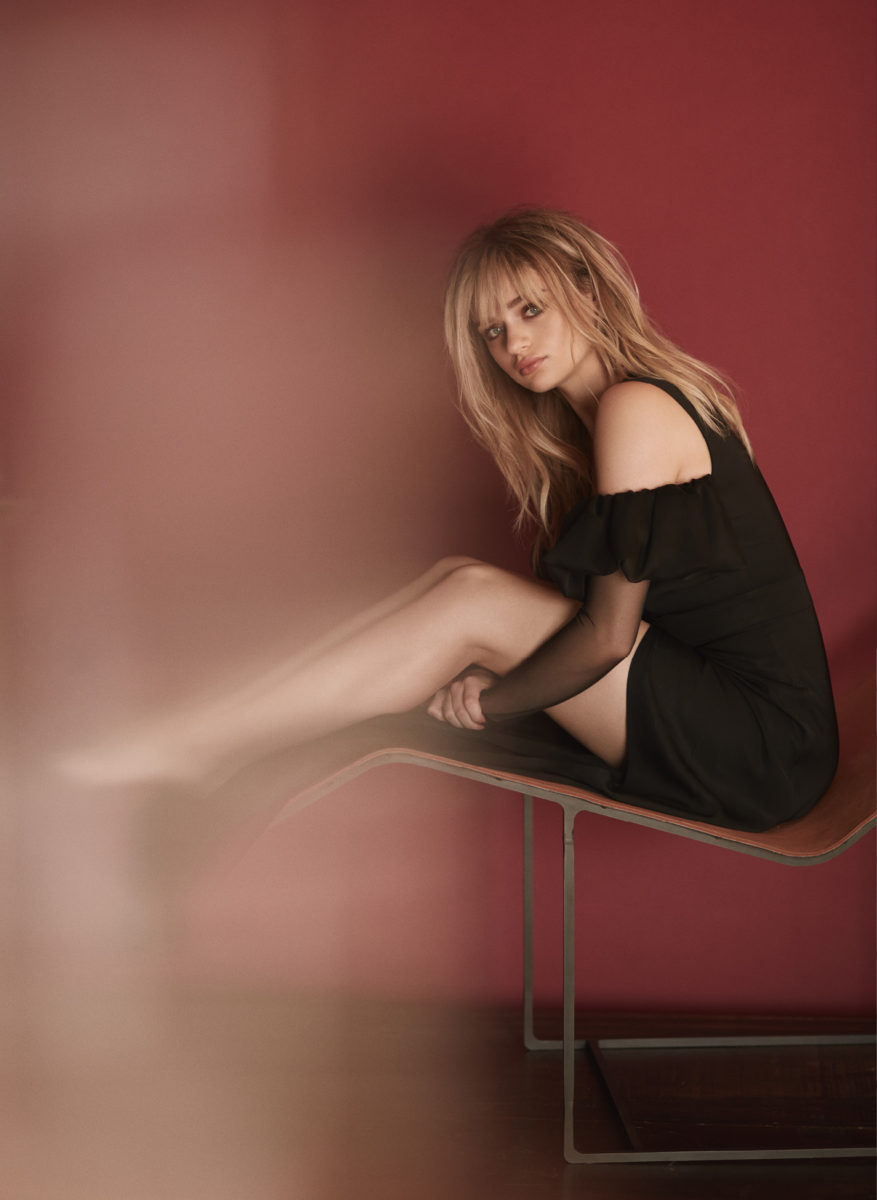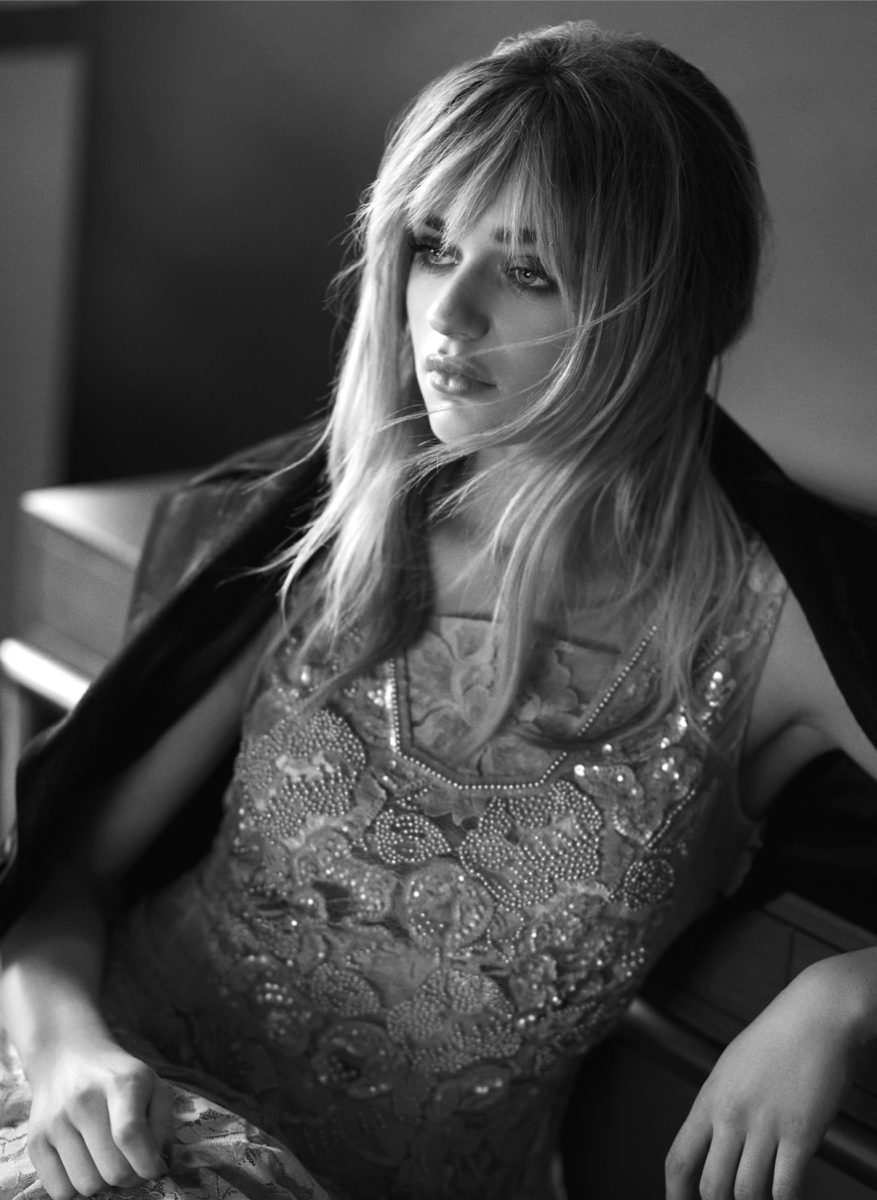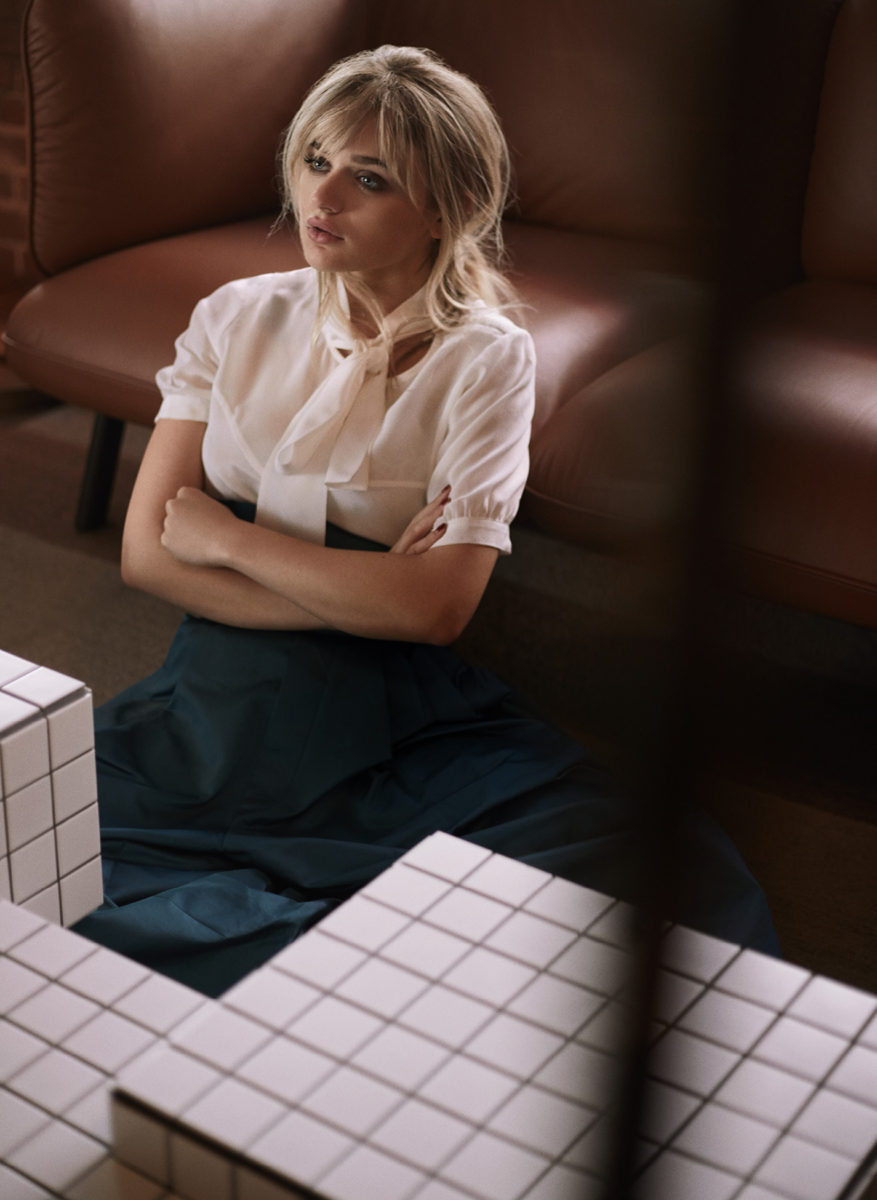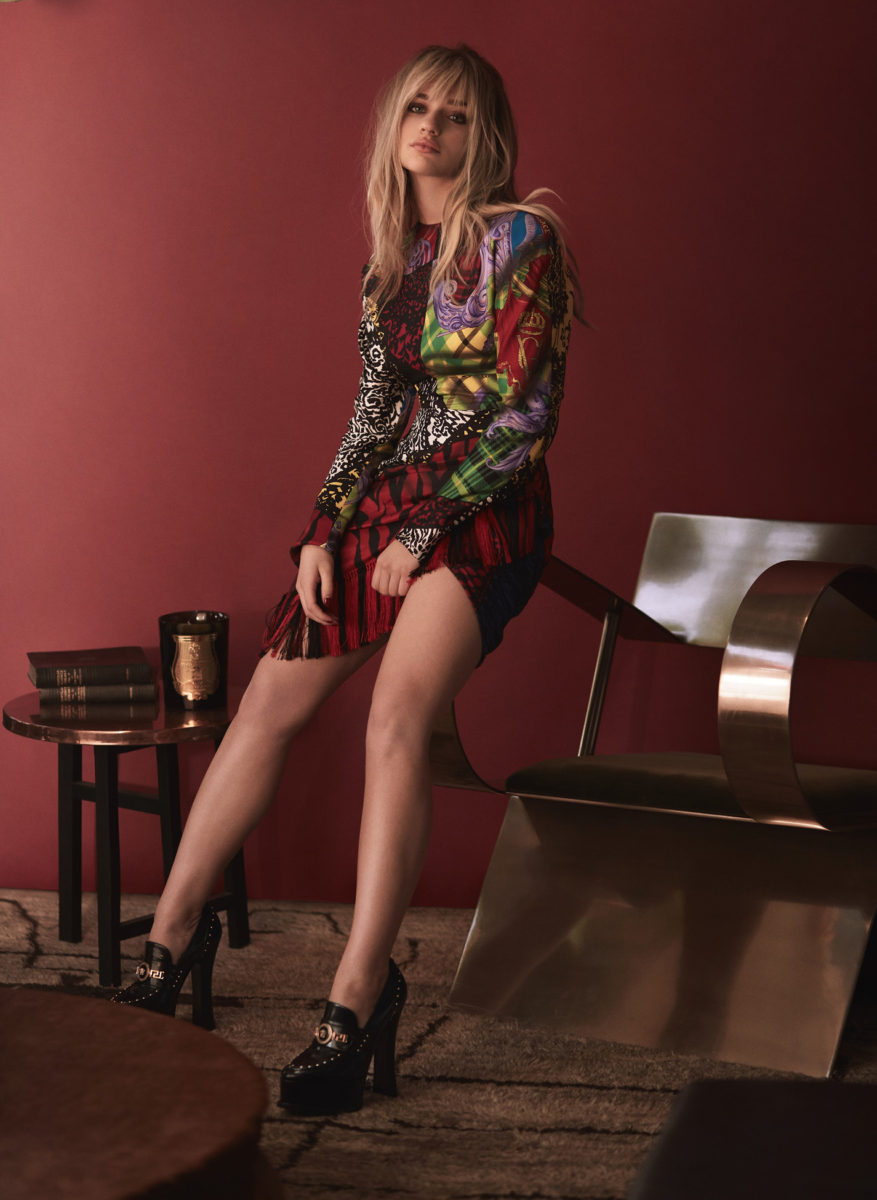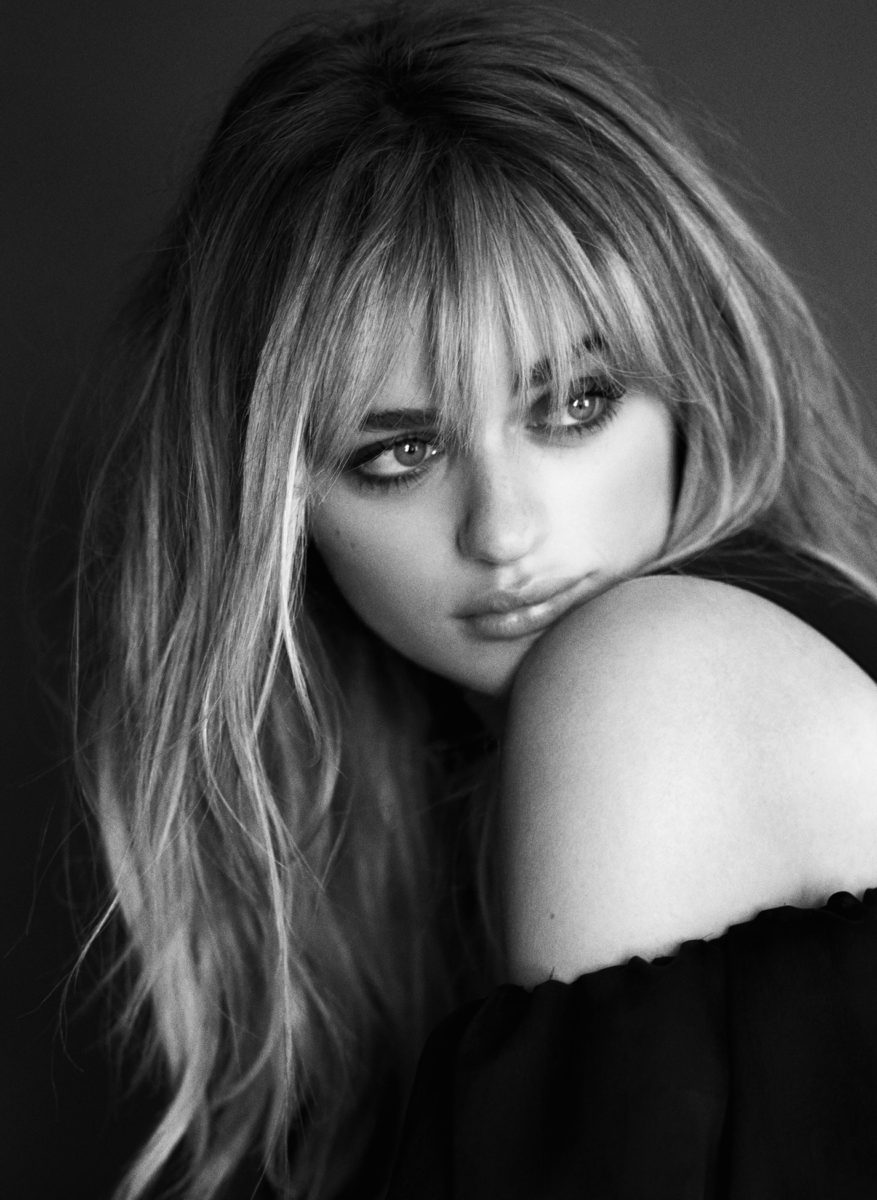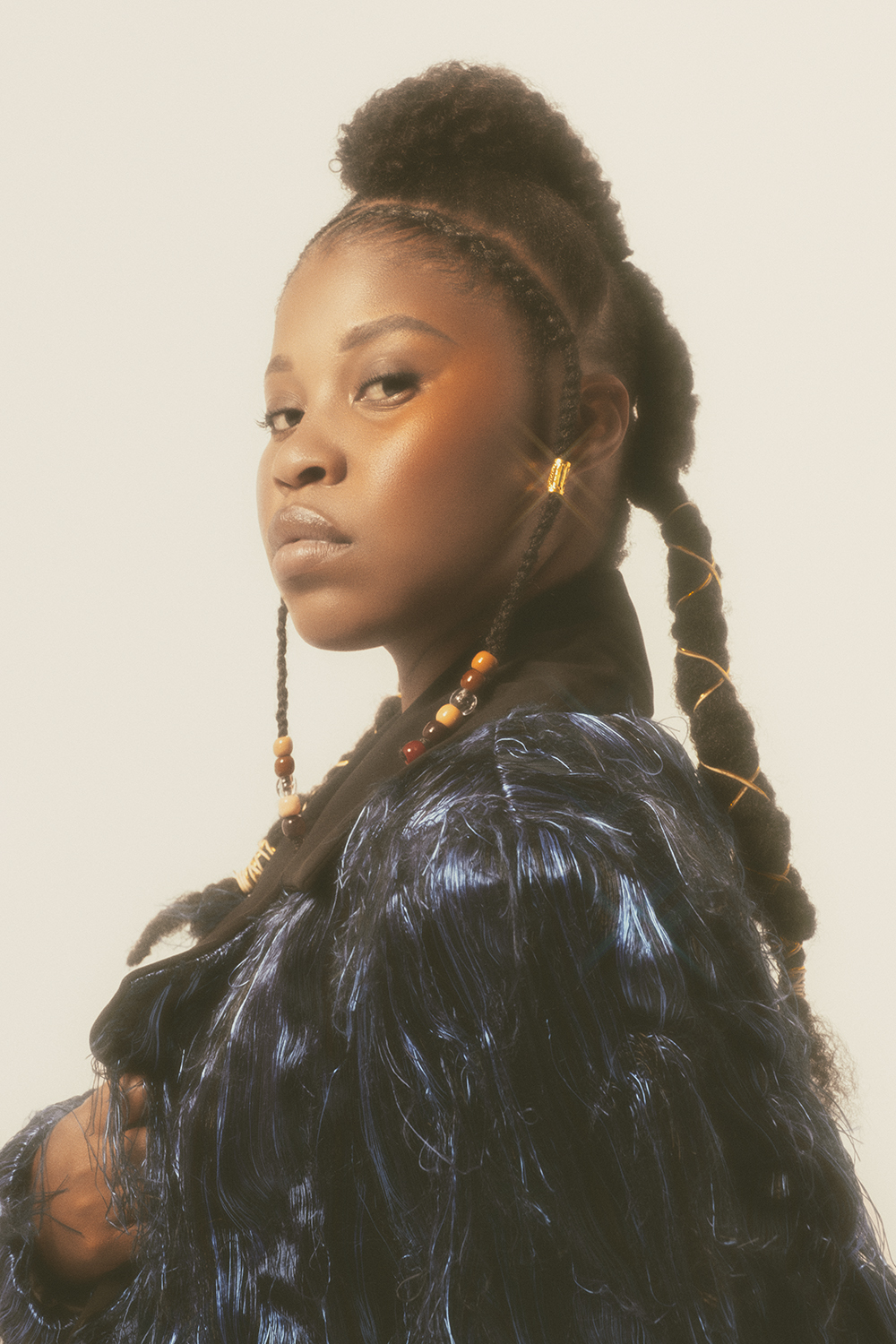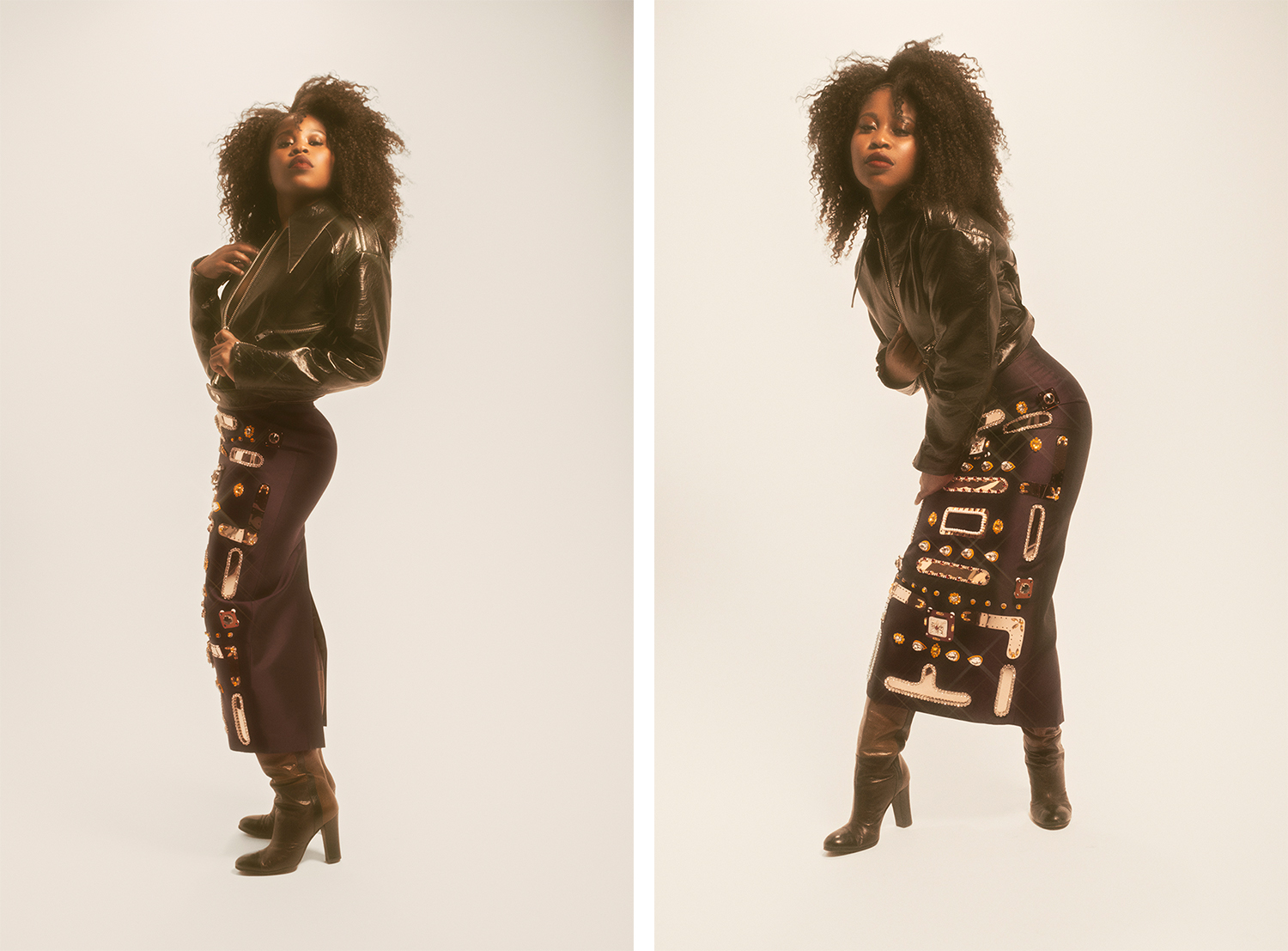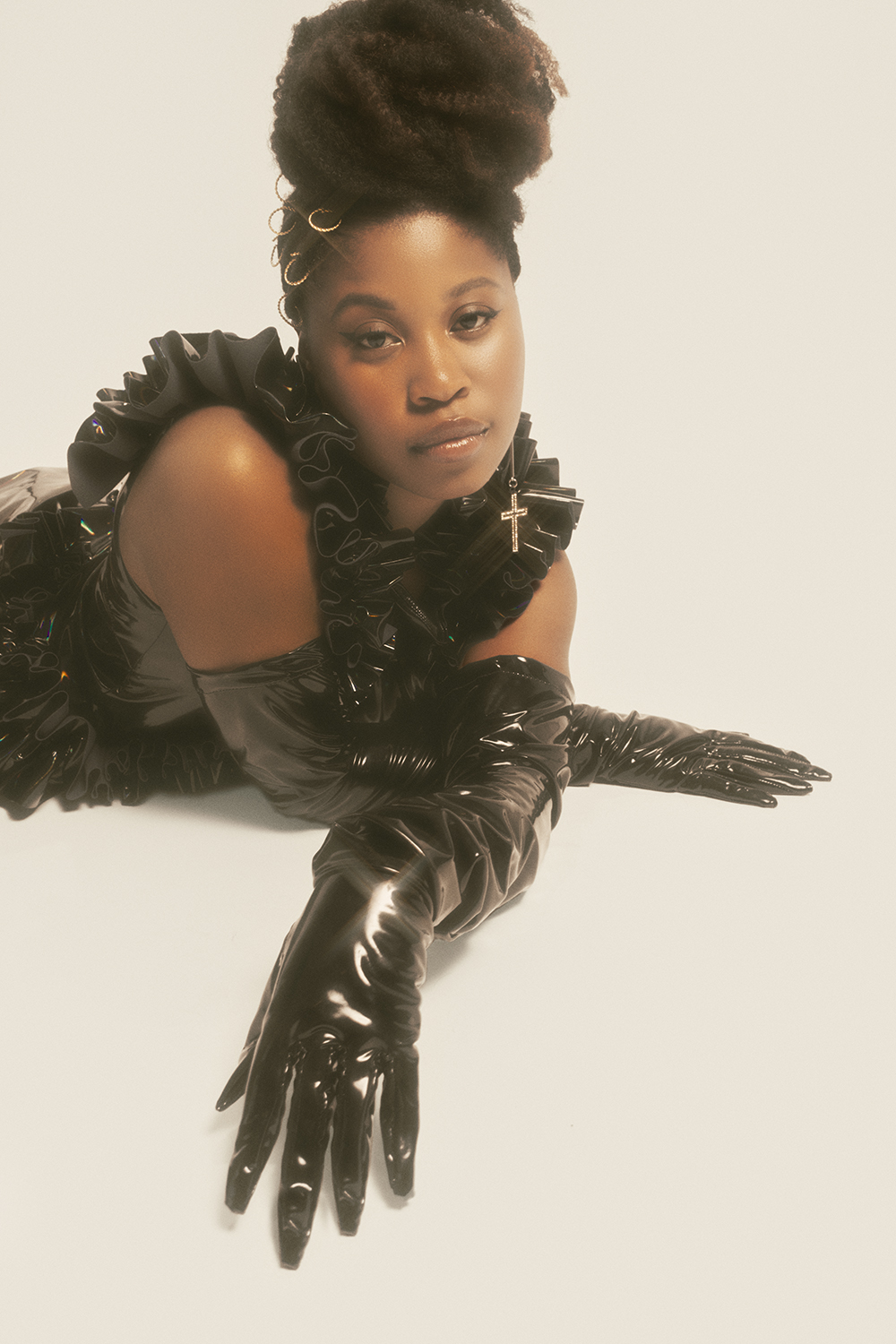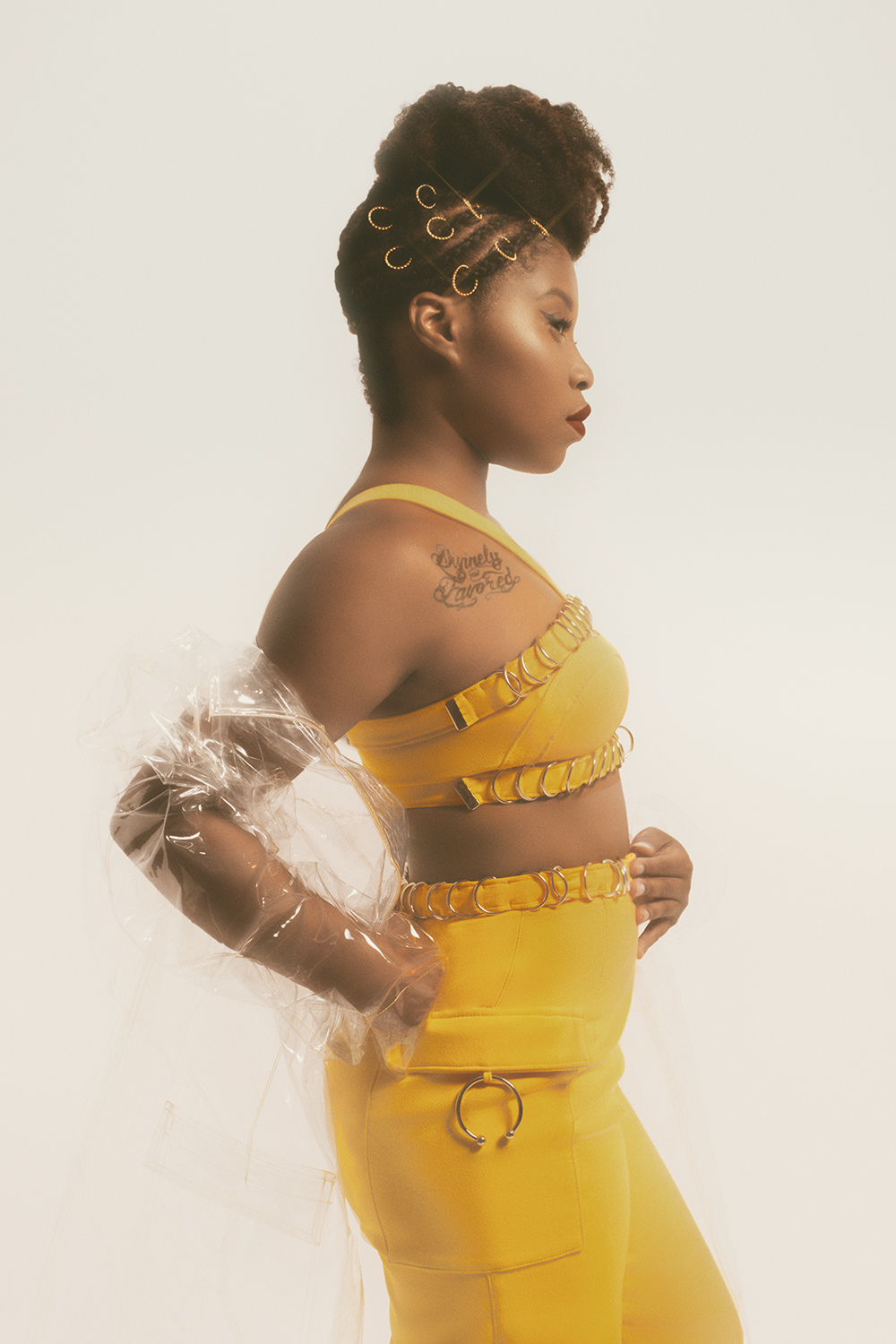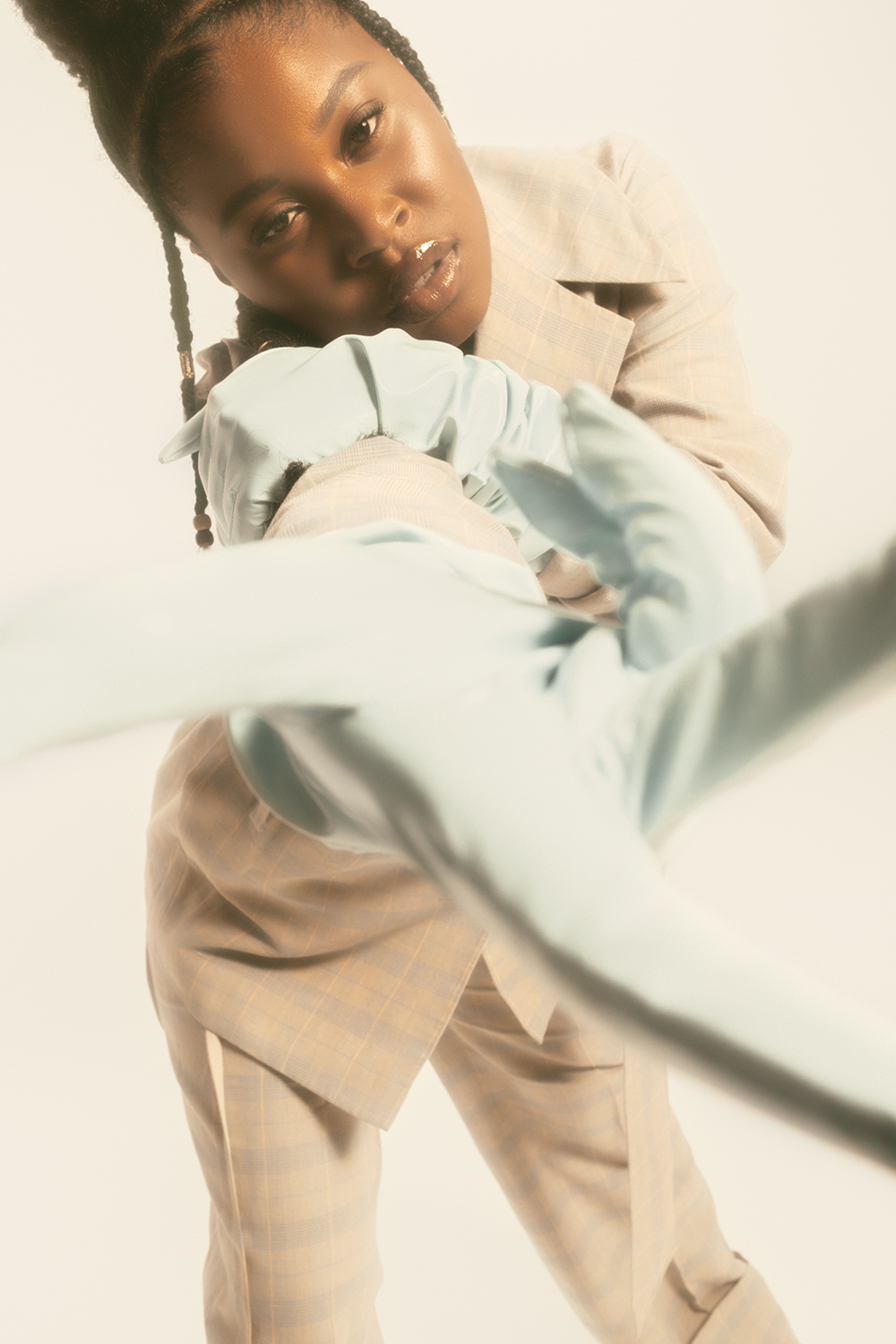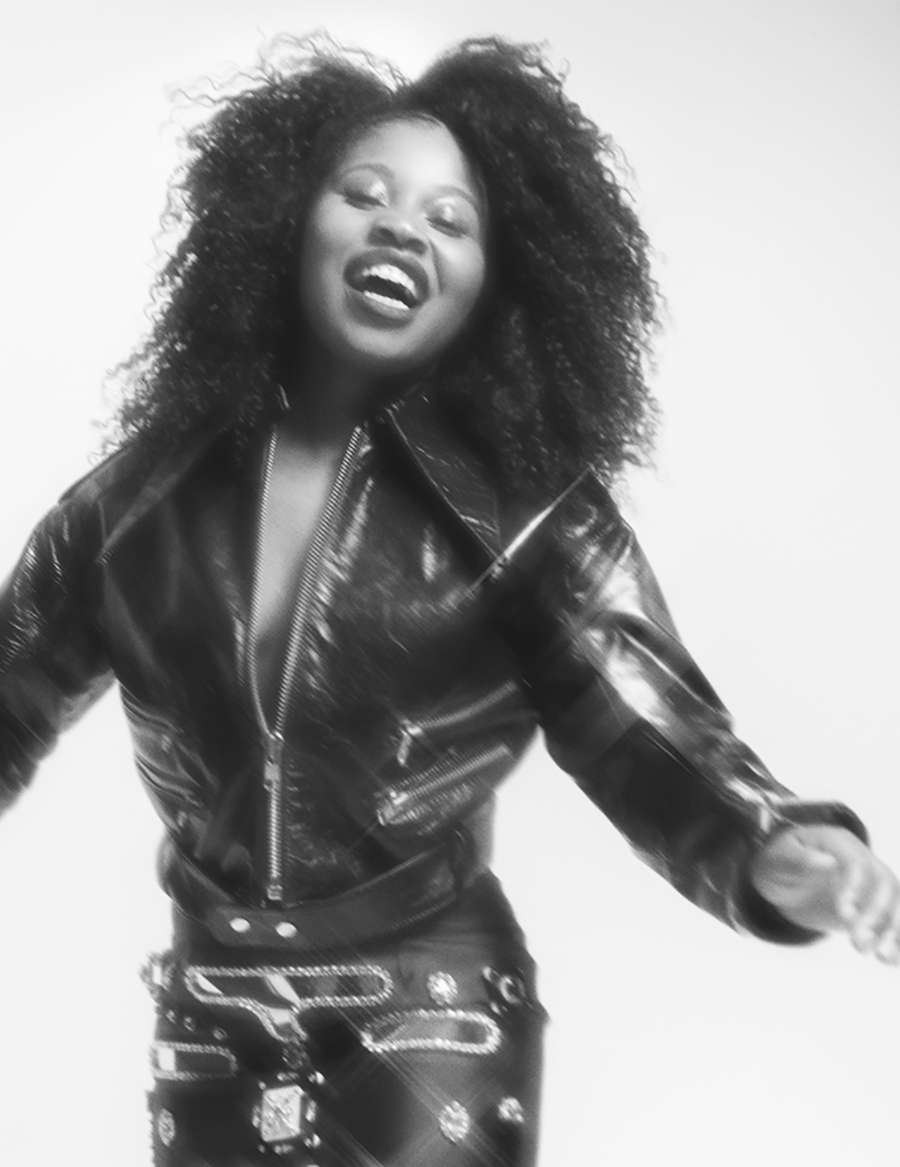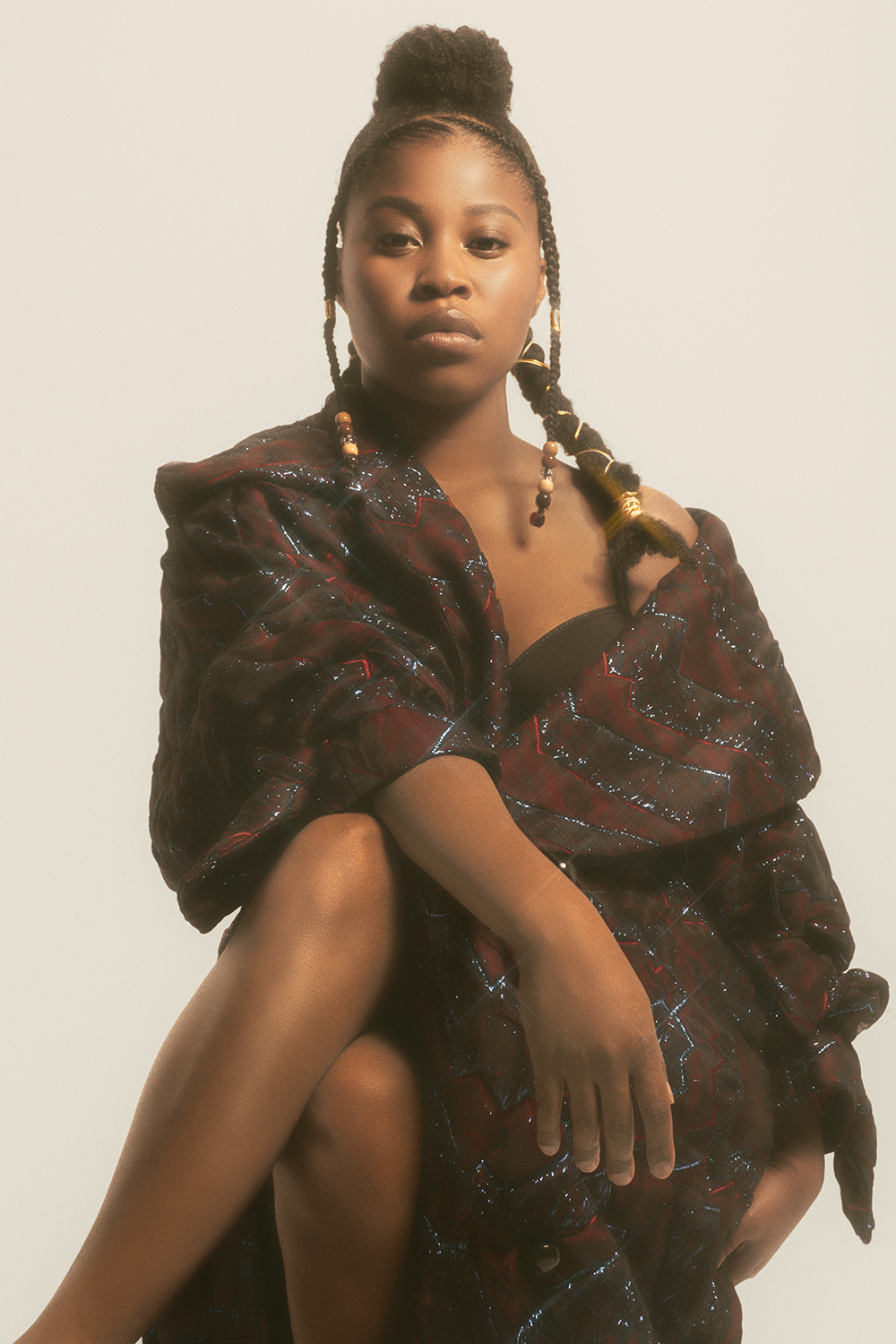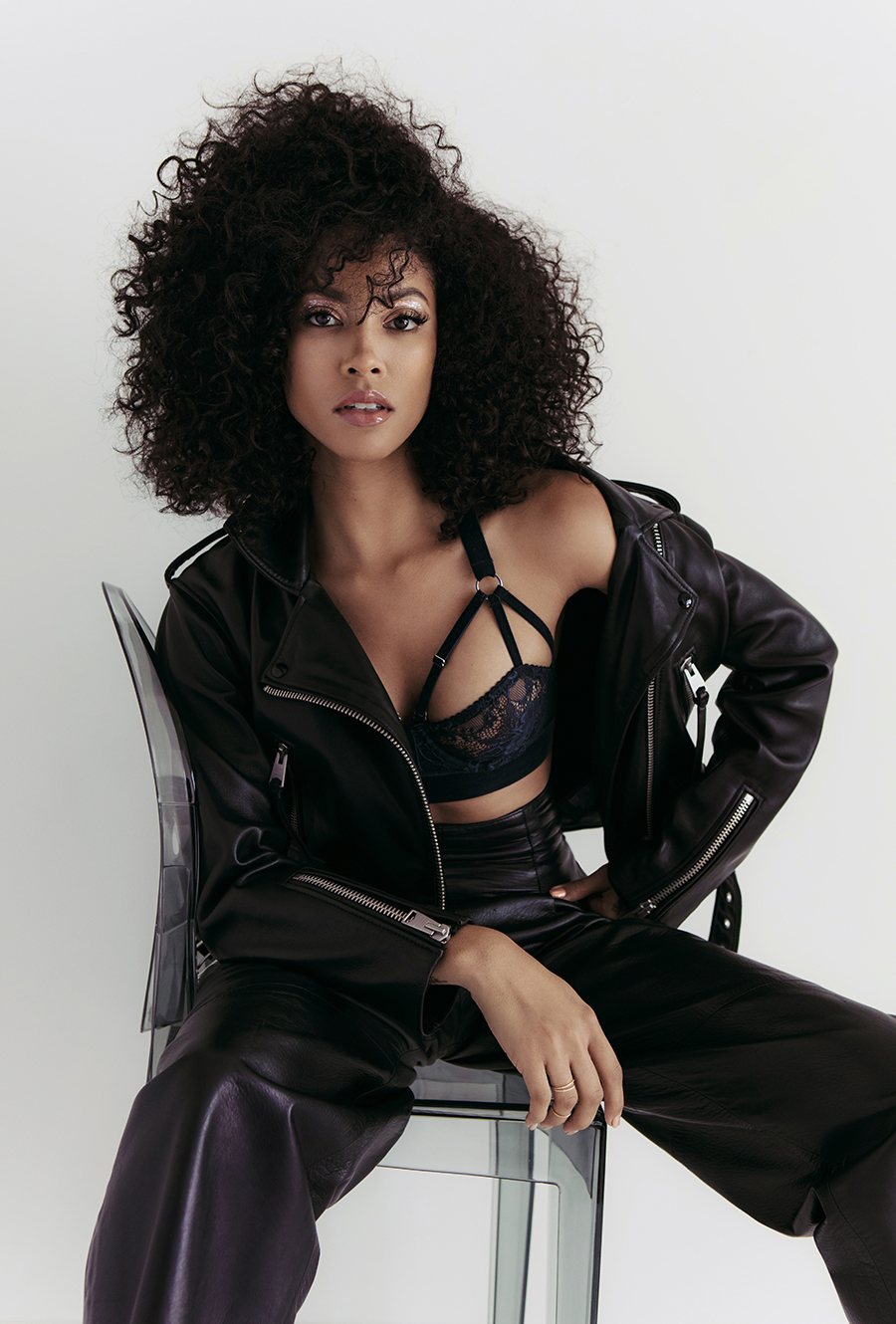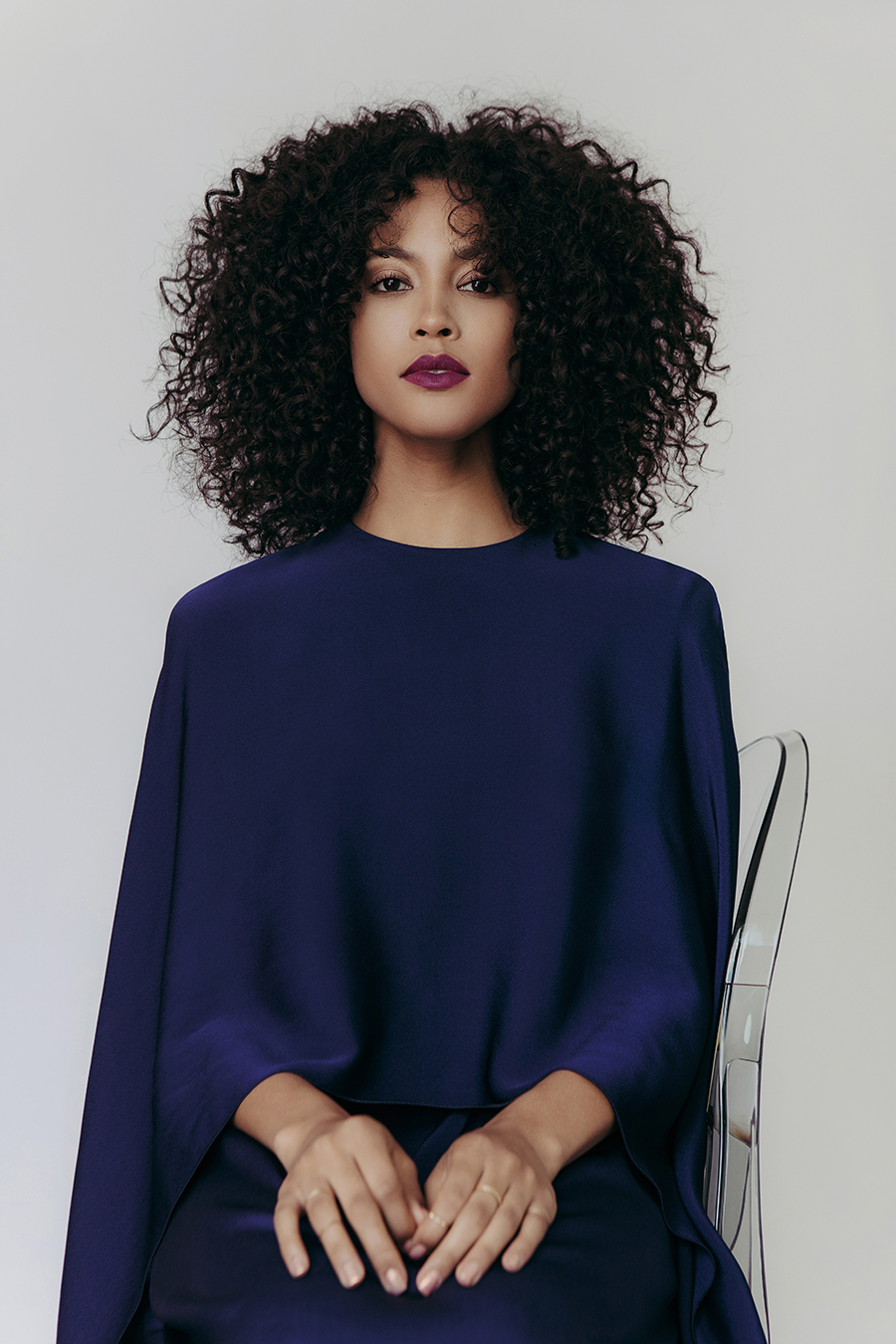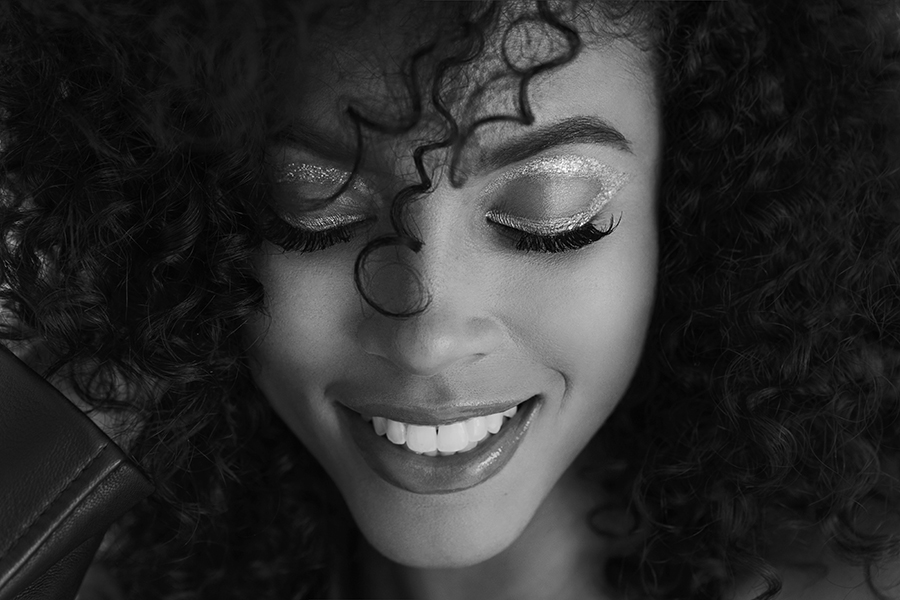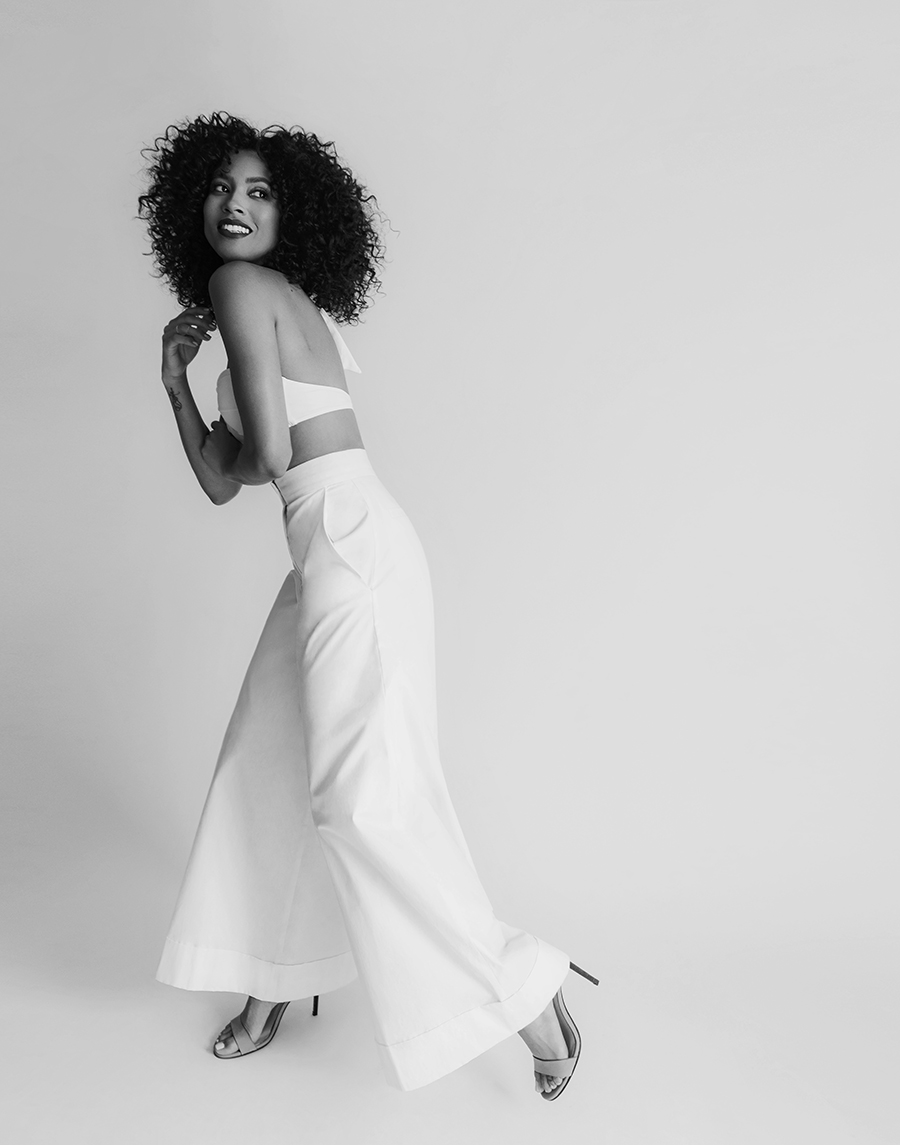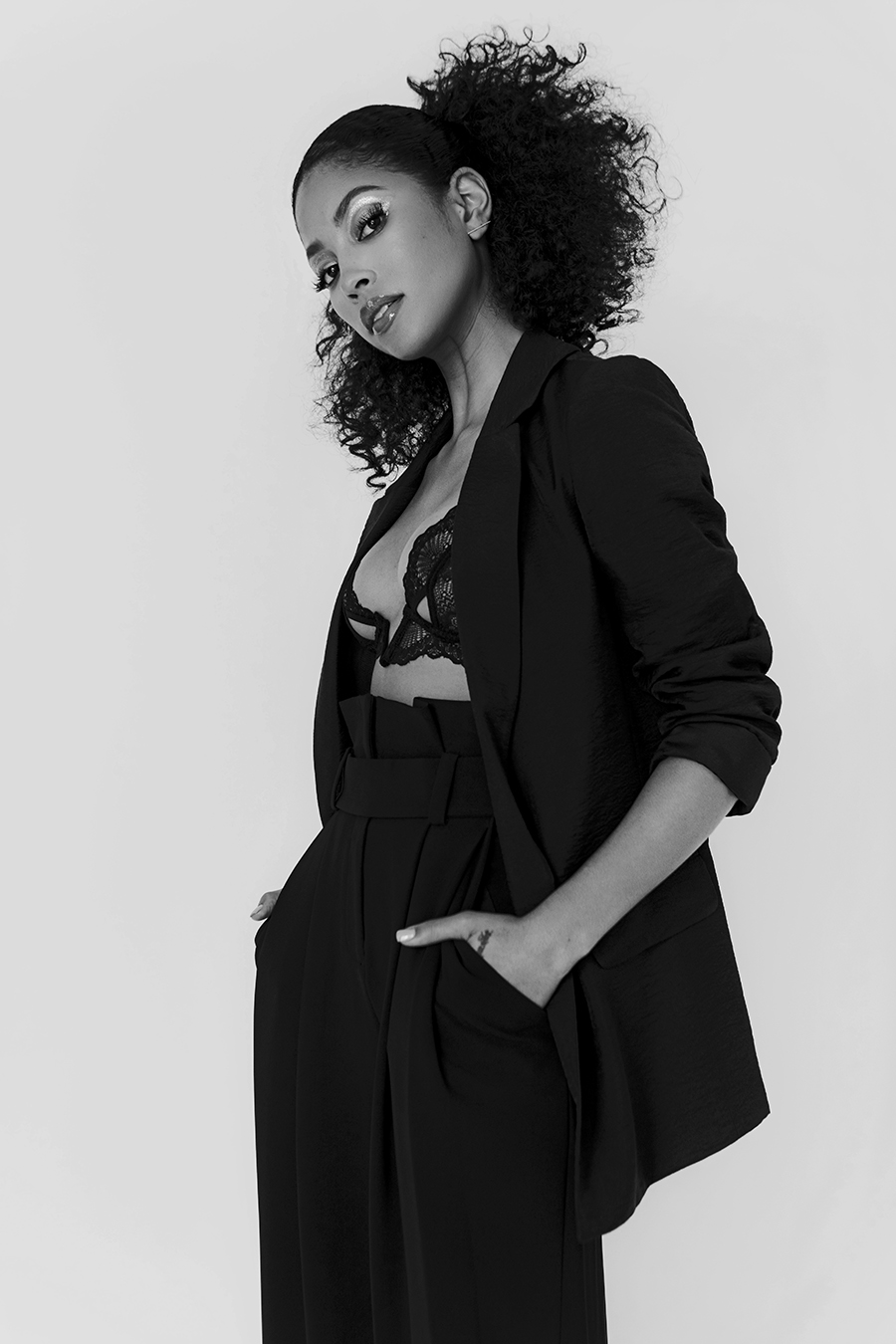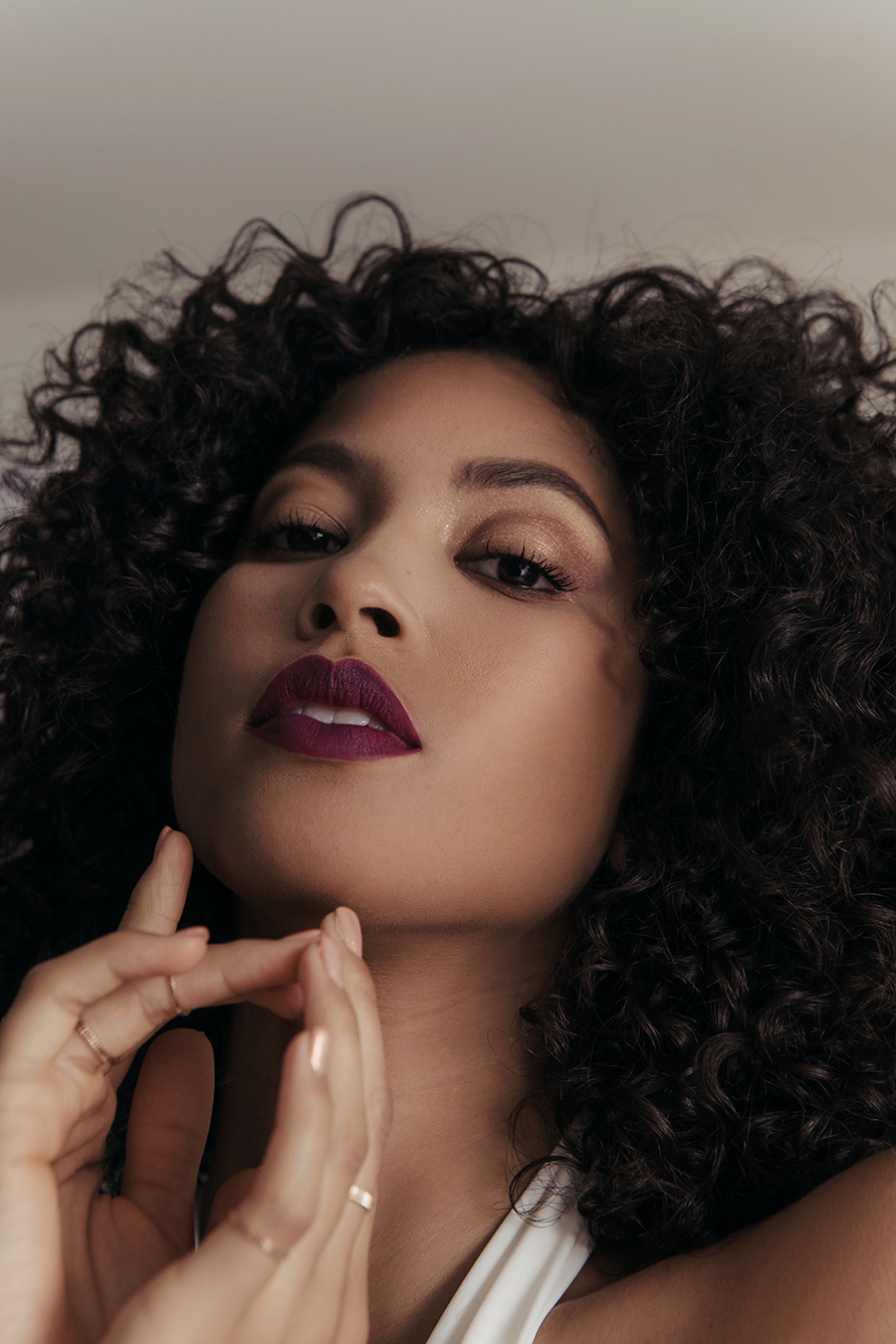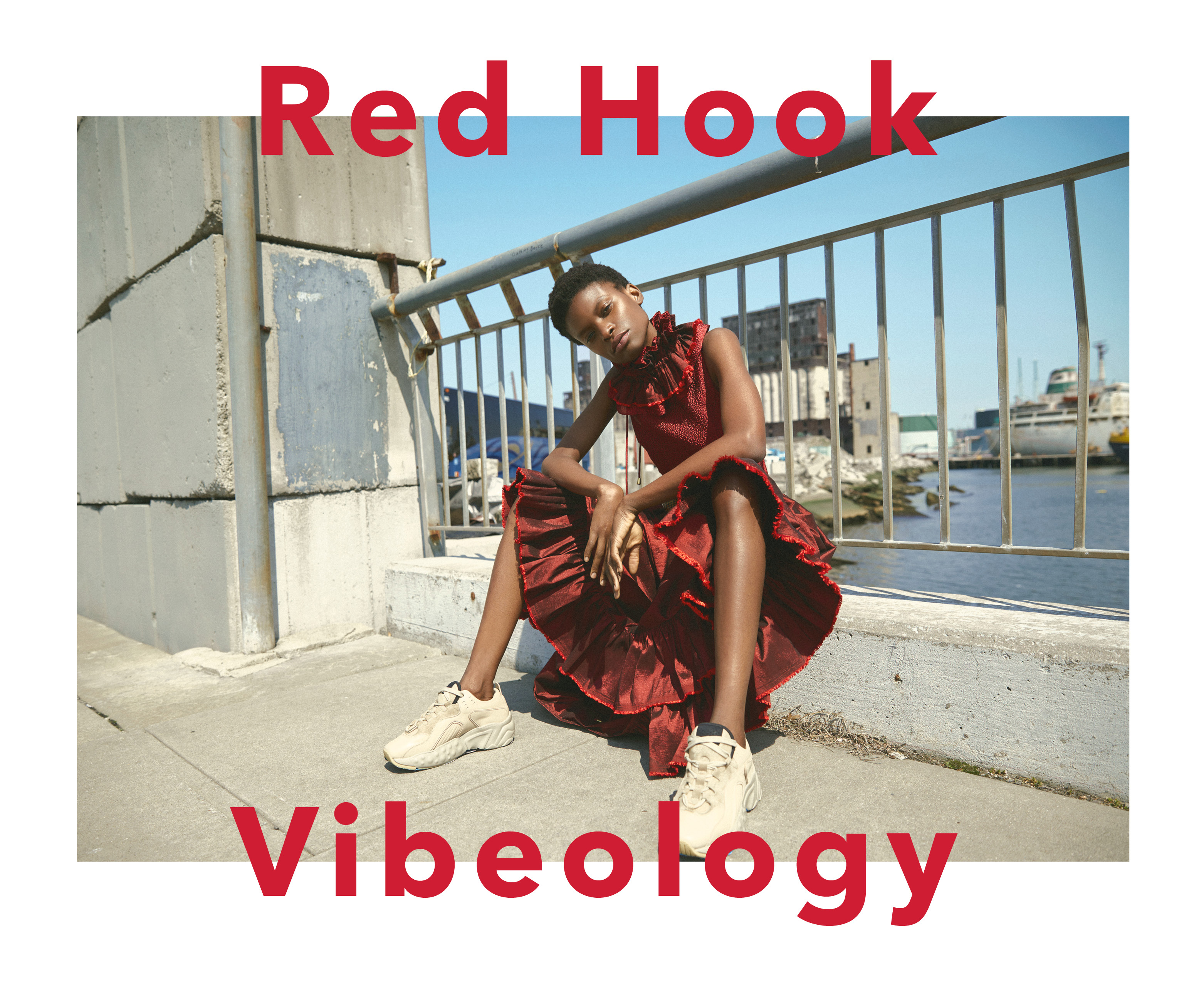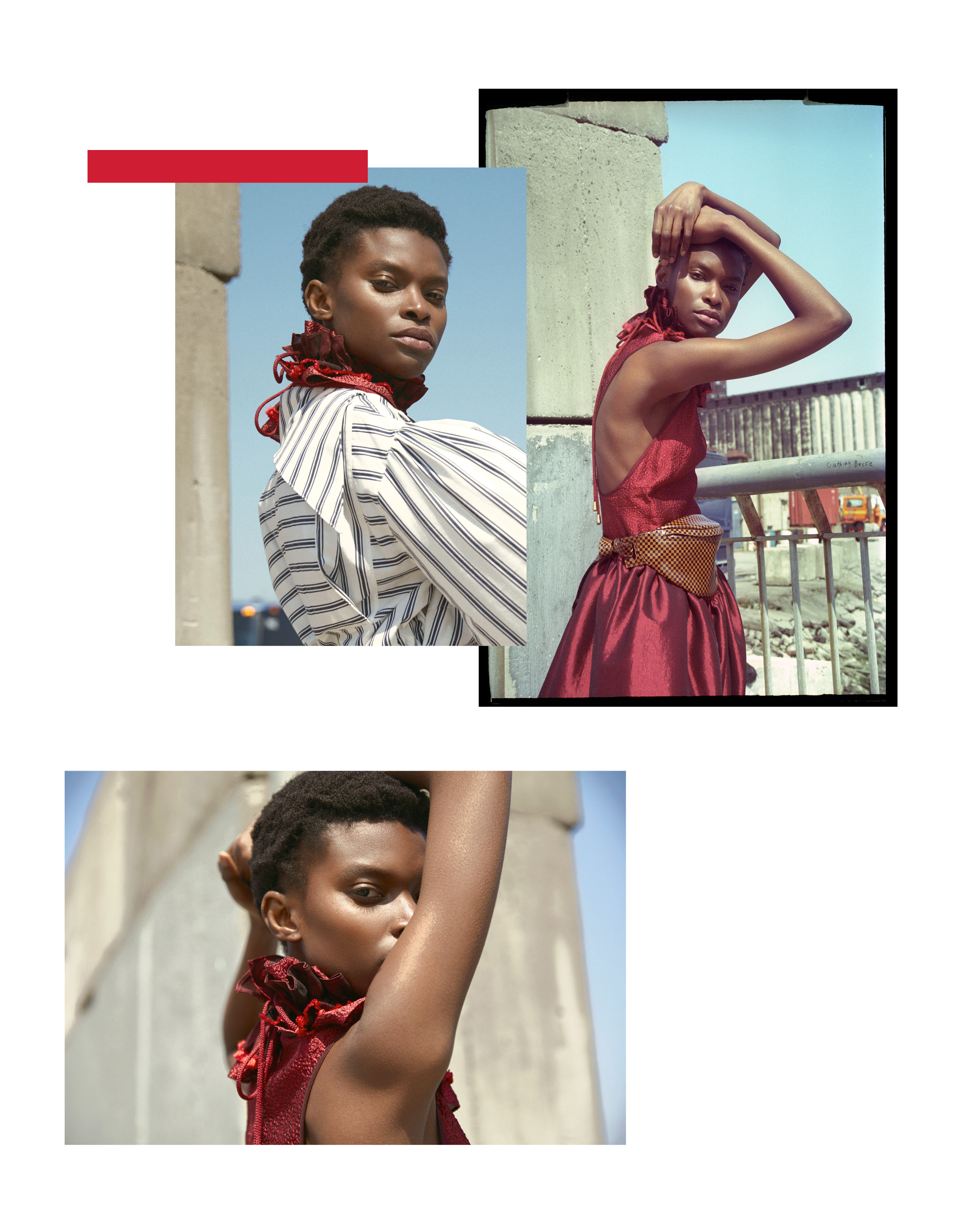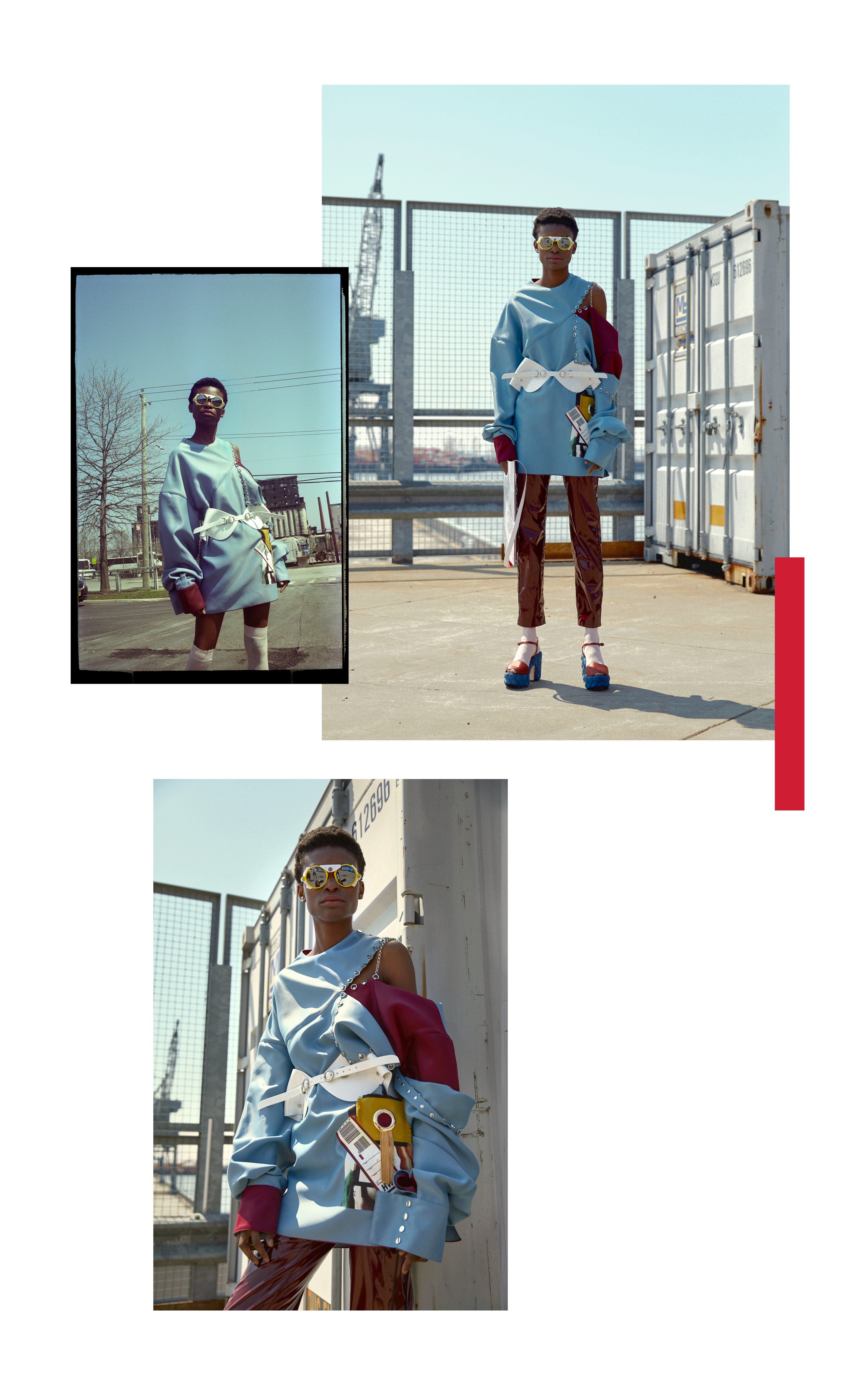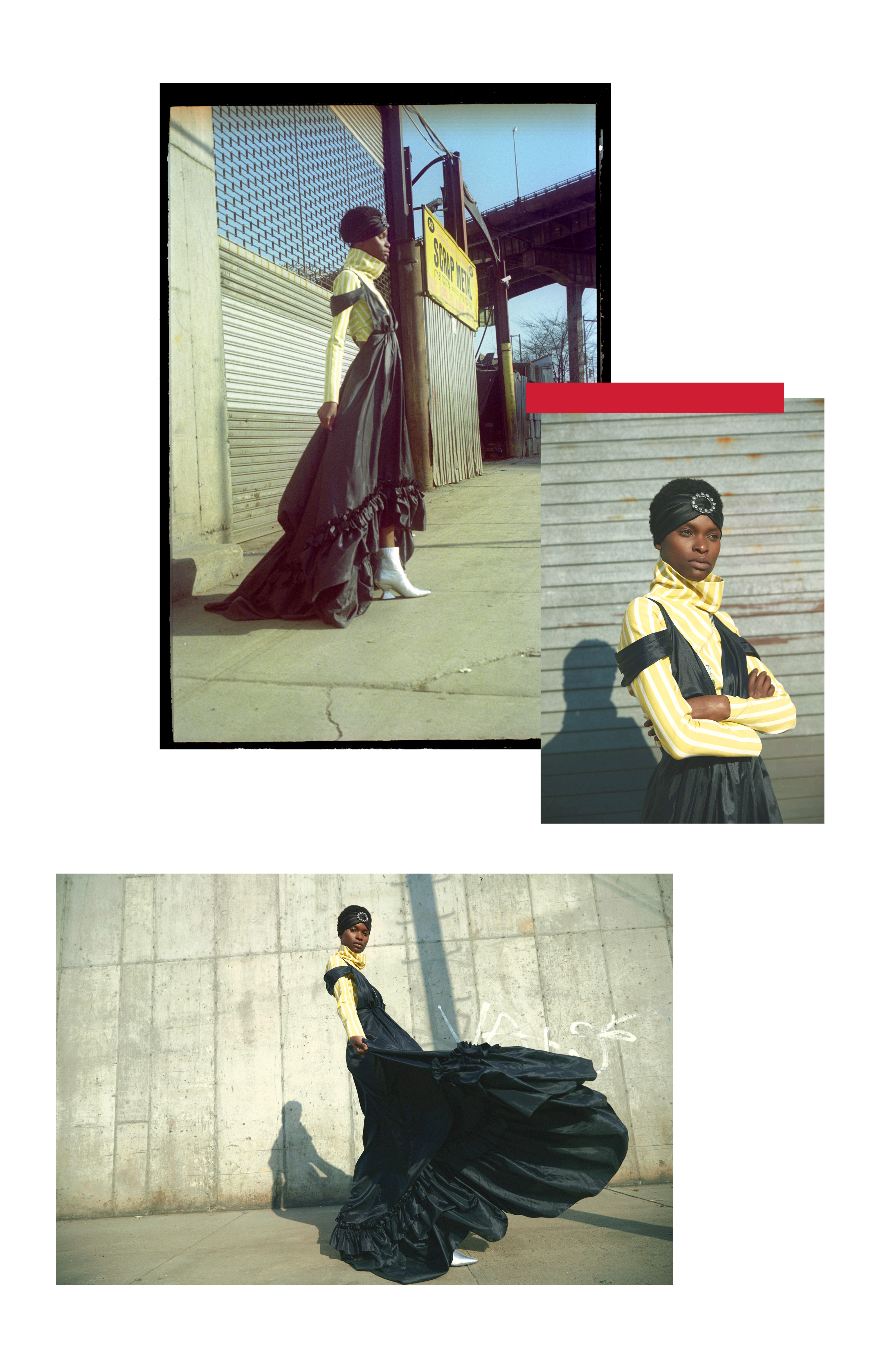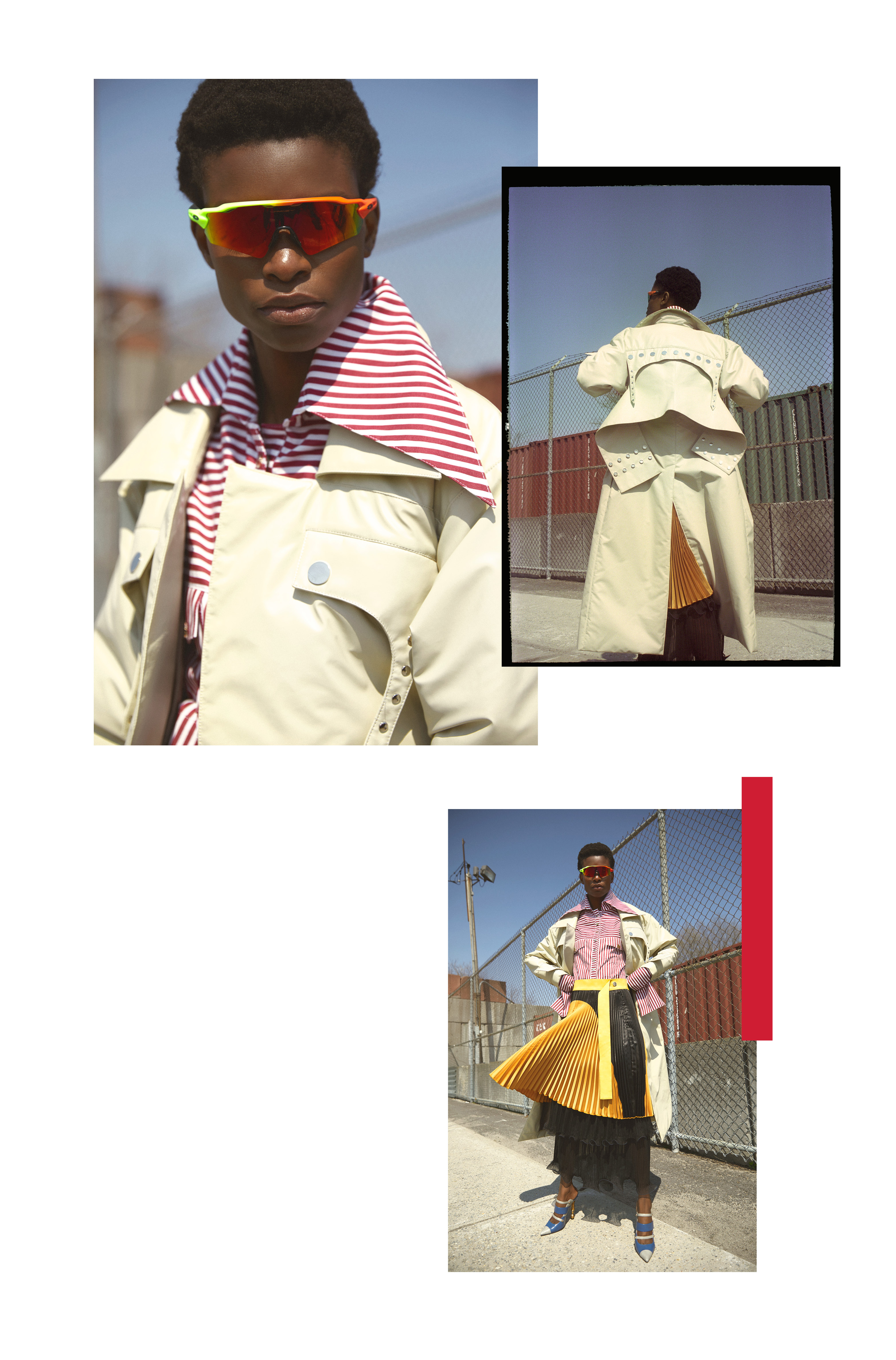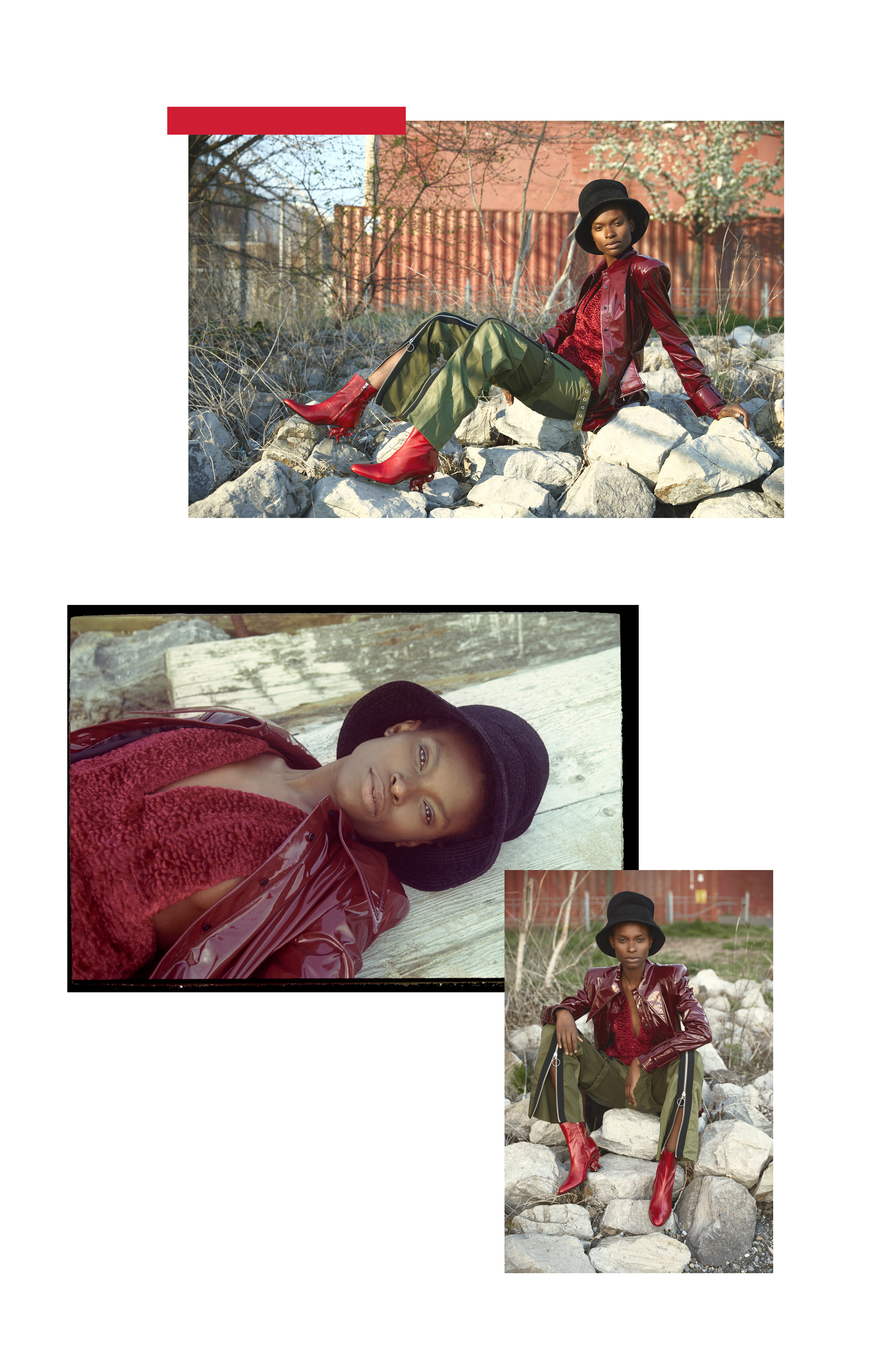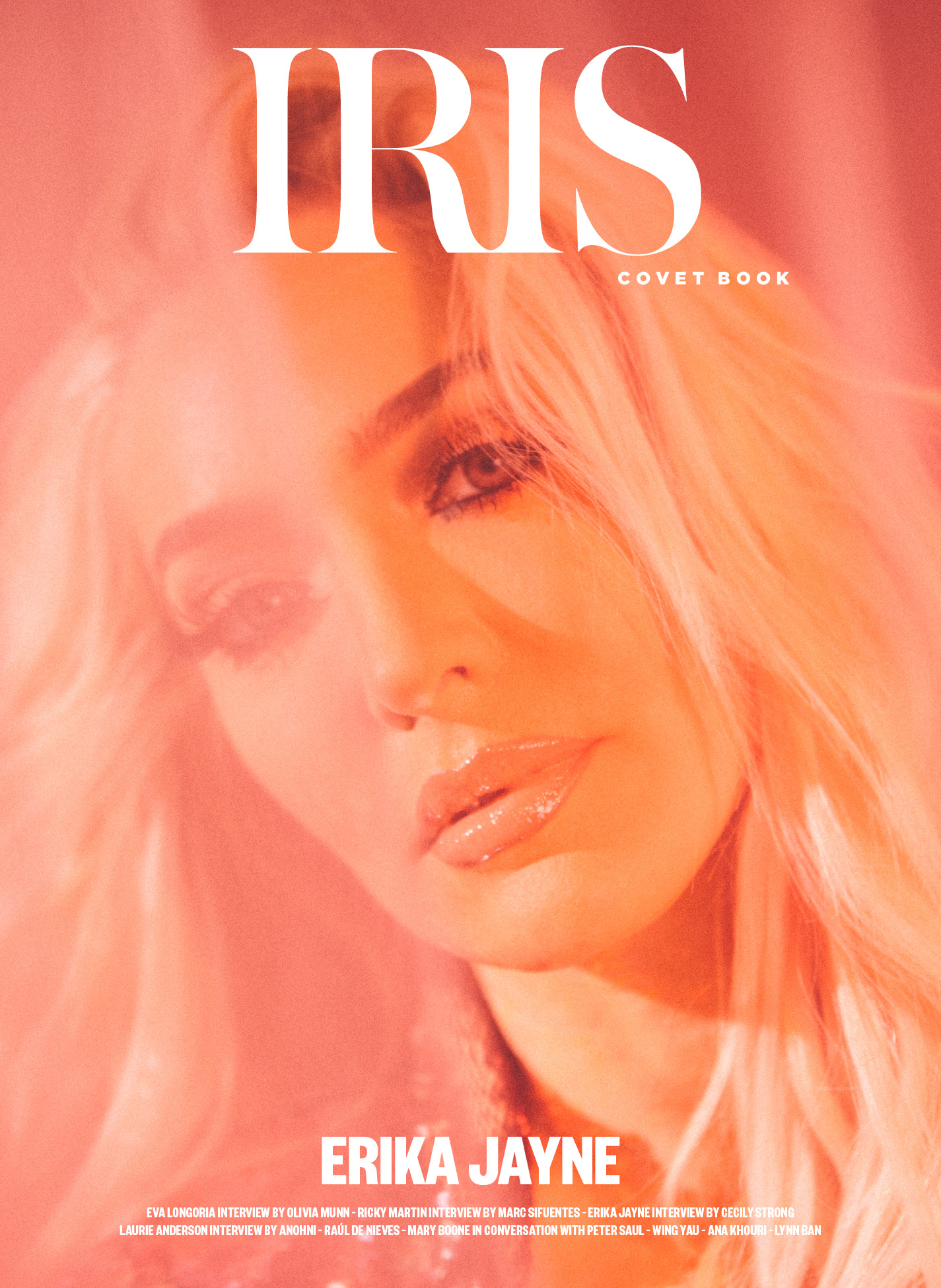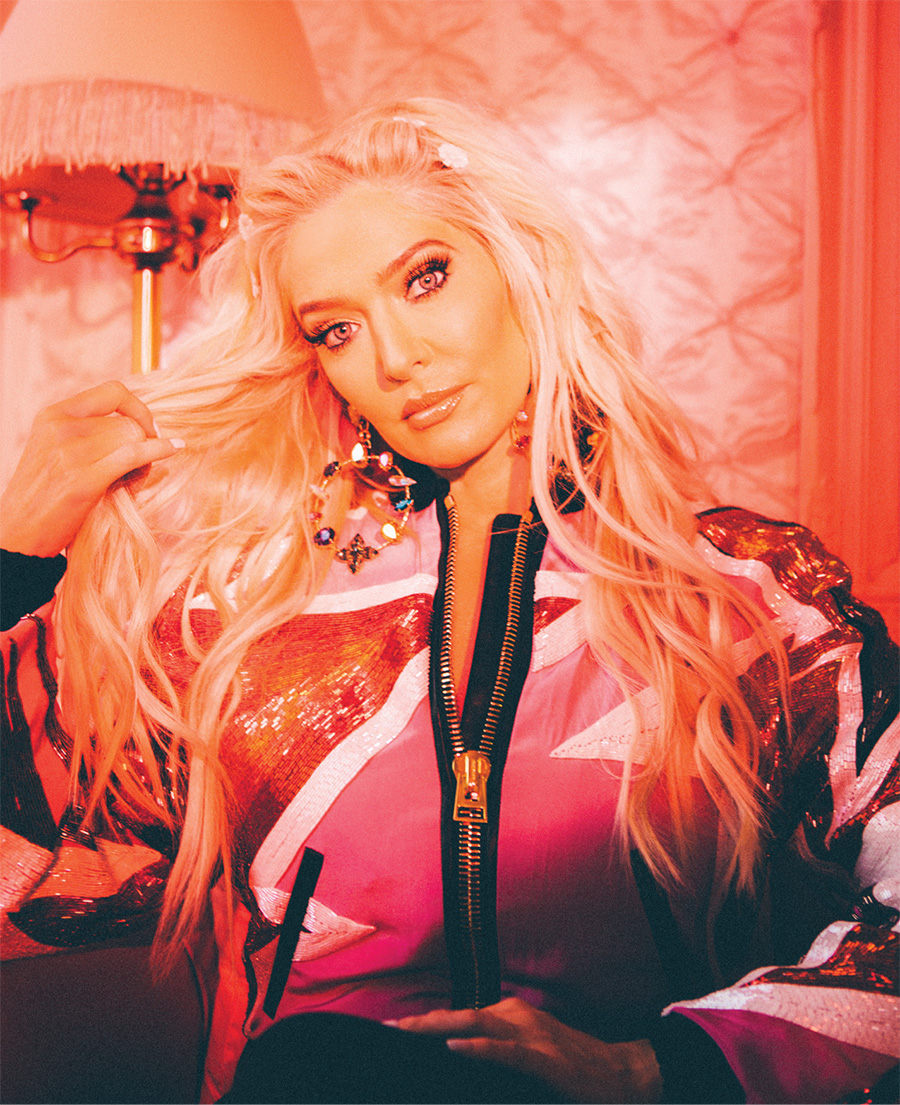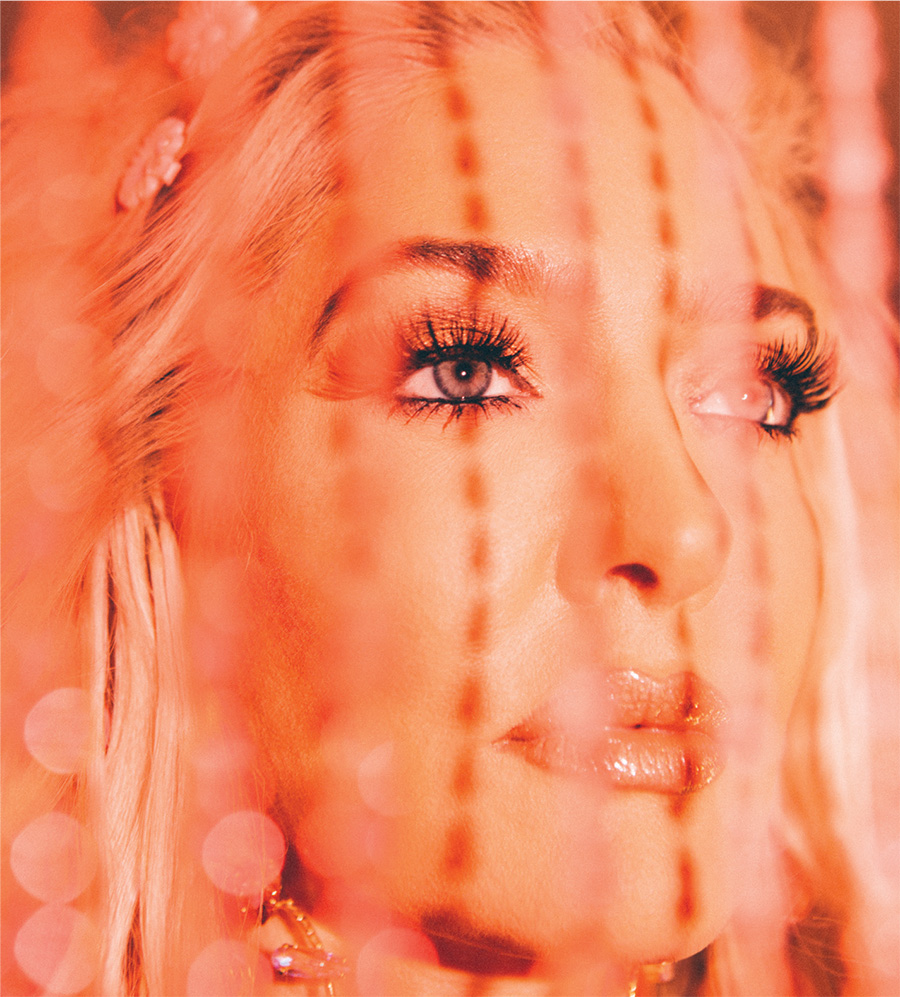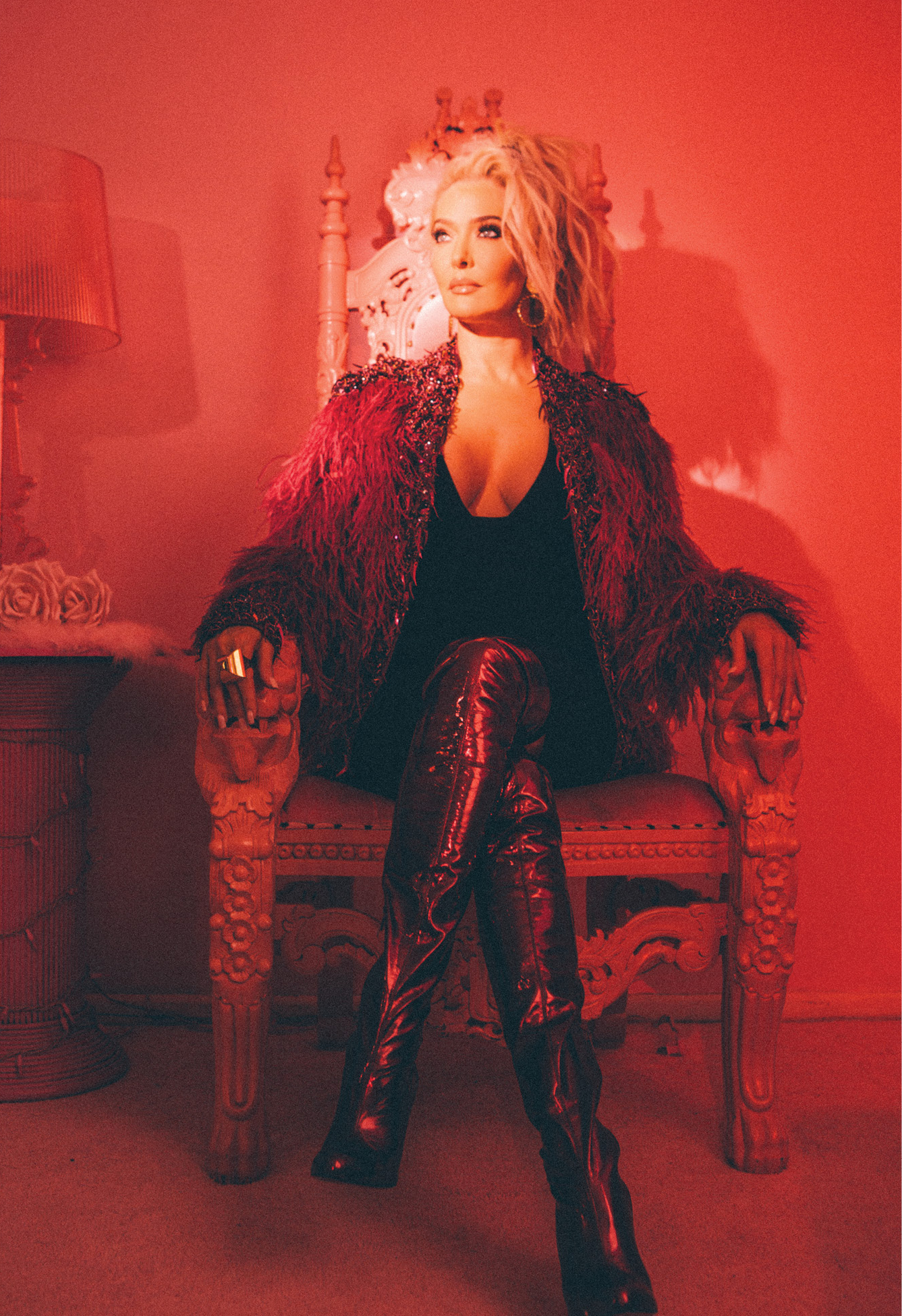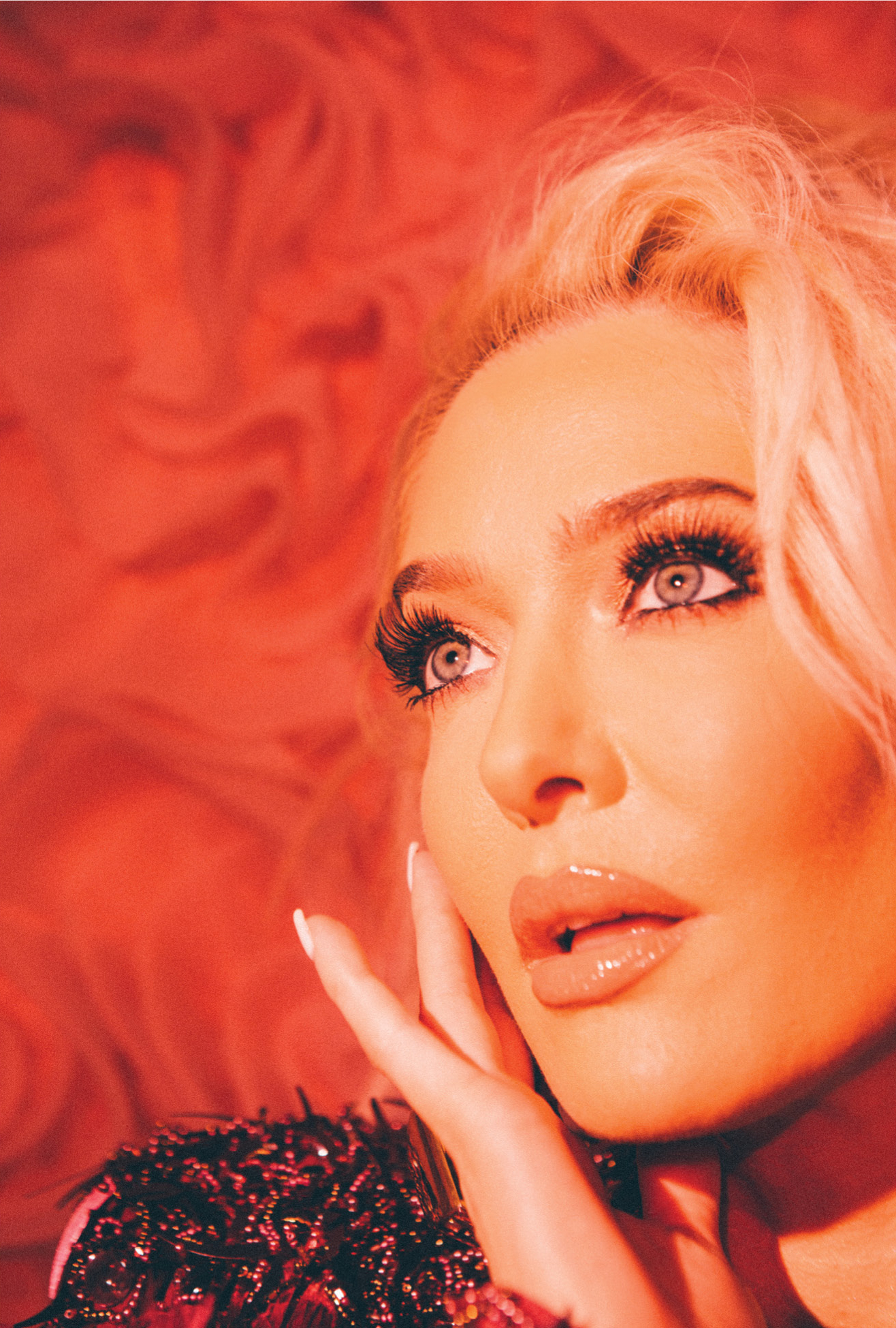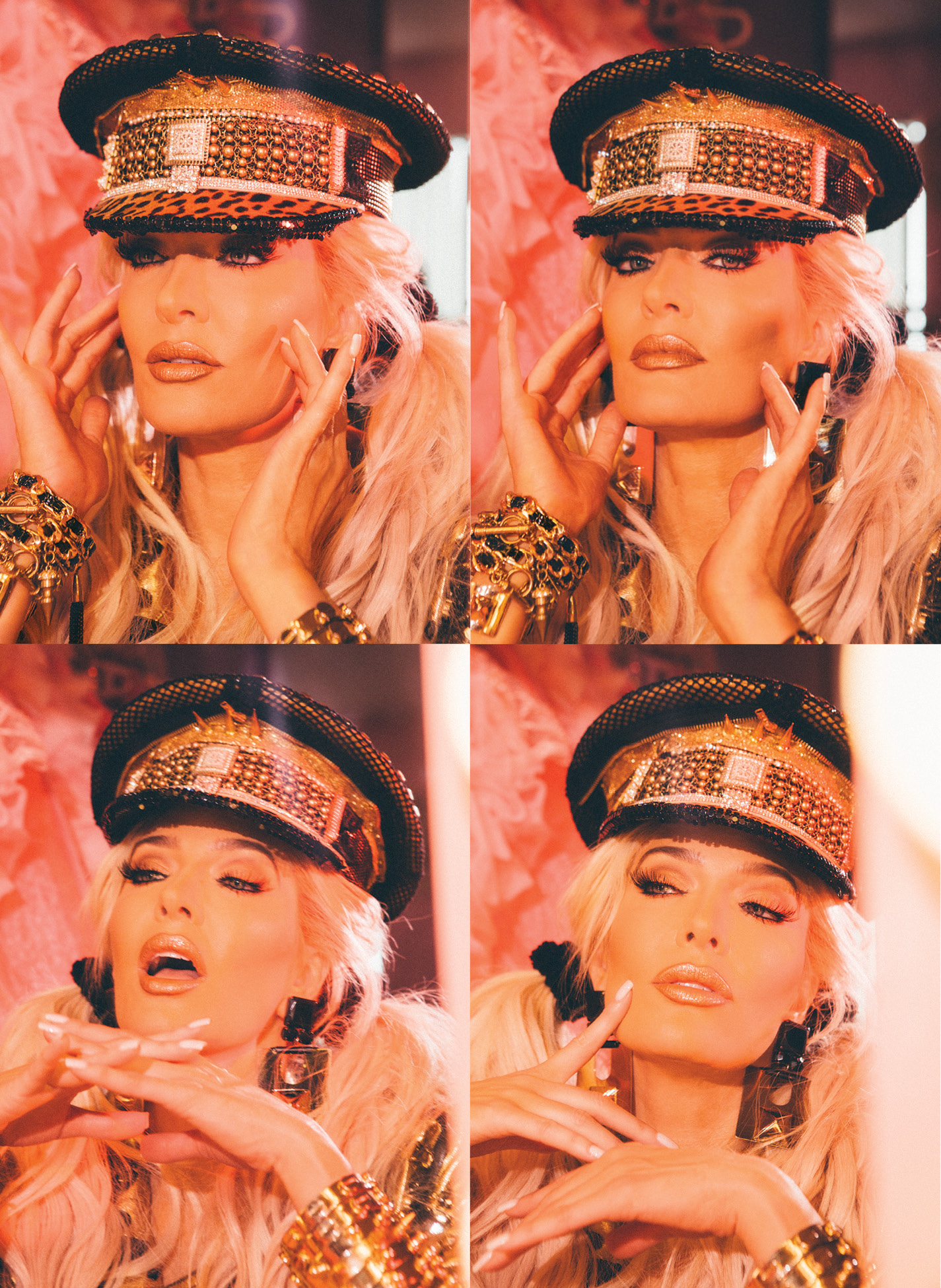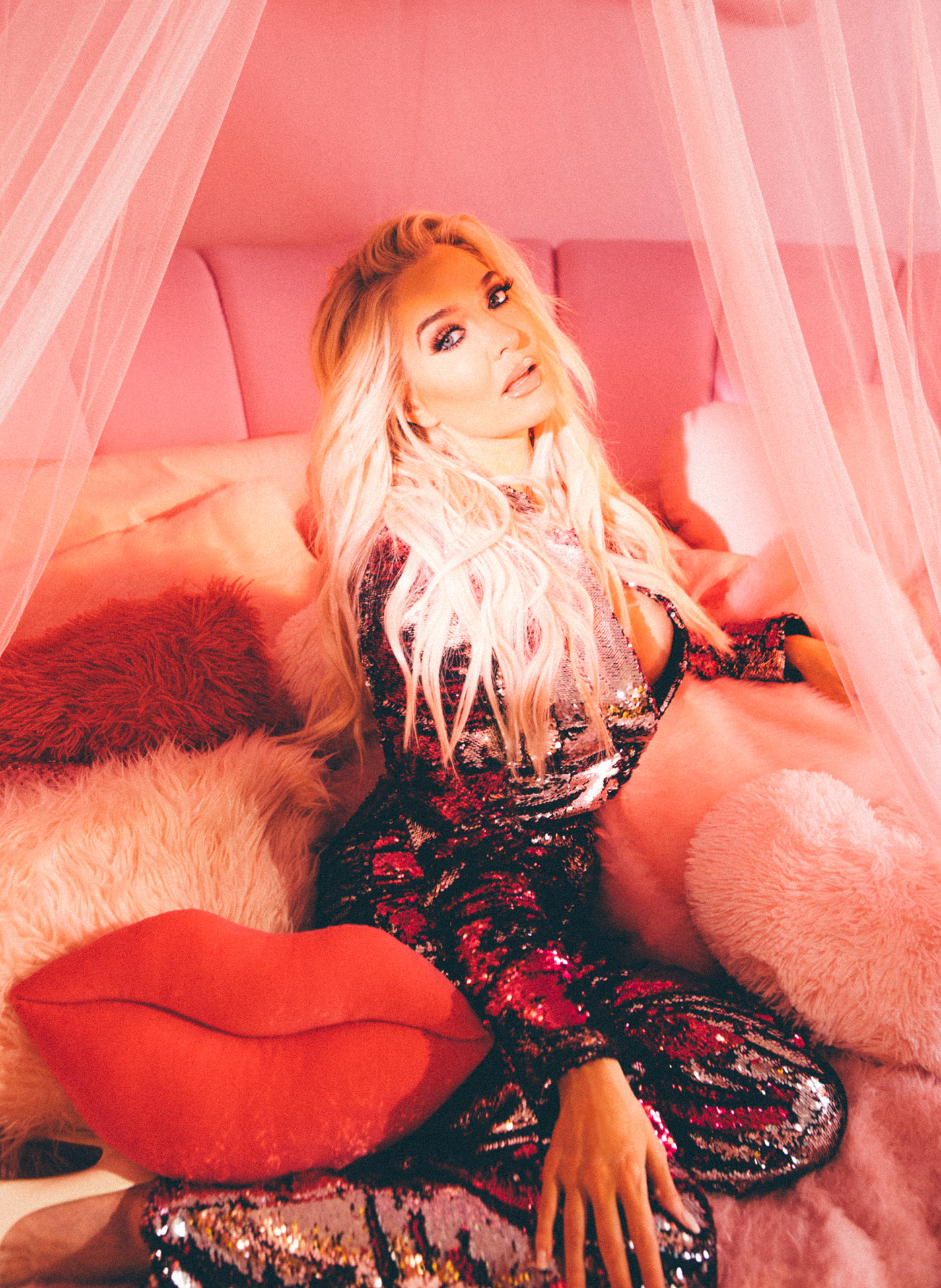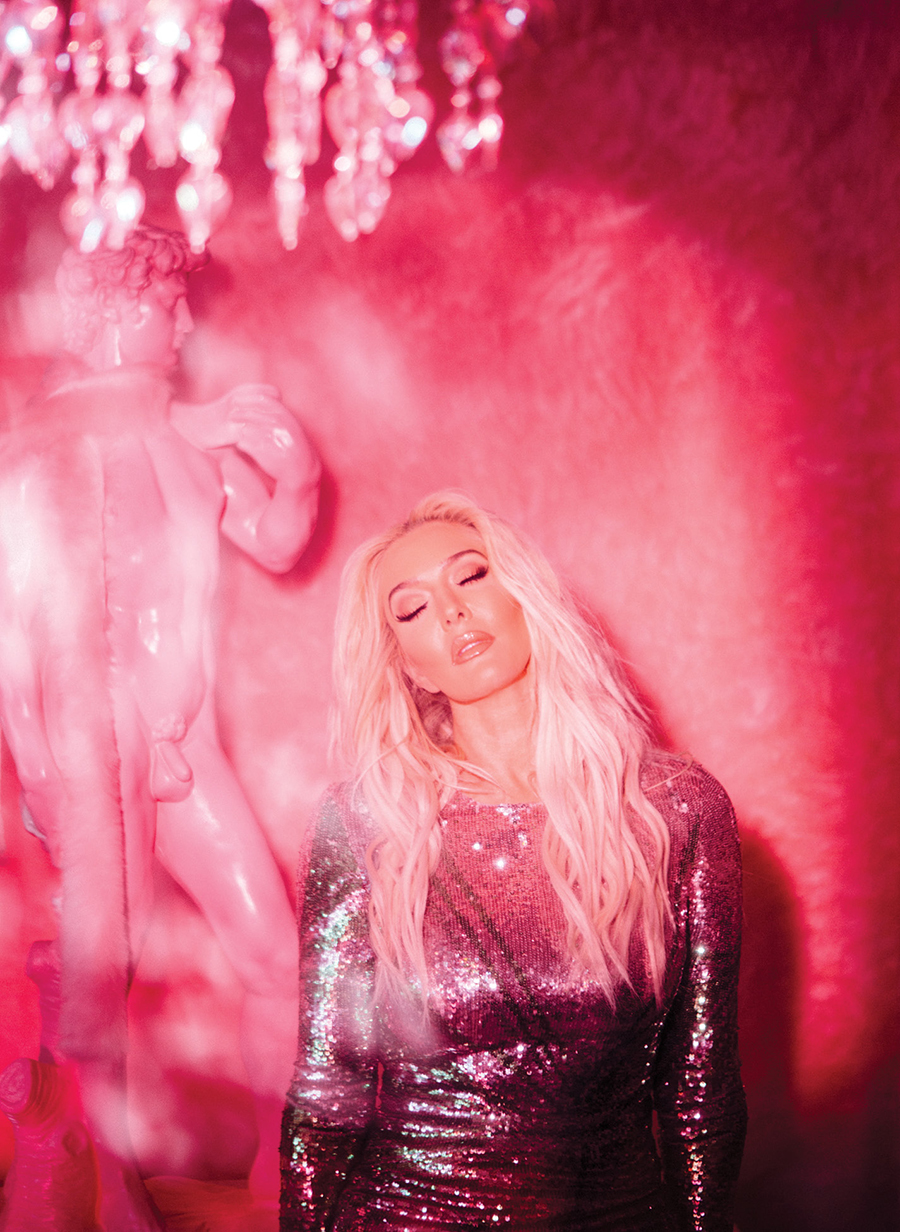WEB EXCLUSIVE – DESAMPA: NIGHTSKIN
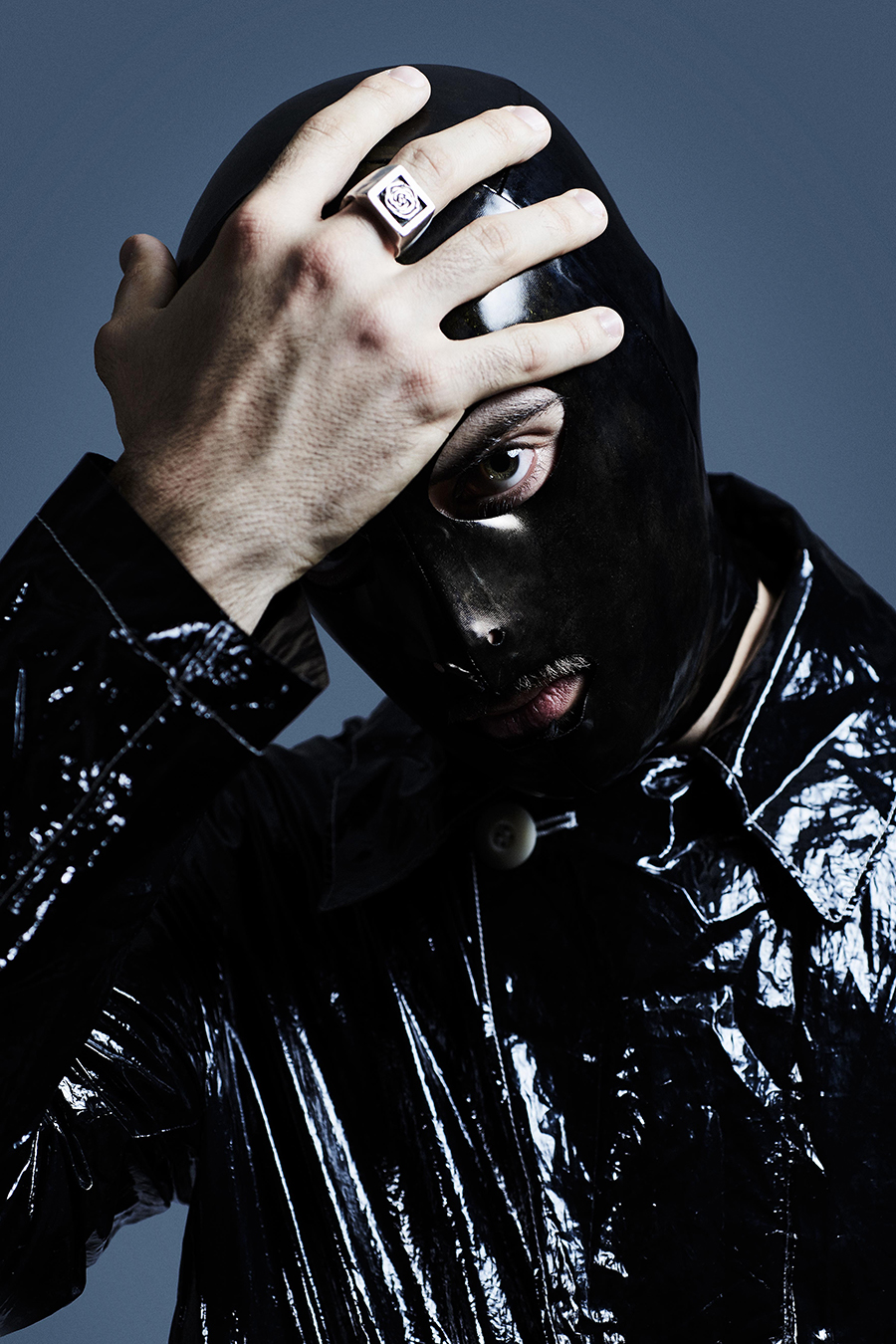
Undercover Double Breasted Raincoat, DESAMPA’S Mask
Photography: Hans Eric Olson | Stylist: Michael Louis Umesiobi | Talent: DESAMPA
Interview: Sarah Conboy | Creative Direction/Production/Grooming using EVO Hair Products and Lab Series for Men by: Mike Fernandez
DESAMPA isn’t an artist that’s afraid to get controversial. In fact, his work seems to beg for controversy. In our conversation with the Brazilian-native, the number of taboo subjects we touch on is numerous. But it’s not just with us: these subjects come through in all his work as a musician, whether lyrically or in his various music videos and art projects. From sexuality to immigration to the constraints of the music industry, nothing is off-limits. Rather than shy away from it, DESAMPA talks about these things with a refreshing honesty and passion, finding inspiration in these taboo realms.
Self-described as an artist for a “dystopian future filled with hope,” DESAMPA tackles the issues most personal to himself, and in the end, produces a product that everyone can somehow relate to. It’s his emotional depth and harrowing voice that draws the listener in, and his smart aesthetic that keeps them guessing and interested. DESAMPA is an enigmatic figure, always disguised by elaborate masks; an intriguing, partially-hidden identity. But despite this, DESAMPA wears his heart on his sleeve—speaking to the love and loss, trials and tribulations that all humans experience.
Here DESAMPA talks to Iris Covet Book about being an immigrant in Trump’s America, gathering inspiration from fetish play, and why he wants to be this generation’s Björk.
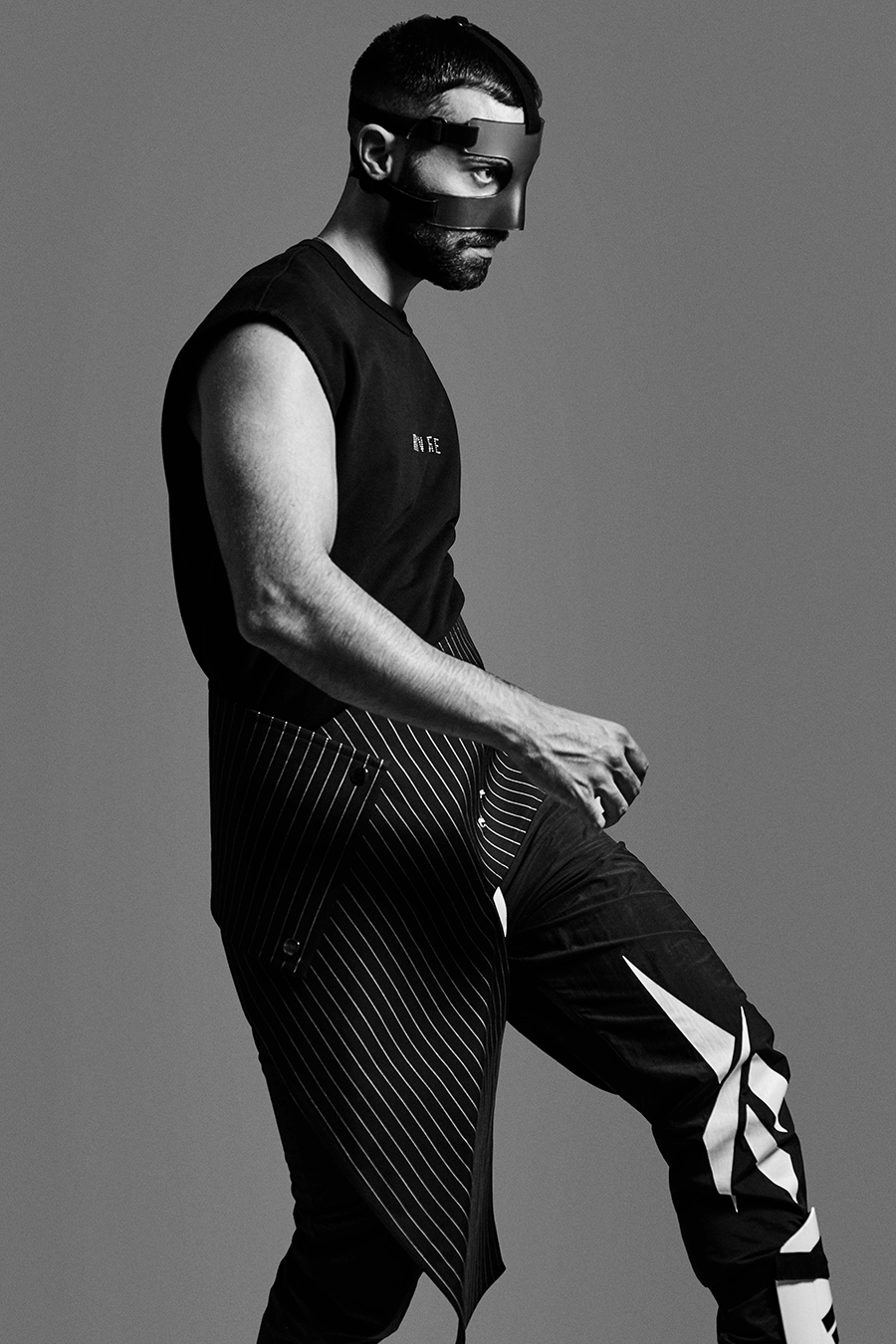
KYE “Rave Me” sleeveless tea, LUAR Origami belt, Reebok by Pyer Moss Vector Track Pants, Adidas shin guards, Nike Air VaporMax Flyknit 2, Mask by DESAMPA
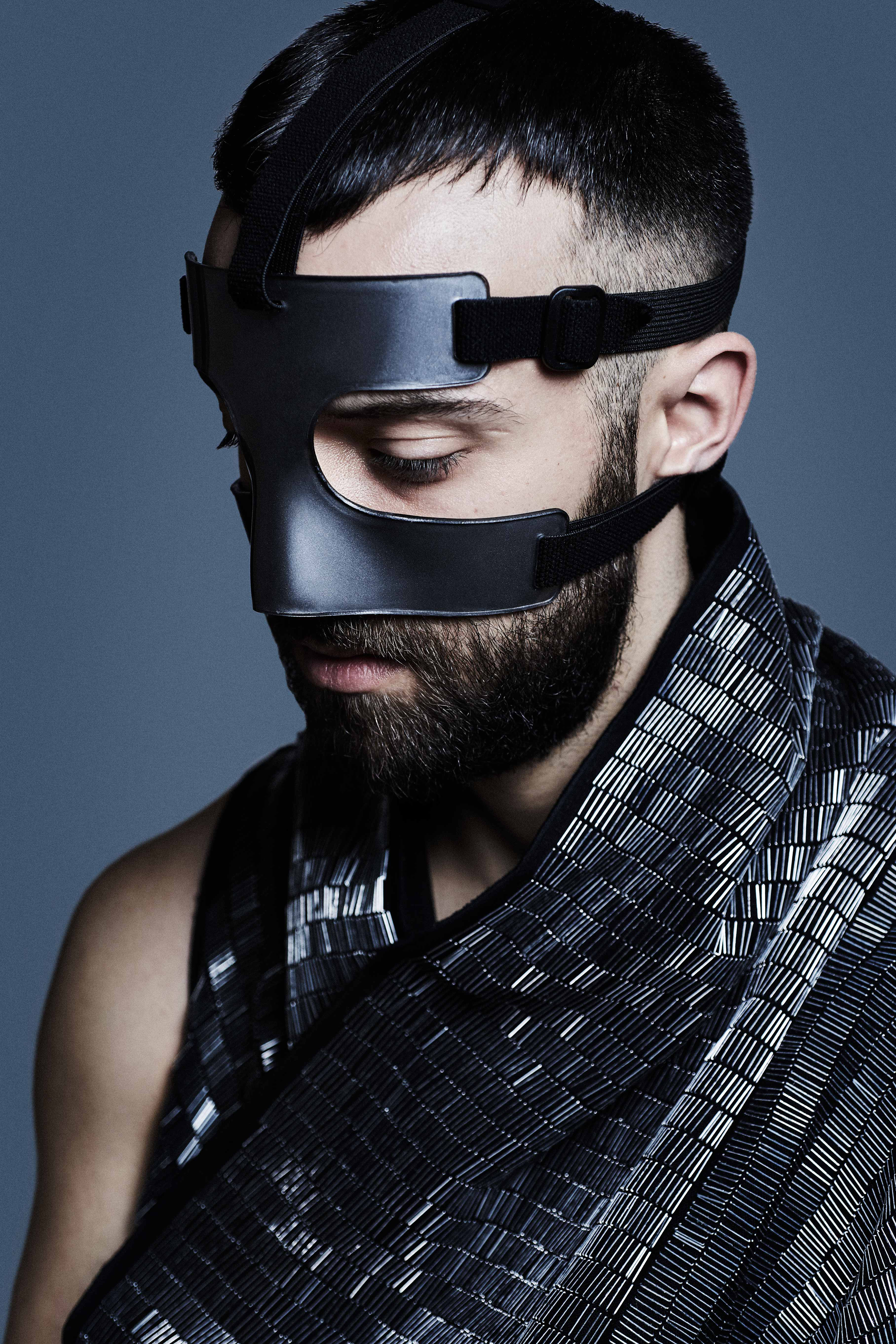
Grapa Wrap Vest – Sigilo, Mask by DESAMPA
To start, can you share your background?
I’m Brazilian. Born in São Paulo, 1991. I moved to New York two and a half years ago. I decided to move here right after a residency program. I don’t know if you’re familiar with the Red Bull Music Academy. It’s this amazing residency program that they do every two years in a different city, and they bring out 60 musicians from around the world. It’s really competitive, and I was selected in 2015 to go to Paris. So that really changed everything for me, musically. I got more contacts and networking and I was like, “It’s finally time to move to New York.” Because it’s been my dream since I was a teenager, due to my influences in architecture and artists, musicians, films. After Paris in 2016, I was like, “Okay, I’m leaving São Paulo. There’s no scene here for me.” I was trying to create one, and it didn’t pick up. So I just moved [to New York].
How did you get into music? Is it something you always have wanted to do from an early age? Did you take music lessons, et cetera?
Yeah, I started taking piano lessons when I was seven. I was also classically trained at one point. I had the option to pursue classical music, but I was too confined. I thought, “I don’t see myself in this. Maybe I don’t want to be perfect; I just want to be honest,” and that’s when I left classical music to the side. Not that you can’t be honest with classical music, but it’s just that what I was doing, my compositions…they weren’t looked at as good, from the classical perspective. I’m like, “Well, they’re good for me and they’re honest, so I’m just gonna do my own thing.” That’s when I started using the computer to produce music, instead of the piano. I started making beats and electronic music. So I jumped towards that part, and also tried to incorporate the classical music aspect into my compositions. But yeah, it was always music. I don’t know how to do anything else; I suck at everything else. So it’s just music. I don’t even know if I’m good at it—it’s just the only thing that I know how to do.
Your music seems to defy categorization—how would you describe it yourself?
I just usually say it’s “futuristic soul” music. Because when I say I’m an electronic musician, people go listen to my music and they’re like, “Yeah, this is not electronic music.” I’m like, “Okay, so…soul?” and then they’re like, “Yeah, this is not soul.” So I’m like, “Okay. Futuristic soul.” Meet in-between. I tend to use soul music on top of the electronic beats, so I would say “futuristic soul.” It sounds cheesy…
Where do you draw inspiration from?
I usually tend to just look to the future, you know? Try to create the sound of what people are going to be listening to in the future. Like what Björk was doing 10 years ago—people are doing it now. I kind of drink from her fountain. I want to do something that people will be doing 10 years from now. So Björk is a really big influence for me, artistically. Sonically also, but artistically. [She has] a consistent career, and that’s what I want to have. It’s not based on hype, it’s just based on consistently good work and good music. That’s what I’m about.
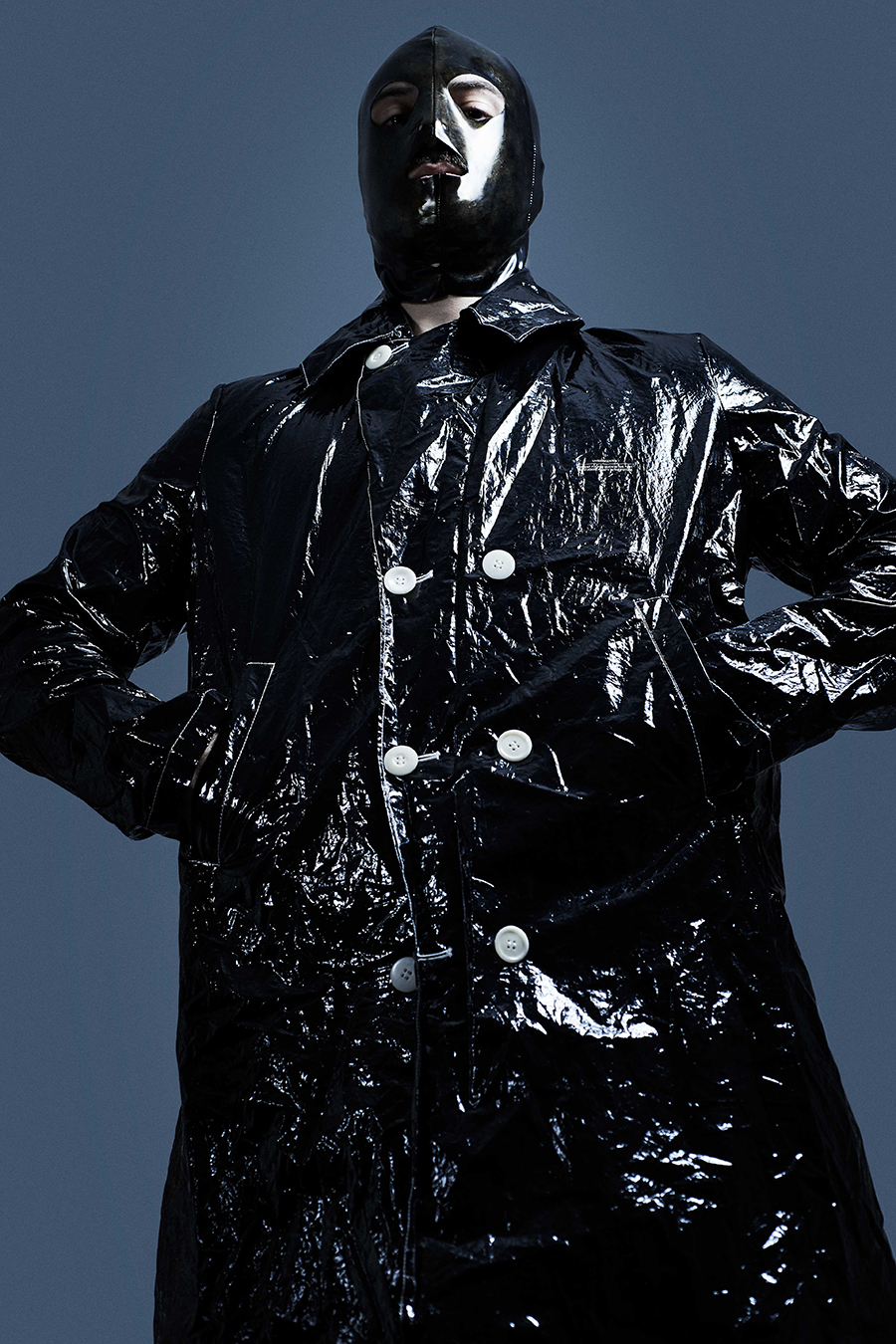
Undercover Double Breasted Raincoat, DESAMPA’S Mask
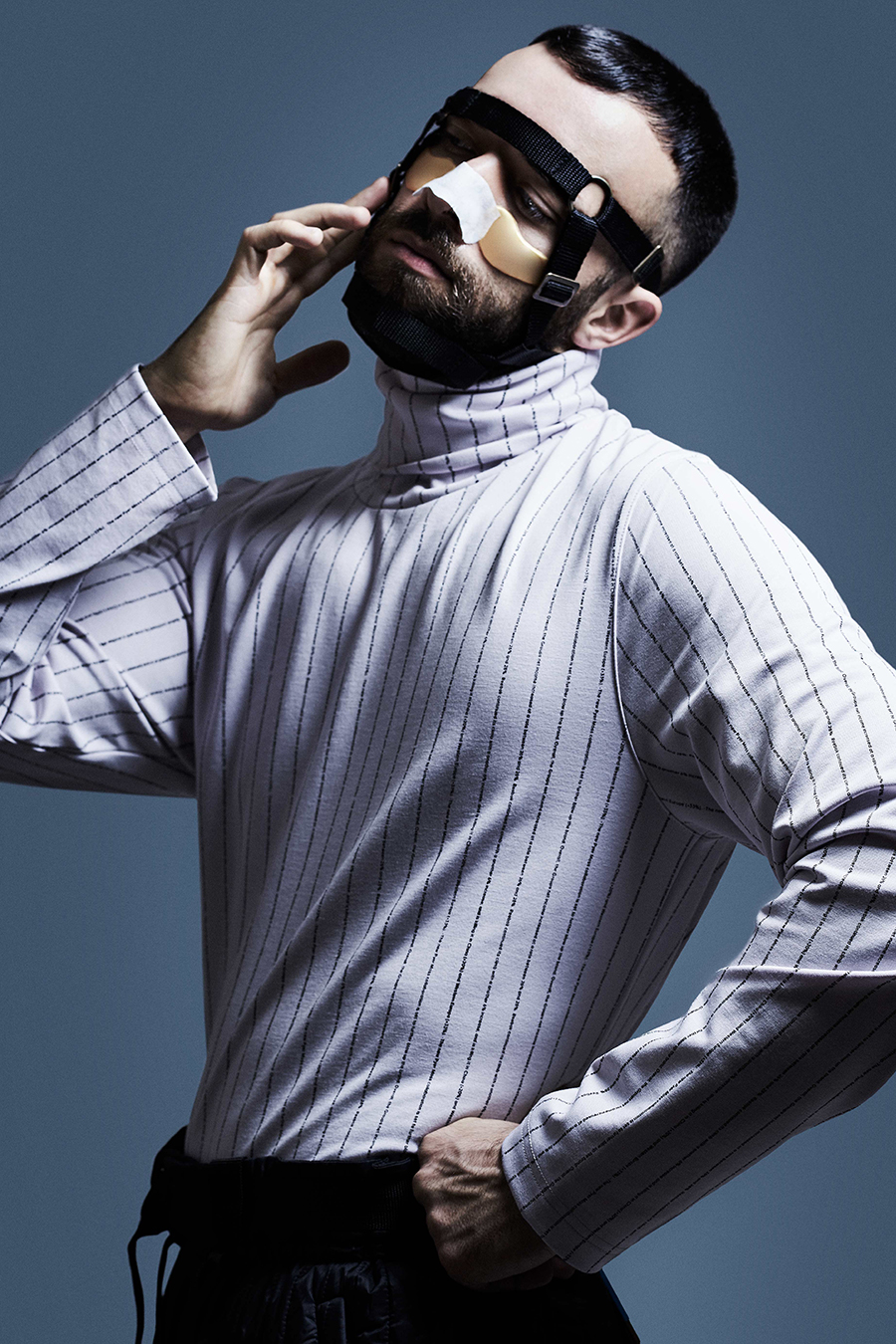
Reebok x Pyer Moss Printed Turtleneck, Craig Green X Bjorn Borg Padded Trousers, Face Harness by Stian Louw
What about Brazilian heritage—how has it influenced your work? Specifically, how did growing up in São Paulo influence your work?
We have a lot of national holidays, [and] they have specific music for them. Like we have specific music for Carnival. They’re kind of like jingles, you would say, but they’re not promoting any product. They seem like a jingle; a small track. It’s like Samba and Bossa Nova. So yeah, I grew up every year being inserted in this scenario, of Brazilian holidays and Brazilian holiday music. That led me to Bossa Nova. Dug deeper, and found the voice of Elis Regina. She was like the biggest singer in Brazil in the ’60s. I got obsessed with her voice. I’m like, “How come we don’t talk about her? How is she not being talked about everyday?” Because what she did was so…nobody was doing that back then, in Brazil. She really inspired me. I said, “I want to do something that nobody’s doing here in São Paulo.” I grew up Brazilian, and [I’m influenced by Brazil], not even [just] with music, but art and food and architecture as well…we wear our emotions on our skin, so I tend to do that with my music. It’s very raw. I don’t know if you’ve been to or read anything about São Paulo, but it’s such a raw city. It’s violent and beautiful and concrete and ugly. It’s everything at the same time. Graffiti tags everywhere. I’m tending to bring more of that aggression from São Paulo into my own music. I think that’s really important. Because in New York, compared to Brazil, everything’s safe and well-kept. It’s polished; [the United States] is a polished country. Brazil is definitely not a polished country. It’s how it comes…dirty and clean…contradictions all around. That really inspires me, and the architecture there inspires me. We have this…he’s the national treasure: his name is Oscar Niemeyer. He’s brilliant. He did some buildings that are oval and very round, curvy buildings. He really inspires my music as well.
So, you describe yourself as a multimedia artist—what does this mean to you?
I use that term just so I’m not stuck inside one box, you know? When I try in the future to do something [like] I don’t know, maybe fashion, I want people to take me seriously. Or anything else. Architecture. If I want to design a building, I have to study for that. But eventually, if I’m interested in that, and I accomplish that, I don’t want people to be like, “Ugh. That singer designed this building.” But at the same time, right now, I’m experimenting with different materials to create masks and molds of my face. I’m really obsessed with face masks and heads and torsos. So I’m experimenting with that…and currently I’m doing some faces with ice; I’m studying ice and how it sticks to the face. I did a mold, and I’m trying to create a lot of replicas of my face and eyes. Also, I do a lot of videos. I have so many videos that I shot in Brazil this past year, that haven’t been released yet. I direct. I’m not doing all these things by myself, by any means. I have always had friends and other creative people helping me out with all this stuff. So I have plenty of videos that I directed and came up with the storyboard and the mood and everything. Also some videos don’t even have music. I’m itching myself to put music, because that’s what I know how to do. But at the same time, I’m like, “No, maybe this should be a silent film” or something. So I’m exercising that. I don’t need to put my music out everywhere; it can be silent as well sometimes.
You explore themes of sexuality and politics in your work, to name a few. Do you think it’s important as an artist to spread a larger or public message, or are these just personal to you?
Both. They’re really personal to me. In any of my tracks, I’m not talking about things that I haven’t experienced, or that I’m not close to. Everything that I’m talking about like immigration and sexuality and being dumped and loving unconditionally, all of that is close to me. I’m facing that right now. Immigration—what is [it like] being a Latino guy from Brazil in New York, in this country ruled by Trump? It’s something [in which] I have no option. I live it 24/7. Because in Brazil I’m “white,” and then I leave there and come here, and I’m “Latino.” But at the same time, in some Latino communities, Brazilians are not considered Latinos. Where do I belong even? If Brazilians are not considered Latinos, but they are considered Latinos to white people, and in Brazil I’m white…I fluctuate between things. So I’m trying to find the light in all that, in the difficulties. The track I am referring to has not been released yet, it’s going to be on my EP that I’m hopefully releasing by the end of this year. It’s just taking so long because of labels and life…
Speaking of labels—you’ve self-released music. What is your reasoning behind this? Do you think the music industry is restrictive in your artistic process in any way?
It is pretty restrictive. From what I’ve learned, labels are not signing albums anymore unless you’re a bigger artist. They don’t want to risk it. It’s a risk for them to sign a full album––nine tracks. It’s a lot of tracks to be mastered; it’s more promotion and more singles and videos and all that. There’s no money in the music industry anymore, so they’re signing smaller EPs, and if that works out, then maybe a second EP and if that works out, maybe an album. So nothing’s certain anymore in the industry. That passes onto the musicians, because they’re like, “Shit. Should I maybe just format my music for how people are consuming music nowadays?” Because people just listen to singles and [watch] music videos. People just want to see visuals with music, and singles. So that affects me, because my biggest dream is to tell a story in an album, in a 10-track album. A lot of people are like, “Don’t do that. Because you’re gonna end up self-releasing it again, and nobody’s gonna hear it.” So I have to work around the walls of the music industry, that’s for sure. It’s kind of limiting, at some points. Even if I’m an independent musician. But I also want to have a career in music, so I need to think of those things when I’m finalizing my project. Whether it’s an EP, an album, a single—I gotta have in mind the way people are consuming music nowadays.
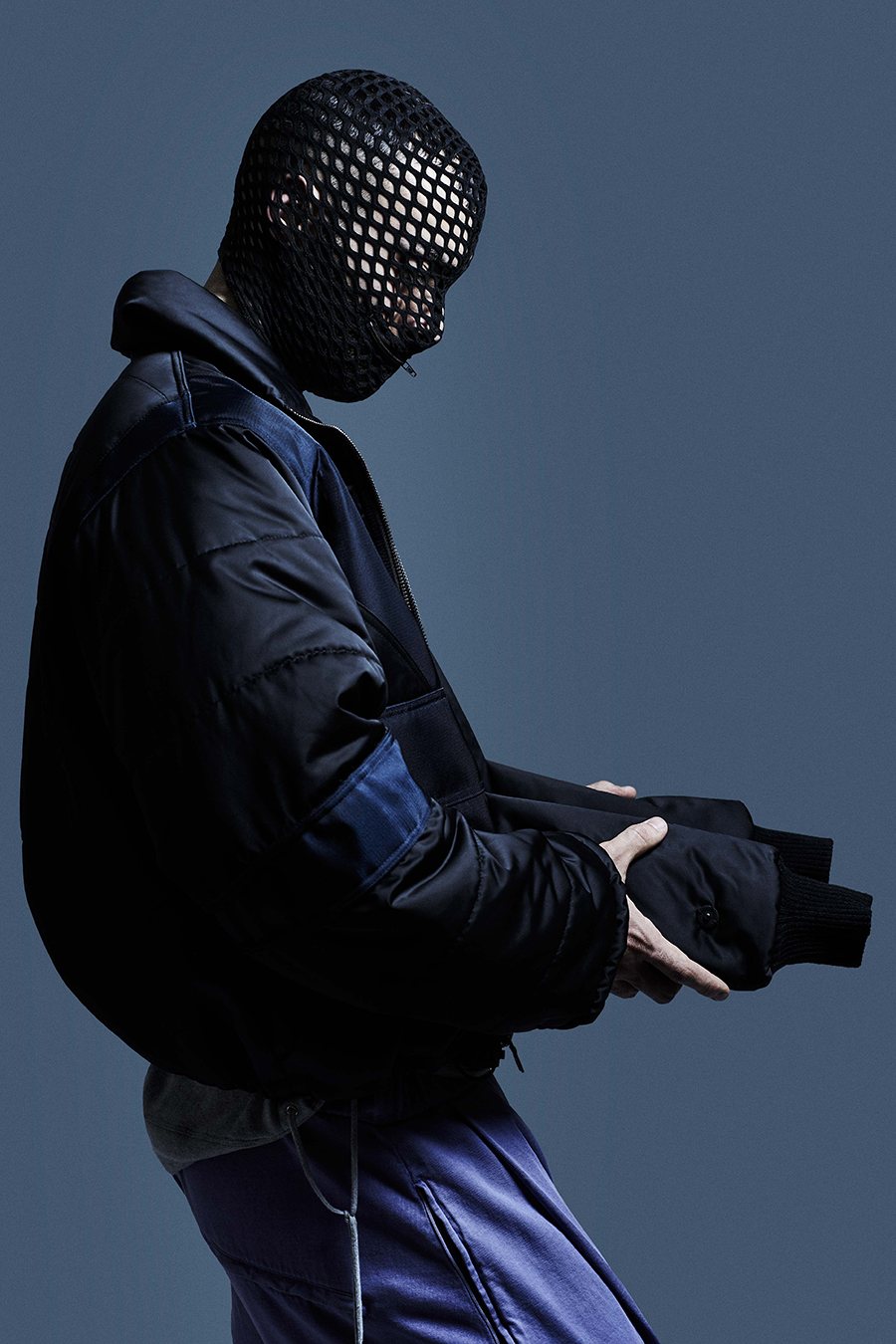
LUAR Brooklyn Jacket, Willy Chavarria track pant, Mask Slick It Up
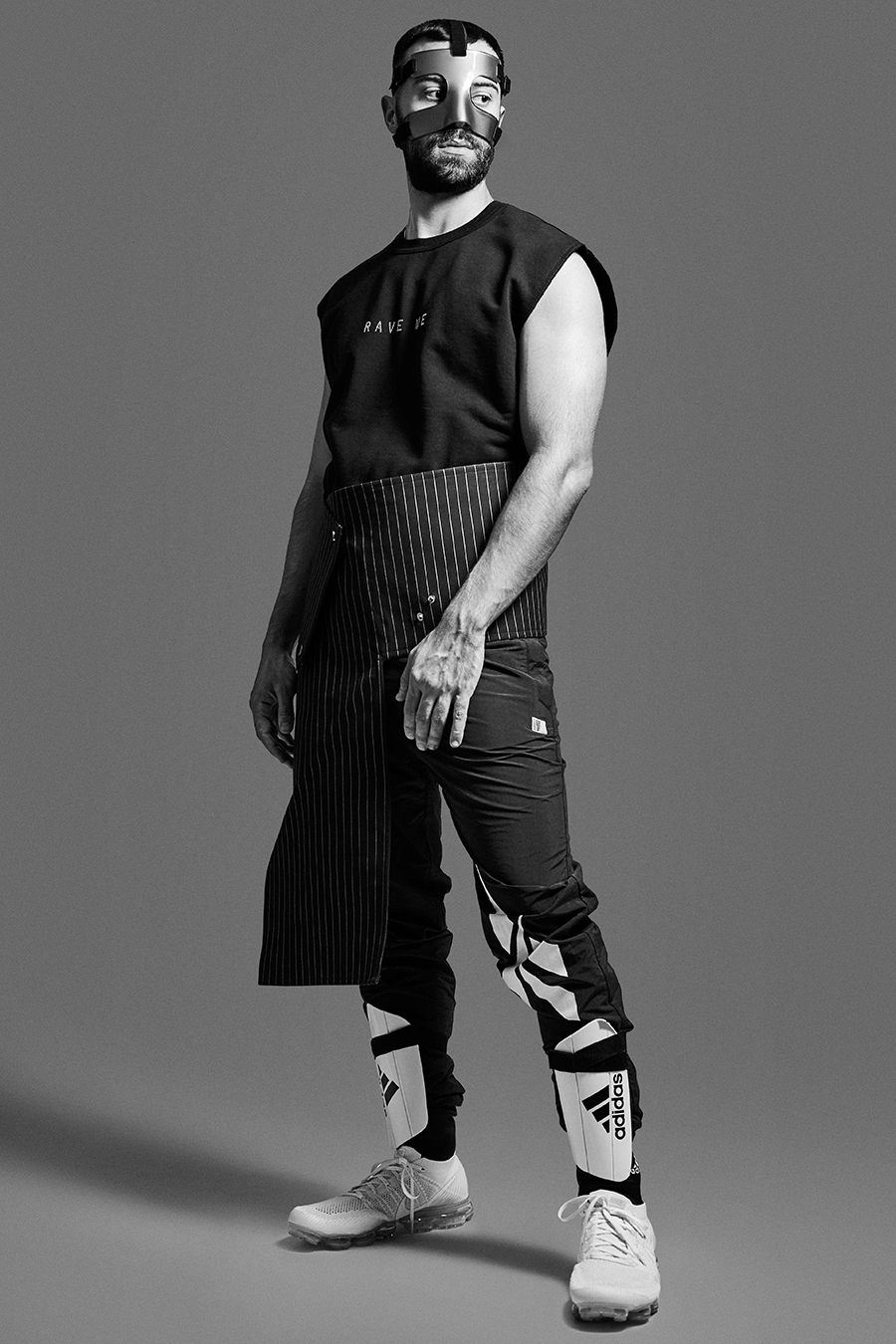
KYE “Rave Me” sleeveless tea, LUAR Origami belt, Reebok by Pyer Moss Vector Track Pants, Adidas shin guards, Nike Air VaporMax Flyknit 2, Mask by DESAMPA
You are working on a new album, correct? You posted on Facebook about losing most of your work for it. Can you tell me the story about losing your external hard drive?
I had 50% of my album done, or something…70%…I forget the percentage. But I had a large amount of my album. I started four years ago, and I had a lot of music that I was gonna put in it. Then I went to Brazil, and I just lost it. It was taken from me. I don’t know what happened. I put “Lost” signs on the streets and tried to find it at all costs and I learned my lesson. Because now I save all my projects in like seven different places, you know? I’m not losing this shit again. It broke my heart; it broke my trust in myself. Four years of work that I had done, and I’ll never find those tracks again. I don’t even know where to begin to make them again. I just don’t know. So I gave up on trying to find them, and I’m focusing on creating new material. That really forced me to make more stuff, and it’s more current. Because when I started writing it, I wasn’t an immigrant yet. So I had a different take. Now I have more to talk about, more life experience. More ugly, sad shit happened to me, and I have this anger to write about. So it helped in a sense. That EP came for me…I was like, “I don’t know if I’m gonna do an album again, so I’m just gonna start writing music and then I’ll figure it out.” I finish all my songs at Red Bull Studios in Chelsea, New York. They’re really great. I have an engineer there, and I have some people that are really interested in me and want to help. So they’re organizing, and giving me a bunch of dates on the schedule for me to finish this project. They were like, “I really think you should do an EP, because all these tracks that you have are really strong. They could be pushed into a successful EP.” So that’s what I’m doing right now. I’m finishing that. I’m not losing that for anything. Like I said, I saved it in seven different places. I plan on releasing it by the end of this year, with two videos as well. Both were shot in São Paulo.
Your new logo is being released in conjunction with your upcoming single “Still Here.” Can you explain the inspiration behind it?
Are you familiar with the website CAM4? It’s a website that people go to strip their clothes, but they get paid for it; they get tips. People are like, “I’ll pay you $25 and you take your clothes off ” You know? People testing out sex toys or fucking. It’s voyeuristic. It fascinates me, but it also scares me to think that relationships are turning virtual. It’s satisfying for them, just to watch another person around the world being naked or jerking off or fucking. That’s enough; they don’t want to meet people in person. It’s a combination of scary and fascinating. So my music video for “Still Here” is a play on that. It’s me in different rooms, with different fetish masks and fetish outfits. It doesn’t go directly with what I’m talking about in the song. It’s more of visual thing that I created and then decided to put the music, and bring the two of them together. In the song, “Still Here,” I’m talking about this Tinder date—the only one that I had. It was kind of successful, but then the person just vanished. In this short amount of time you give a lot of your secrets to this stranger, and the stranger just vanishes with all of your secrets. They’re expecting you to be hurt or something. I’m just saying that, “I’m still here.” Even though everything was taken from me, the fucked up things that happened, I’m still existing and still here. Also, at one point, it turns into me criticizing myself. Like, “How do I allow myself to continuously be in these shitty positions?”
You talked a little about this earlier—you often employ masks in your work. What’s the meaning behind them, and why are they so important to you?
So I never really liked showing my face, anywhere. This whole Kardashian era, [where] you have to put your face on everything all the time, doing everything possible—showering, brushing your teeth, eating, going down a slide, riding a bike—it’s too much. I’m not like that. My life is very private; I don’t share. So that mask is something that I can utilize to be creative, and create a new face for myself. That’s something I’m really interested in. At the same time, I can protect my identity. I was a kid that was obsessed with superheroes, so you can kind of see how that led into protecting my identity. That’s mainly it: I’m gonna hide my face everywhere. But also, my sci-fi obsession with different materials. Like plastic and silicone and fake robotic lenses. You know Alien, the movies? I really love that type of stuff. It’s something I can play with, “Oh, I’m gonna create this mask now. Oh, I’m gonna use this to illustrate my changed mood.” I can play with it, and it’s art that I’m producing. It’s art itself—my second face, second skin.
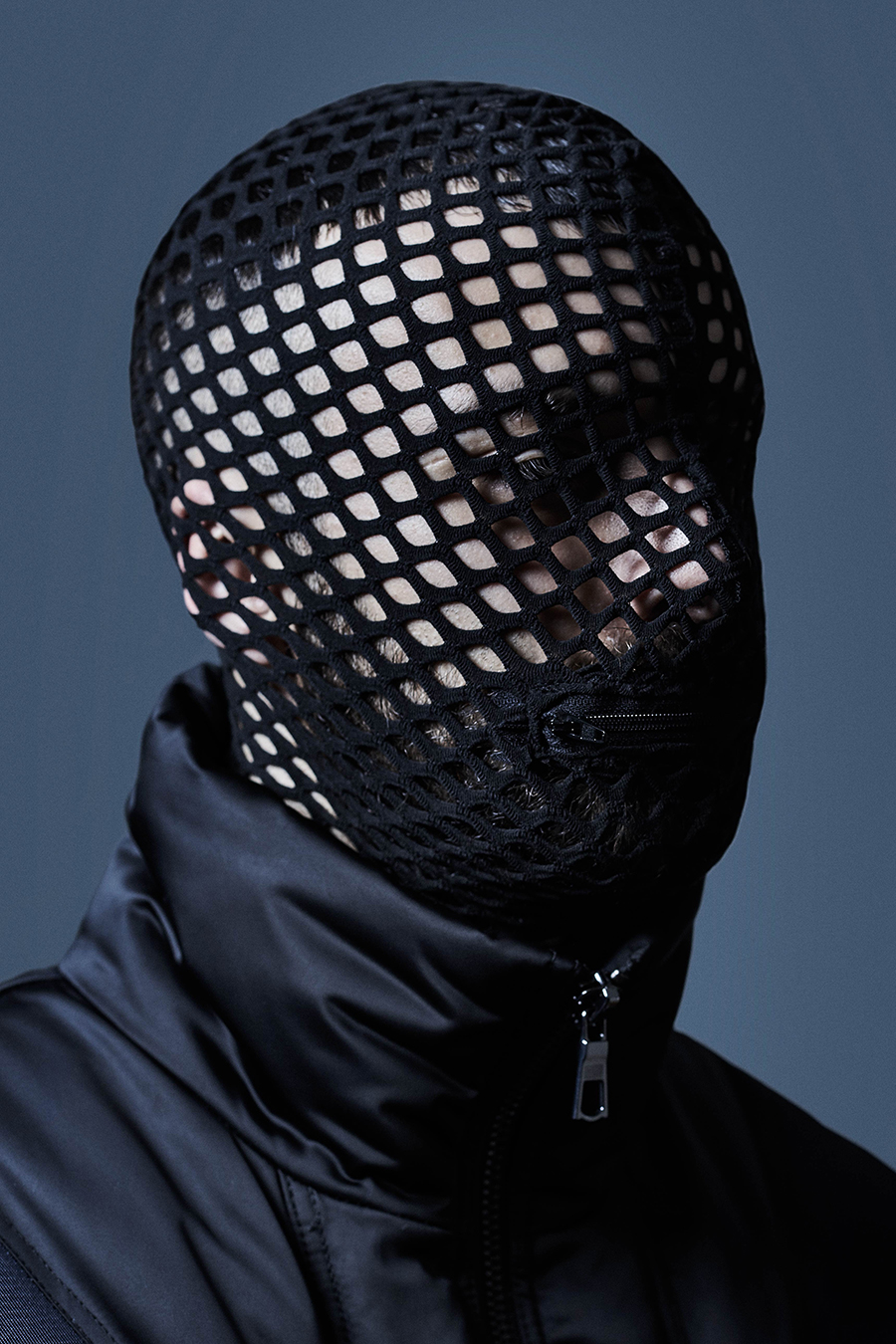
LUAR Brooklyn Jacket, Mask Slick It Up
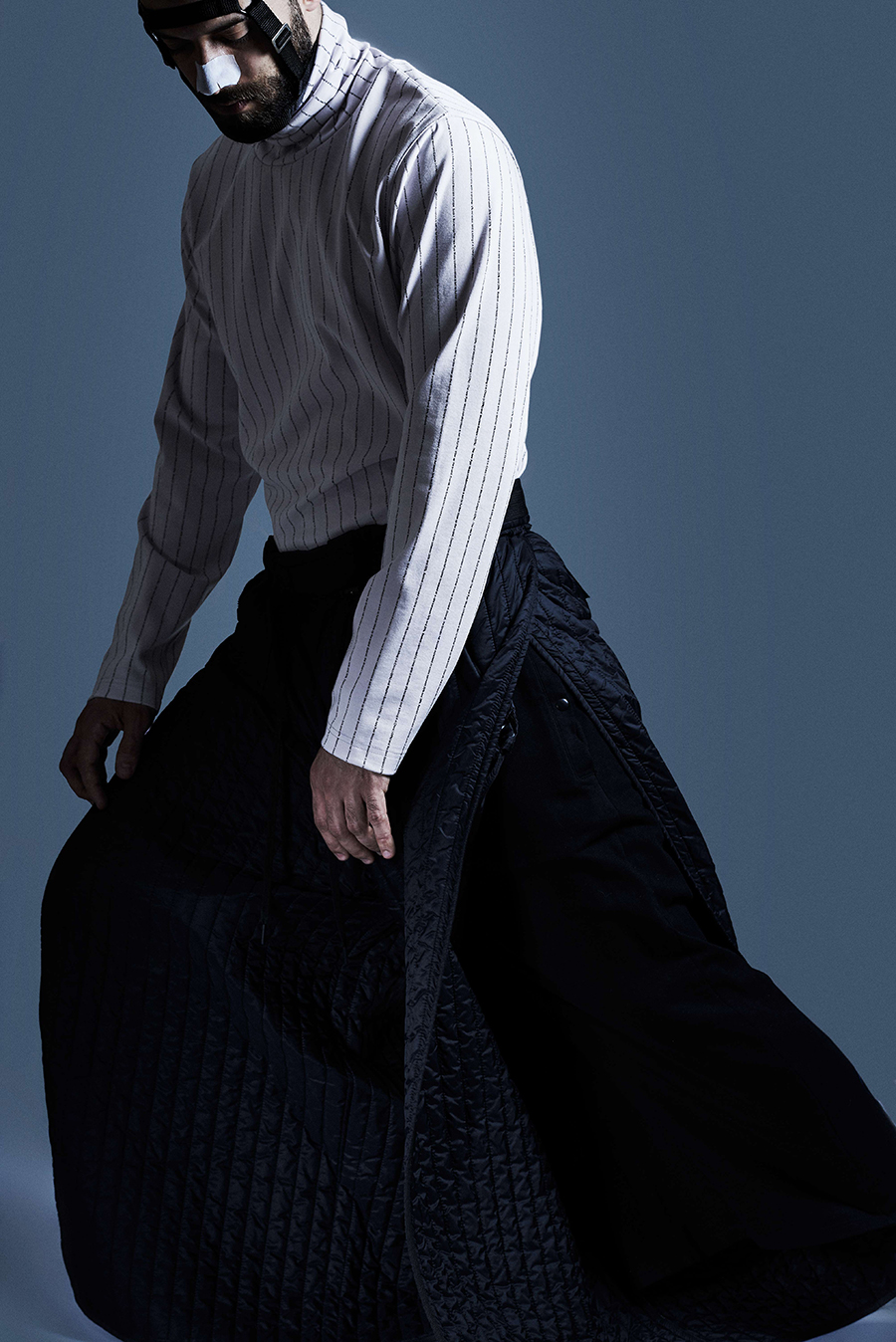
Reebok x Pyer Moss Printed Turtleneck, Craig Green X Bjorn Borg Padded Trousers, Face Harness by Stian Louw
Do you create all of them yourself?
For the most part. Back in the day, when I started, no. I had someone doing them for me. I designed them, but someone else actually made them. I didn’t even touch them before they were made. But nowadays, I’m doing it myself with my boyfriend. We do it together. We find the material; we trick them out; we paint over it and put the straps. Right now, my inspirations are really the fetish masks. I’m not a fetish-y person; I don’t have a lot of fetishes. But the imagery of BDSM, the aesthetic of it, is really interesting to me. They’re made from really beautiful materials and employ symmetry. Deprive you of air, deprive you of vision. It’s really interesting. I’m leaning towards that,studying and experimenting with those materials… plastic and leather and metal, but I always have people helping me out. I really don’t like doing art by myself. I think it’s a time to bring people together—different backgrounds, different visions. Because otherwise it’s just 2-D. I want 3-D, 4-D. I want more dimensions than just my own.
As an artist, what has been one of your career highlights so far?
I think definitely the highlight was the Red Bull Music Academy (RBMA) in 2015, in Paris. Because a lot of musicians that do what I do—electronic and the more contemporary musicians—it’s their dream to go to this thing. It helps you out a lot, and you get to meet people. I got to meet Laurie Anderson. Sheila E., Prince’s drummer. The amount of people that they put you in contact with in the lectures and the studio space and the other musicians that they select; it’s such a good exchange, and they don’t ask for anything back. I got to play an amazing show in Paris and expand my fanbase and spread my music through Europe. That’s definitely a highlight. Then after that, I played SXSW the following year. But the highlight was definitely RBMA.
Are there any other artists that you are loving right now? Ones who inspire your work, or you admire?
There’s so many. Let’s see. The first that comes to mind: I’m really obsessed with Smerz. They’re from Oslo, and it’s this really cool, experimental House. It’s like ABRA, but more experimental, and very European. I really like serpentwithfeet. I think he’s insanely talented. I’ve never seen anyone that can sing like him. Kind of nerve-wracking to hear someone that good. Oneohtrix Point Never definitely. He’s an amazing producer. He also works closely with Red Bull, which hits close to heart. His music is really, really boundary-breaking. He’s worked with ANOHNI; he’s worked with FKA Twigs, and a bunch of female artists that I’m really into right now. ANOHNI is a really amazing artist that I get inspired by. Björk, Kelela…I don’t know. Every time people ask me that question I don’t know what to do. They shift.
What can we expect from you in the future? You’re going to be releasing music at the end of the year, but what else? What is your ultimate goal as an artist?
In the future, you can expect my EP. In the nearest future. I’m just gonna talk about the nearest future, because if I go on with my future, I’m just gonna be here all day because I have so many plans. But nearest future, an EP and music videos. A bunch of visuals—shoots, and hopefully an installation that I’m working on, with face casting and molds. What else? More collaborations. This next EP that I’m releasing, I’m not gonna have collaborations with different musicians, in the sense of “Oh, I’m getting a singer to sing with me on this.” I’m having collaborations in production, but not on the forefront. So I want to do more of that, and keep producing more and more. I really want to write a soundtrack for something, either a dance piece or a movie. I really like soundtracking things. I always have a soundtrack for things in my head, and I really want to get this out, and put it into a movie or dance piece or something.
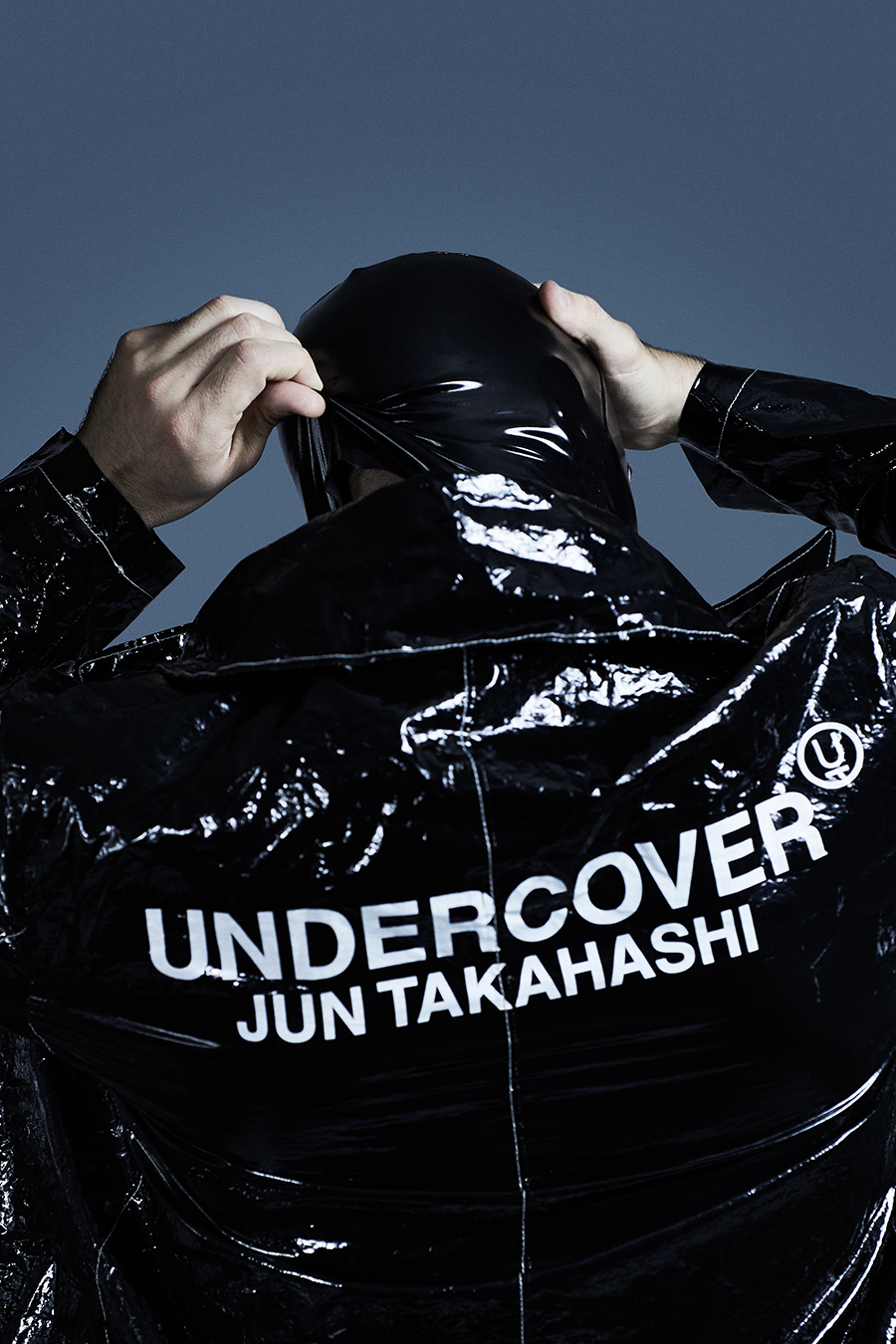
Undercover Double Breasted Raincoat, DESAMPA’S Mask
Listen here:
Support Your Local Immigrants – DESAMPA
Ventre– DESAMPA
Red Bull Radio Alumni Mix– DESAMPA
Photo Retoucher: Amanda Sperry
